#hanfu references
Explore tagged Tumblr posts
Text
Some Hanfu pose references ..!
by yours truly,,, these photos honestly made me feel magical (& maybe worthy of being an inspiration) <33
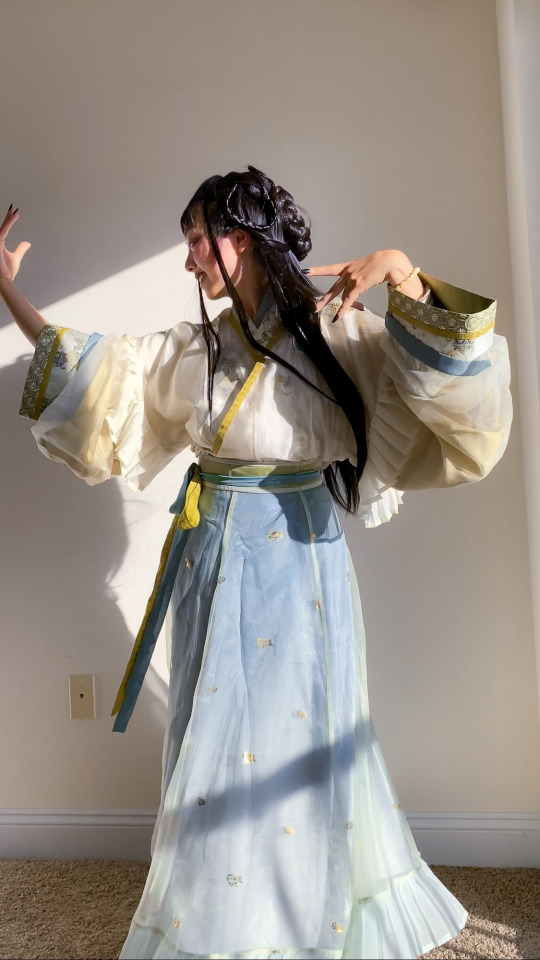
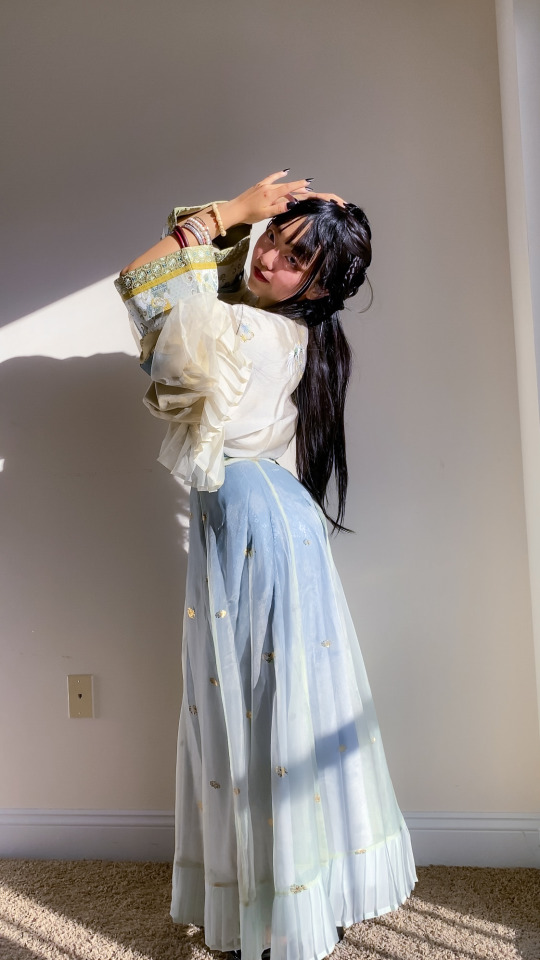
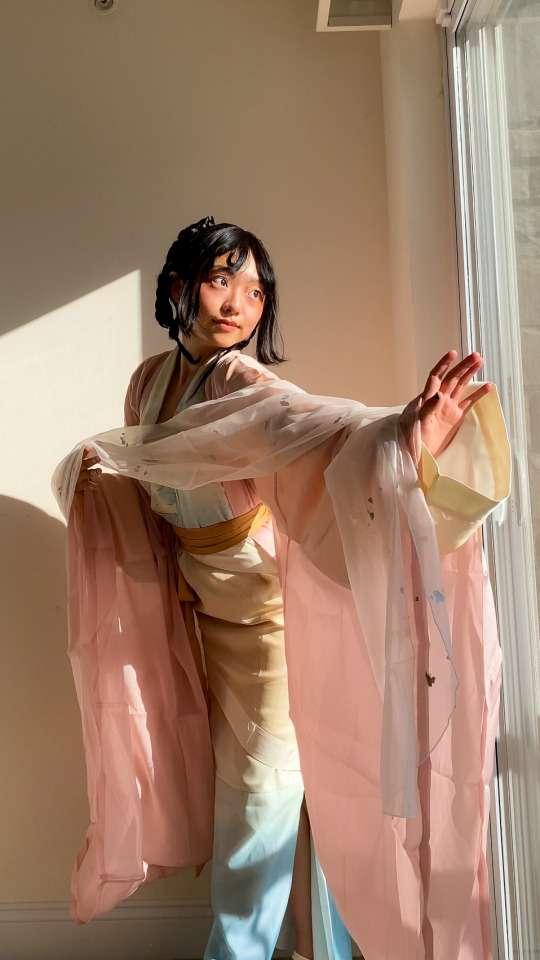
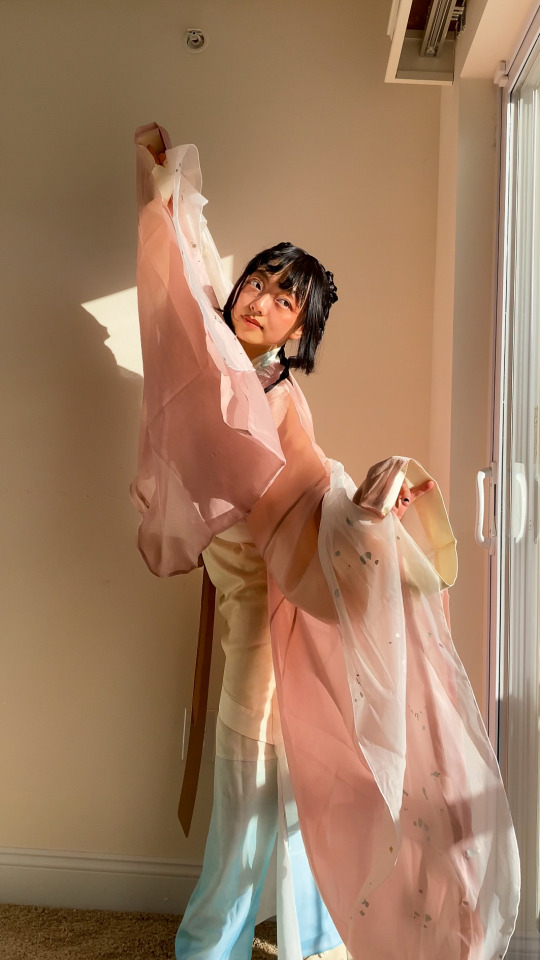
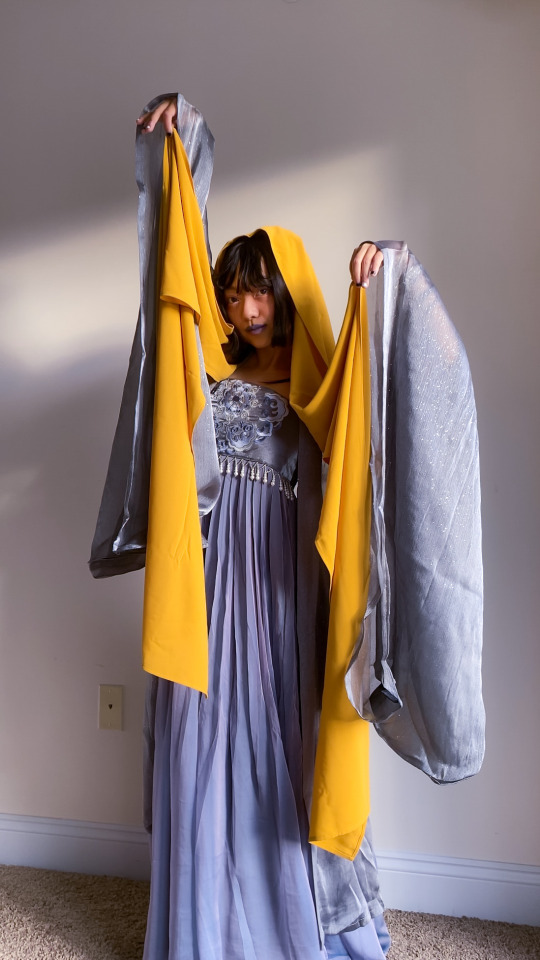
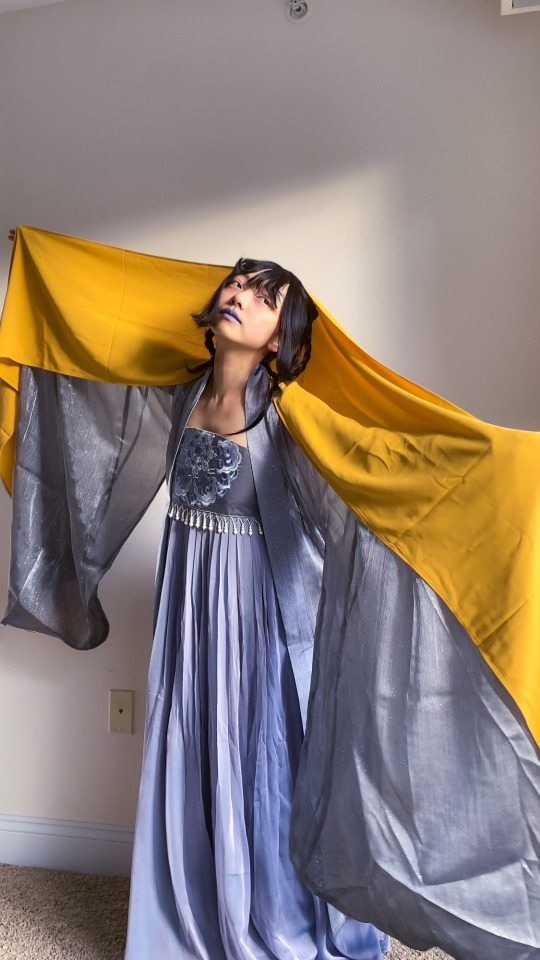
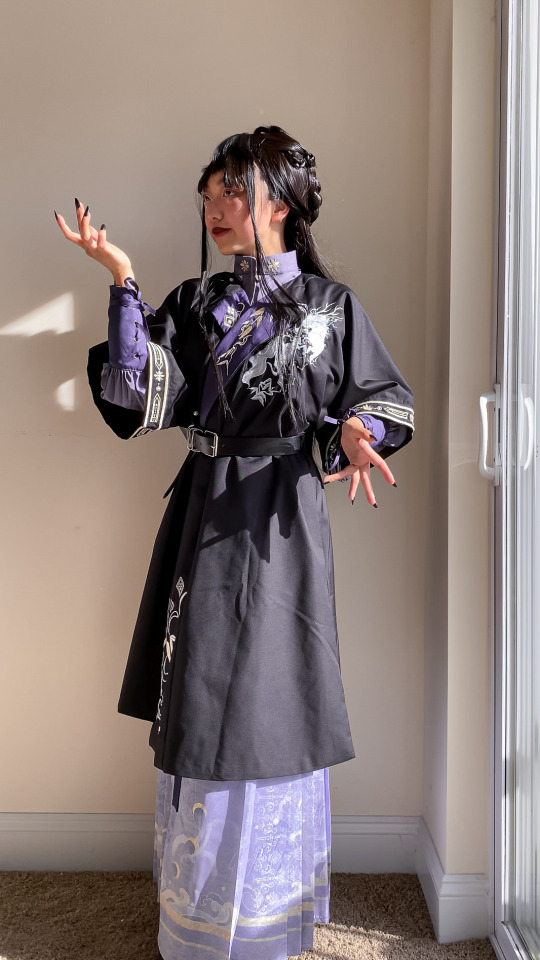
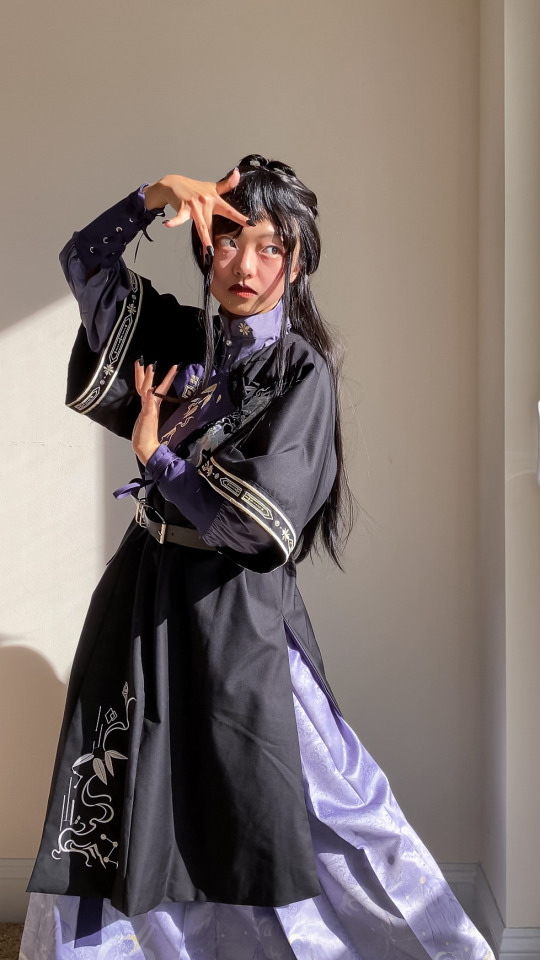
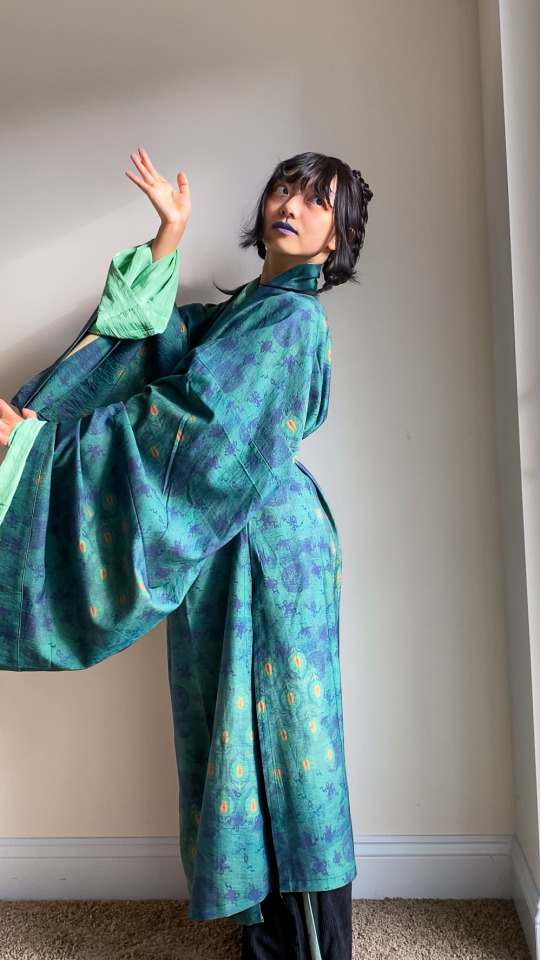
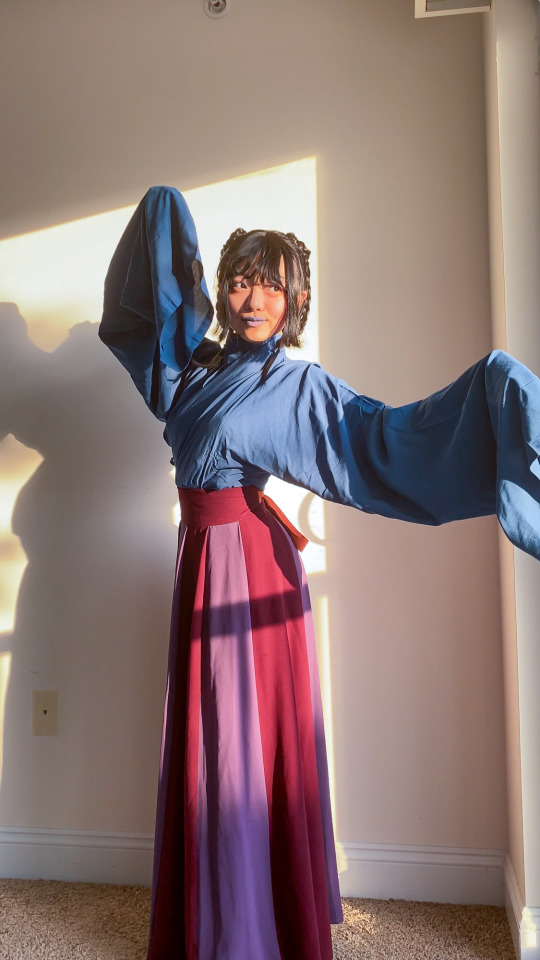
#chinese hanfu#hanfu fashion#汉服#hanfu#hanfu references#art reference#yovo does a face#your hanfu girl <3#traditional dress#chinese culture
218 notes
·
View notes
Note
If the coats with hoods aren’t historically accurate, what coats did Chinese people wear prior to the modern period?
Hi! Thanks for the question, and sorry for taking ages to reply!
By "coats with hoods", I assume you're referring to the doupeng/斗篷 (cloak/cape) commonly seen in modern hanfu and guzhuang (drama costumes), like the one below (x):
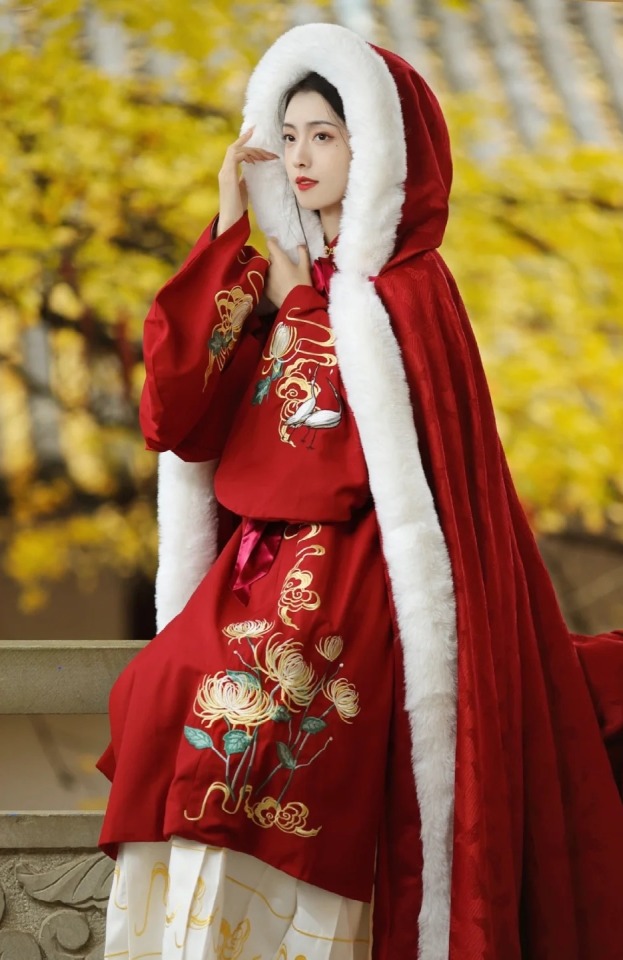
Chinese people did wear doupeng prior to the modern period, along with other kinds of coats. However, as I mentioned in my post here, historical Chinese doupeng did not have hoods attached to the cloak/cape. That is why many modern doupeng aren't considered historically accurate - because they have hoods attached. Below are examples of more historically accurate, hoodless doupeng (1/2):
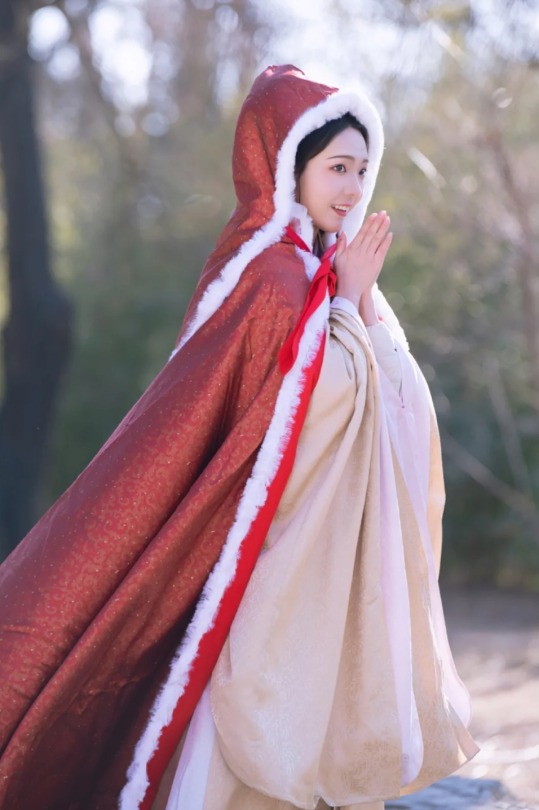
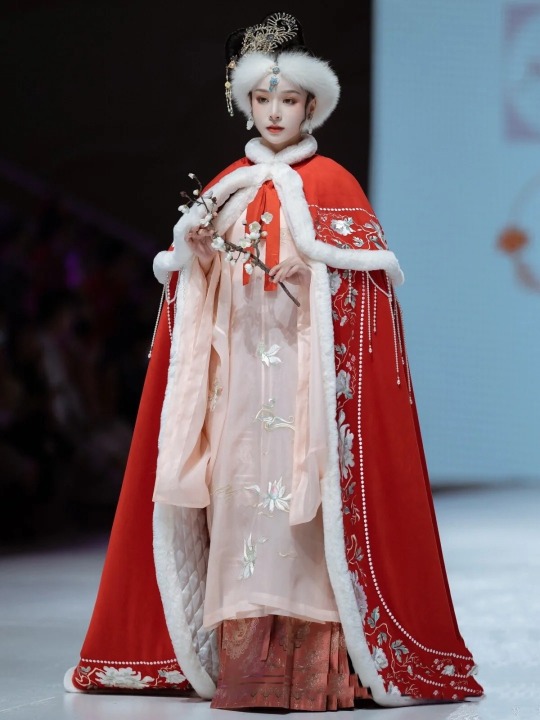
In the image on the above left, the model is wearing a separate, detached hood/hat called fengmao/风帽 (wind hat) which was historically worn to keep warm. Below - examples of fengmao (1/2):
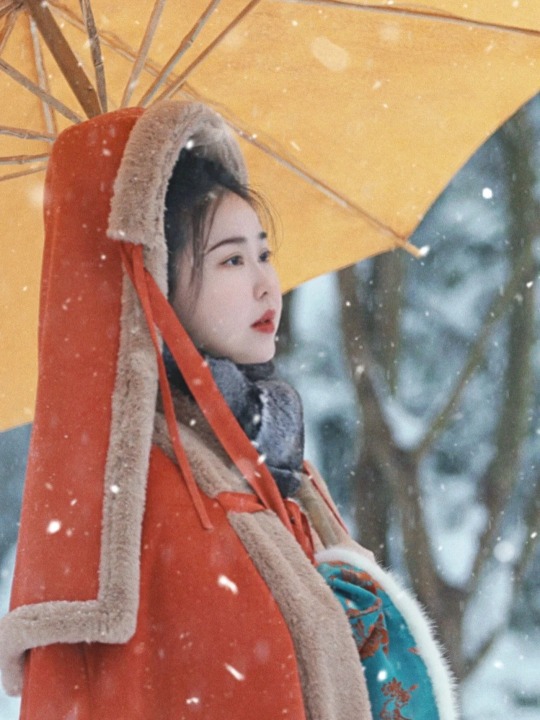
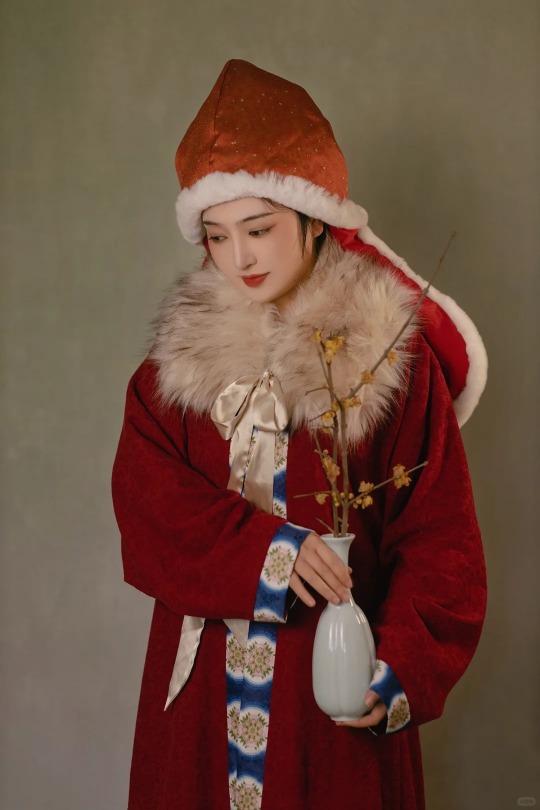
Historically, fengmao was often worn with doupeng when travelling during cold weather (x). Below - women wearing doupeng & fengmao in historical art (top row), and Chinese opera performers wearing doupeng & fengmao as part of their costumes (bottom row) (x):
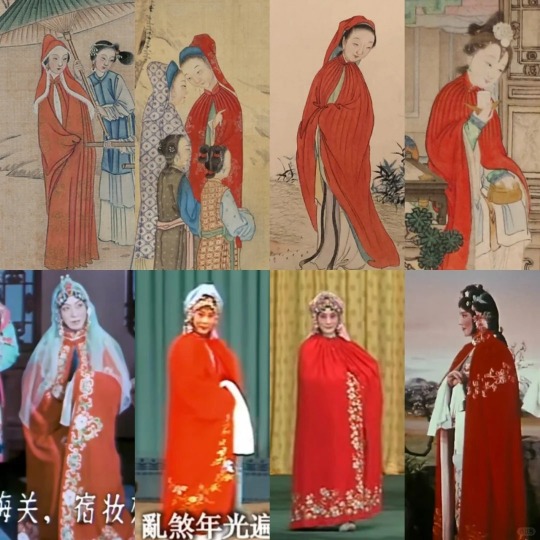
Oftentimes the doupeng & fengmao are matching, which can give the impression that they are attached - but if you look carefully, you can see that they are separate. Below - Chinese opera costume (x):
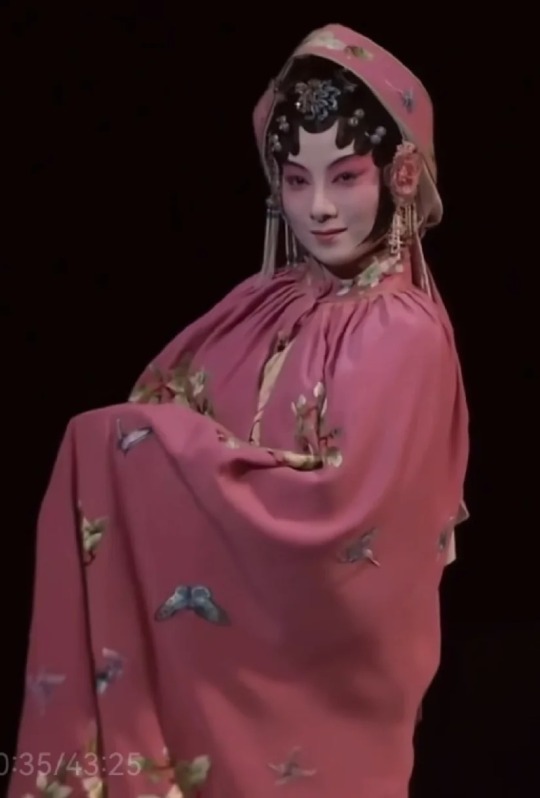
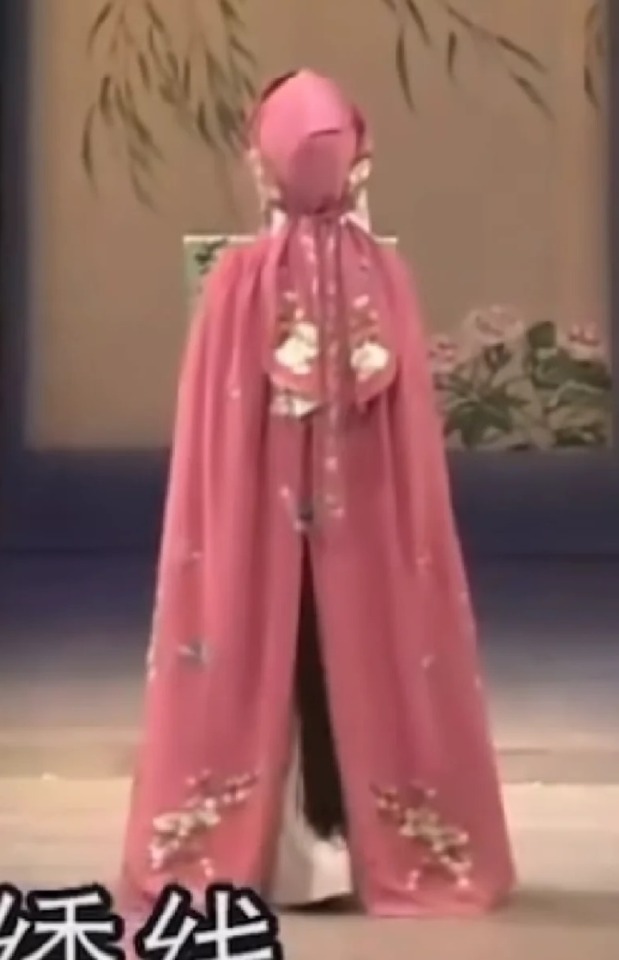
Below are historical photos of women wearing doupeng in 1920s Beijing - note how they are hoodless (1/2):
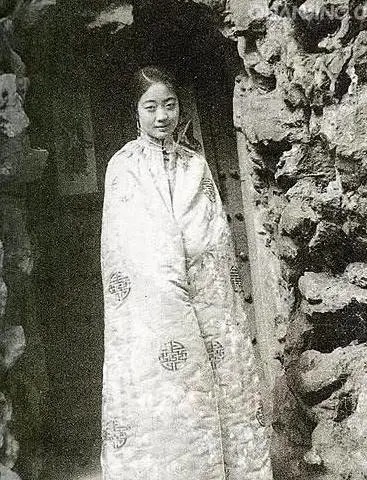
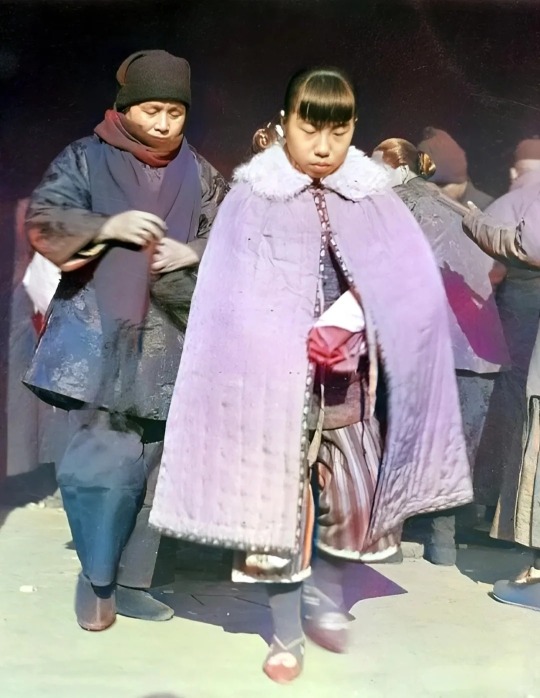
Hooded doupeng, in contrast, are more similar to historical western cloaks, such as the below American/European cloaks from the 18th century (1/2):


The hooded doupeng of modern hanfu are likely based on those seen in guzhuang dramas - another instance of drama costumes not being the most historically accurate (x):
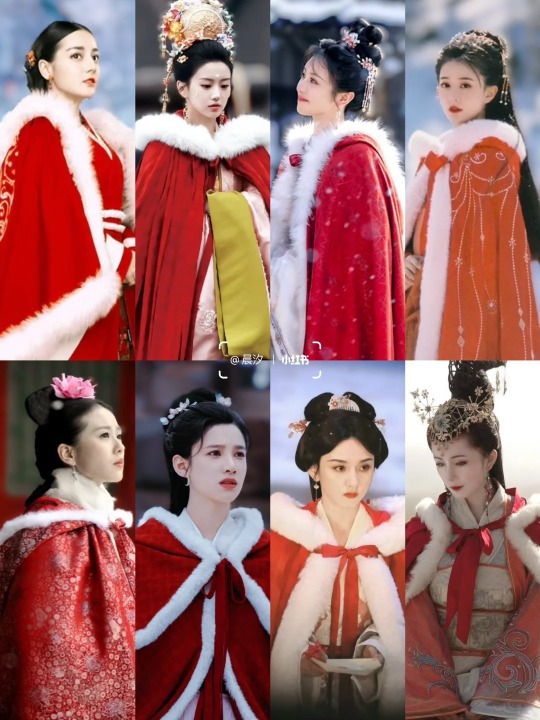
An example of a drama with a historically accurate depiction of doupeng & fengmao is the 1987 TV adaptation of Dream of the Red Chamber. As seen in the below images, the characters wear hoodless doupeng & occasionally matching fengmao as part of their winter wardrobe (1/2/3):
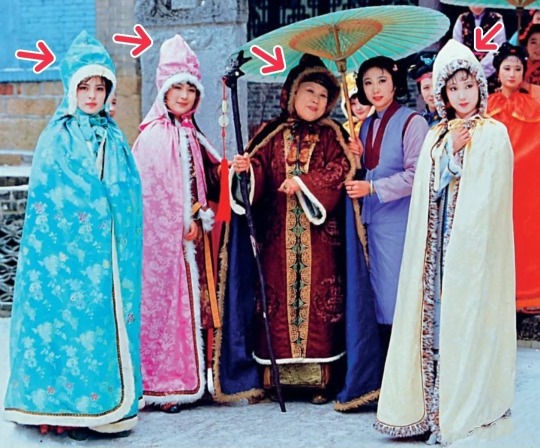
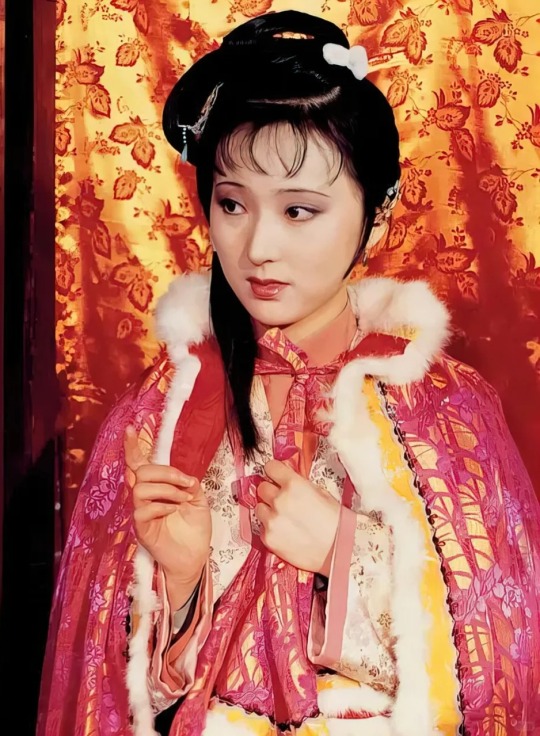
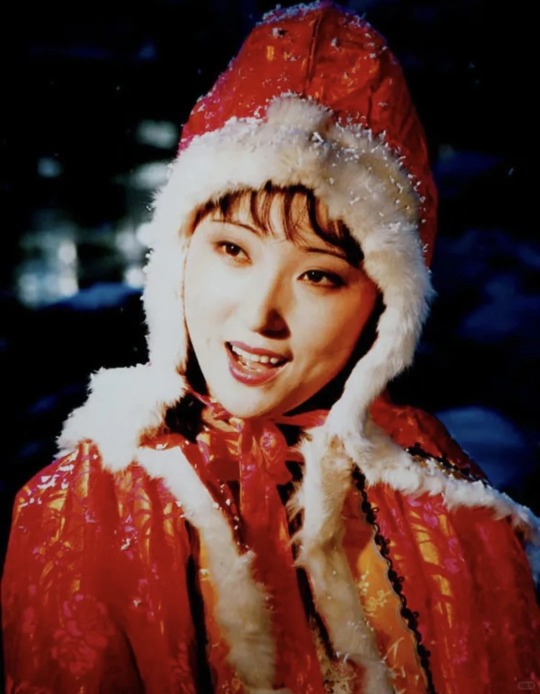
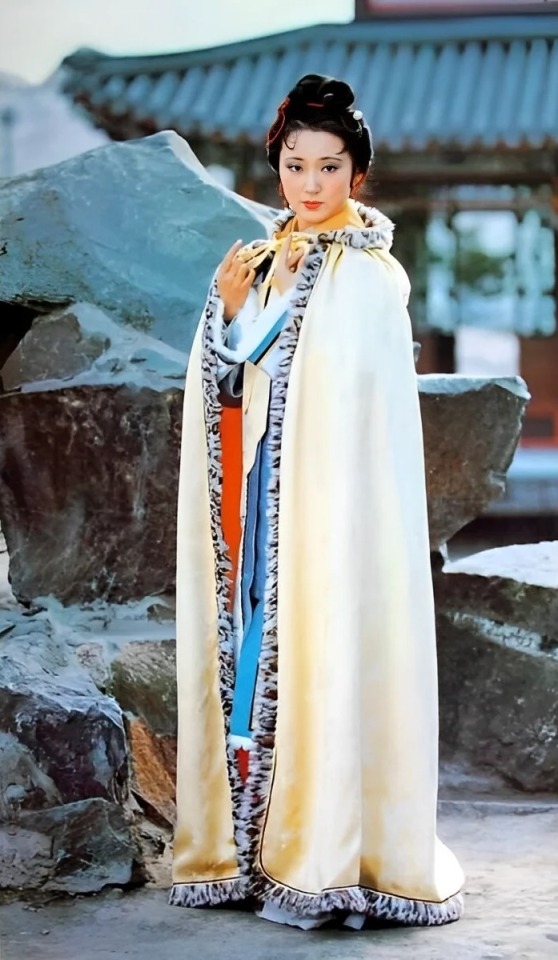
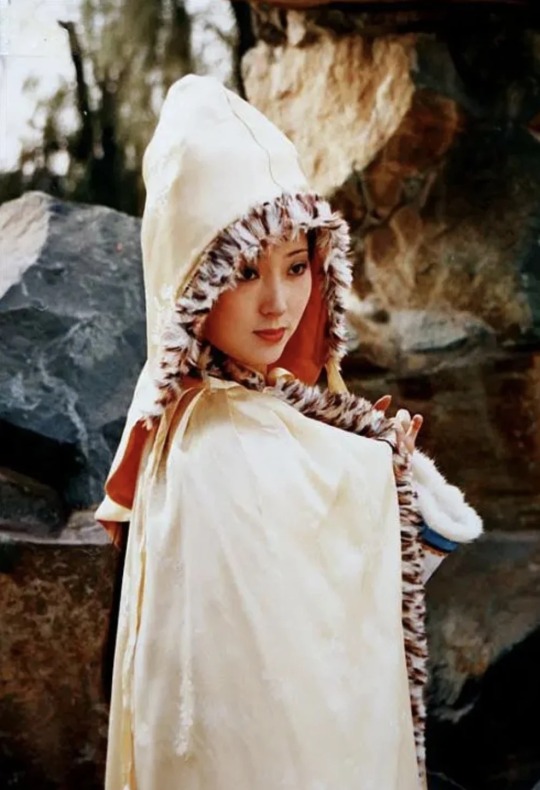
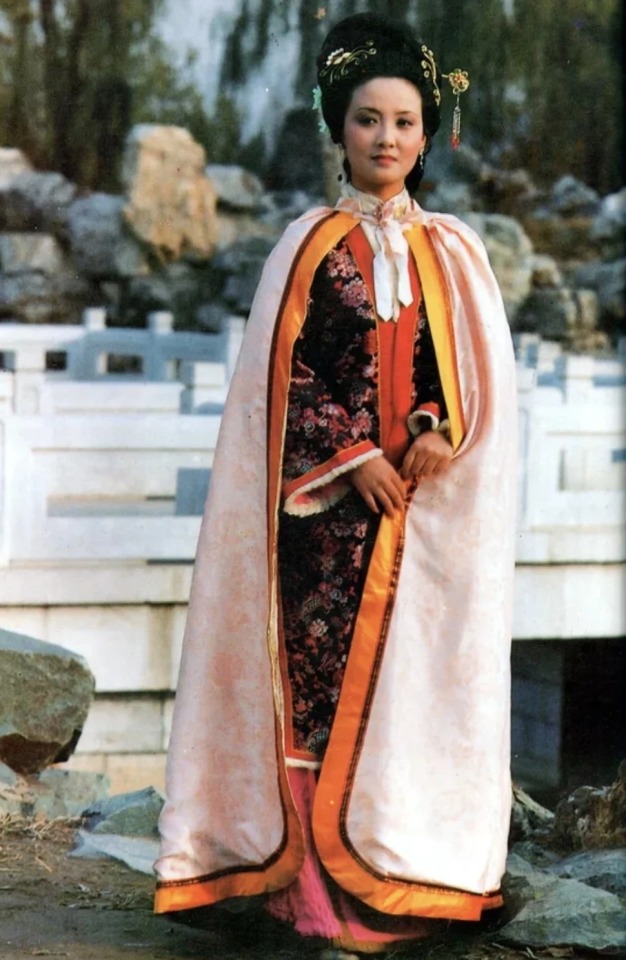
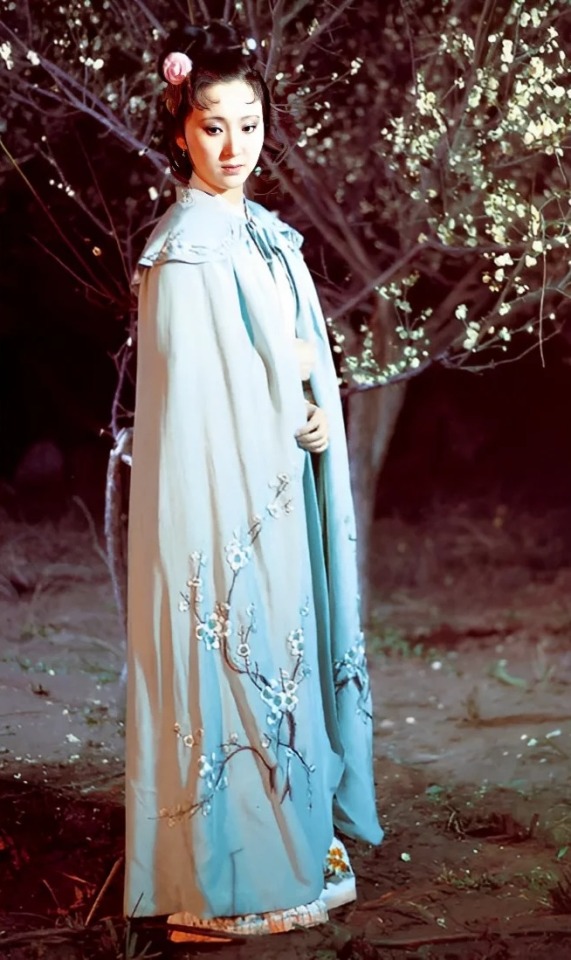
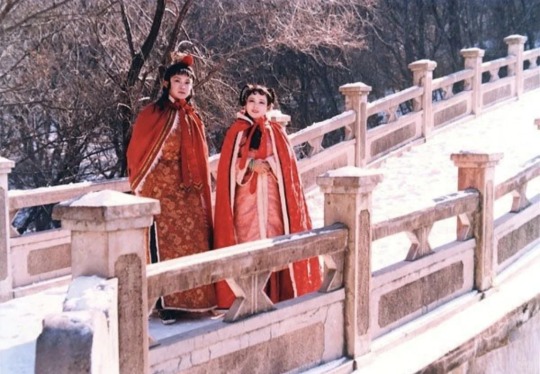
The 1994 TV adaptation of Romance of the Three Kingdoms also depicts historically accurate, hoodless doupeng & matching fengmao worn by men (x):
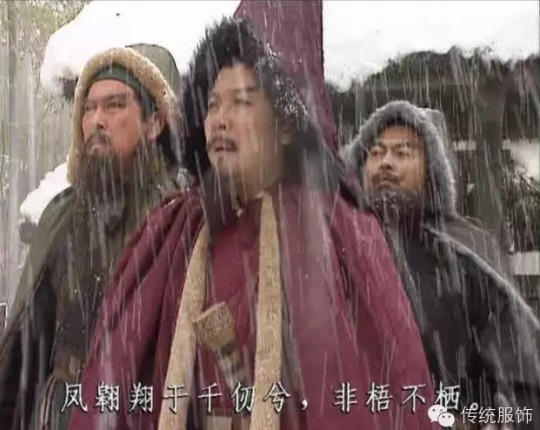
For more references, please check out my doupeng, fengmao, and winter wear tags.
Hope this helps!
#hanfu#doupeng#cloak#cape#fengmao#hats#winter wear#hanfu accessories#chinese opera#opera costume#xifu#drama costumes#dream of the red chamber#>500#china#history#reference#ask#reply#chinese clothing#chinese fashion#chinese culture
857 notes
·
View notes
Text

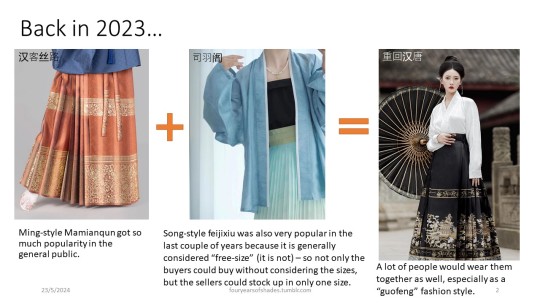
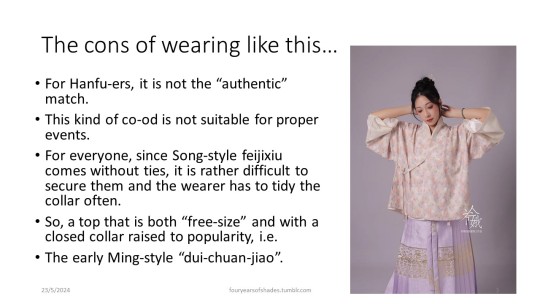
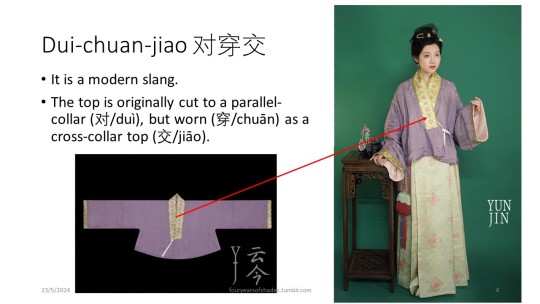

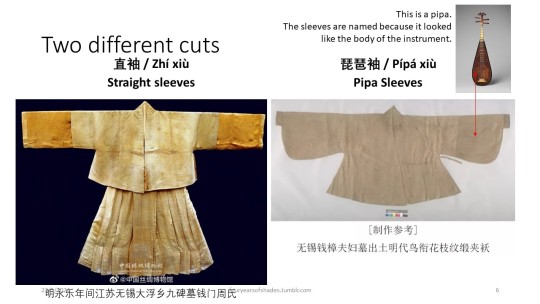

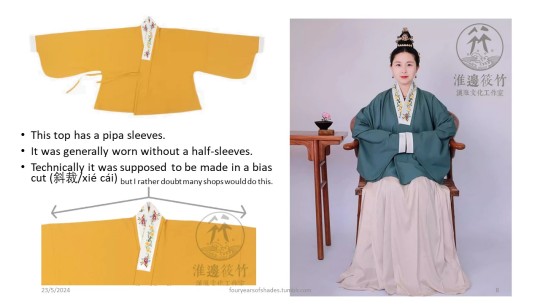
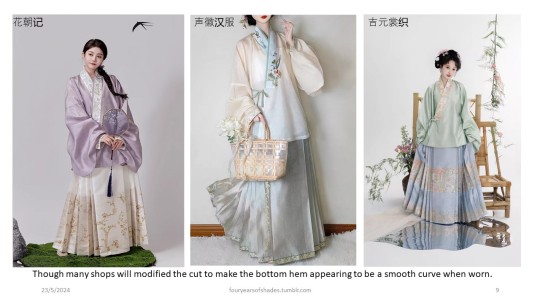
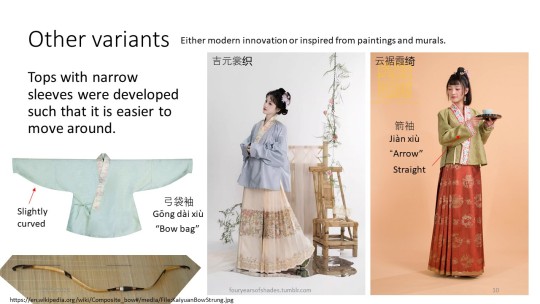

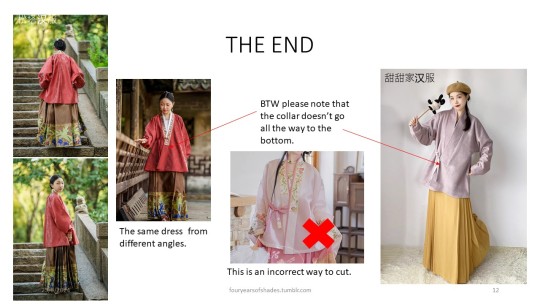
I wanted to make this post since a couple of months ago. As proper summer is coming, Song and Tang style might make a come back in another couple of months.
#hanfu#chinese fashion#fashion trend#fashion#mamianqun#ming style#spring 2024#duichuanjiao#fouryearsofshades#long post#reference#i feel like it is a replacement for a proper ming-style cross-collar#because that thing is so difficult to make and so difficult to buy#also too hot to wear when the weather is warm#the duichuanjiaos are also often modified so that the collar is narrower
1K notes
·
View notes
Text
Hanfu in Components: Hanfu Anatomy, Tops (pt 3.1)
navigation: hanfu in components 1 2 3.1 3.2 ...
Now that you know about the names of different garments, what about the parts of each garment? There are so many confusing terms!!! I gotchu :>
When looking at hanfu and parts of hanfu, it can help to see how the garment is constructed. To do that, we have to look at the pattern of the garment. Sewing patterns are the templates that tell sewists how to cut their fabric into the shapes that are needed to make their clothes. Hanfu sewing patterns are fairly standard. They look roughly like this.
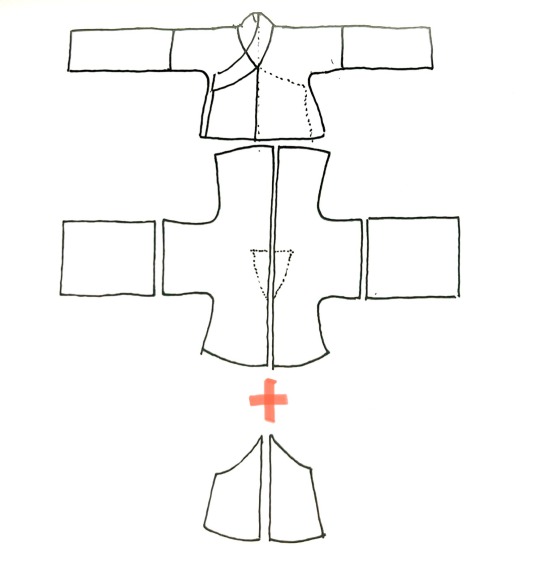
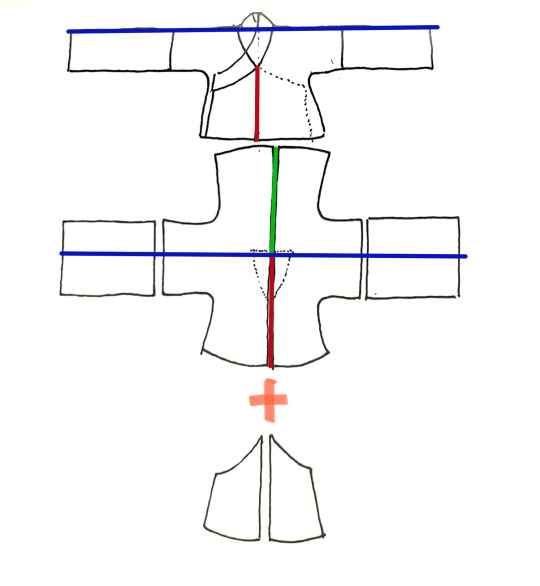
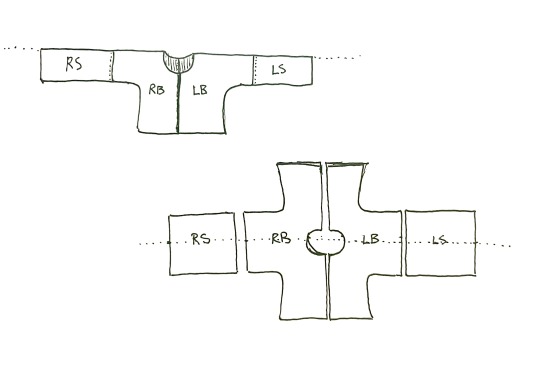
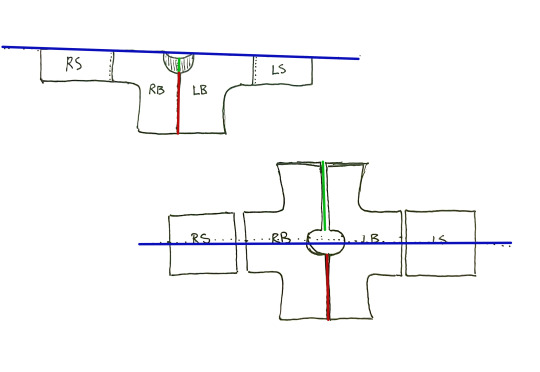
(blue = shoulder fold line // red = center front // green = center back)
To help you understand how this all comes together, when defining different parts of hanfu anatomy, I'll show it on the sketch above, and also on photos of people wearing hanfu, highlighted in green.
身/SHEN1/BODY
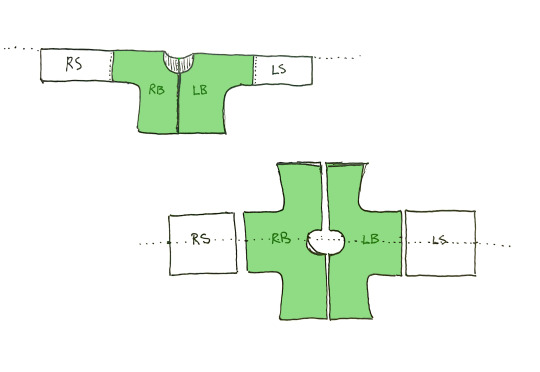
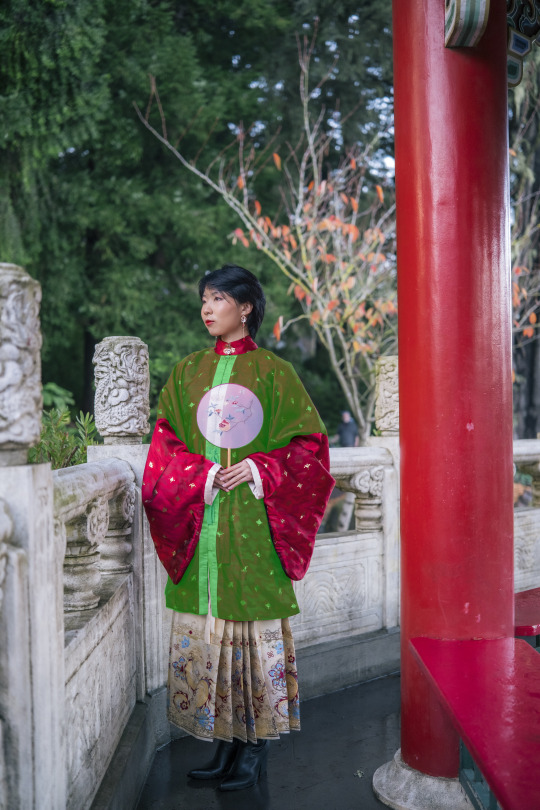
This refers to the body of the garment—the part that would cover your torso. Typically there are two pieces of cloth making up the body: one on the left and one on the right.
Once again, one of hanfu’s main defining characteristics is that traditionally, THE SAME PIECE OF FABRIC MAKES UP THE FRONT AND THE BACK. There is no shoulder seam separating the front and back of the garment.
袖/XIU4/SLEEVE
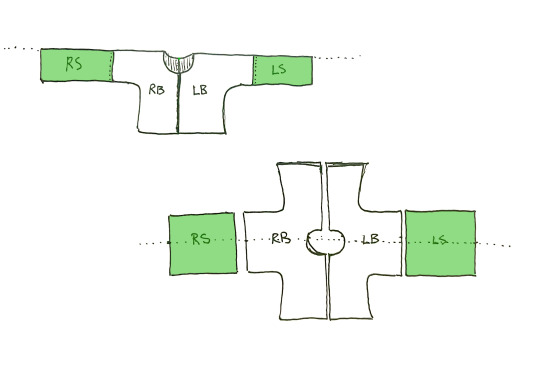

袖 means sleeve (in both technical and colloquial terms). There are many shapes that the sleeve can take: they can be narrow like normal clothing or they can be big and dramatic like the kind you see in cdramas. Like the body, there is no seam separating the front and back of the sleeve—the sleeve piece is draped over the arm and sewn together at the bottom. Another important characteristic is that the sleeves are joined to the body at the bicep or elbow area, NOT at the shoulder. (Short or half-sleeve tops might not have a separate sleeve piece.)
領/领/LING3/COLLAR
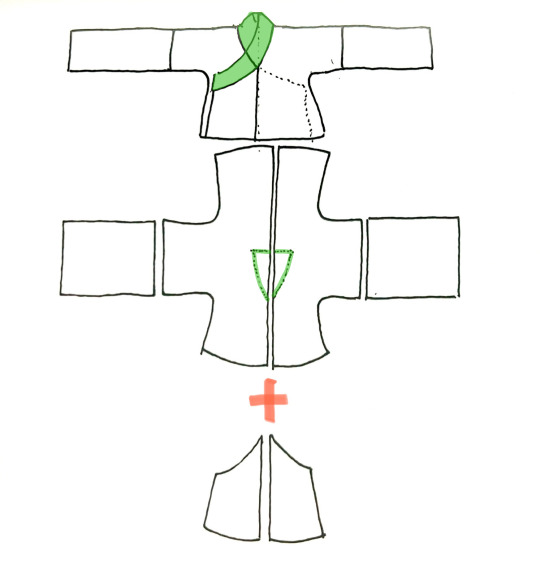
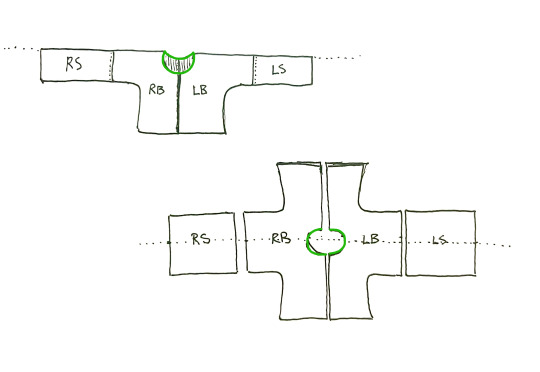

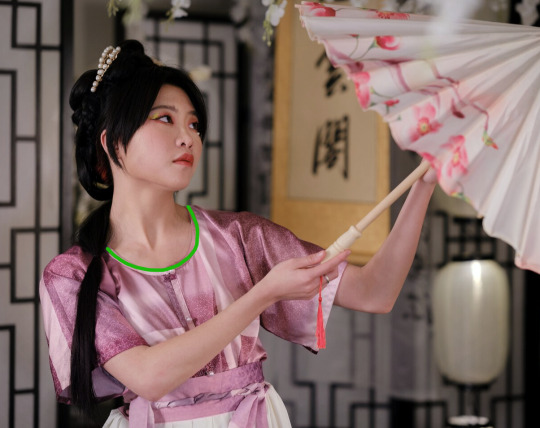
領 means collar (in both technical and colloquial terms). This can refer to two things: one, the general shape of the neck area (round, square, standing, cross etc.) and the actual strip of fabric that is attached at the neck to form the collar.
襟//JIN4/LAPEL
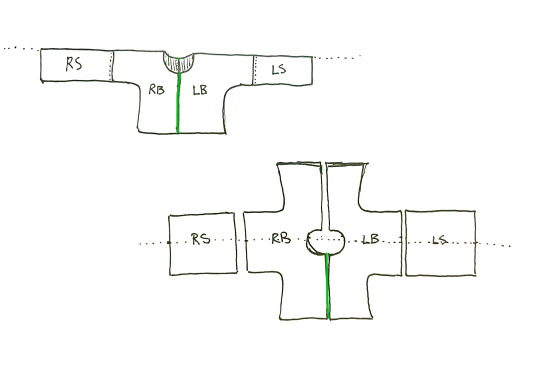
This can be translated as collar or lapel; I choose to say lapel to distinguish it from 領. This refers to the area where an open-front top would open. It’ll look different based on the collar type—generally a 對襟/对襟/dui4 jin4/parallel collar top’s jin coincides with the front centerline.
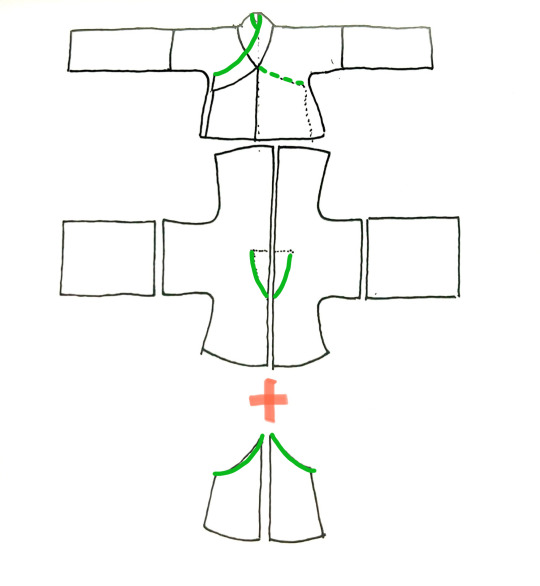
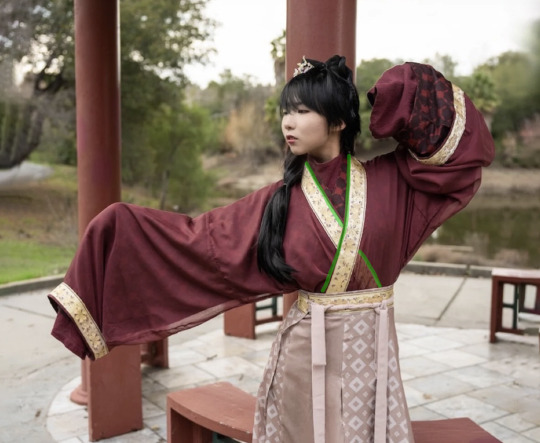
With a 交領/交领/jiao1 ling3/cross-collar top, however, it would coincide with the outer edge of the collar. (Will have a more detailed post about this later.)
下擺/下摆/XIA4 BAI3/HEMLINE
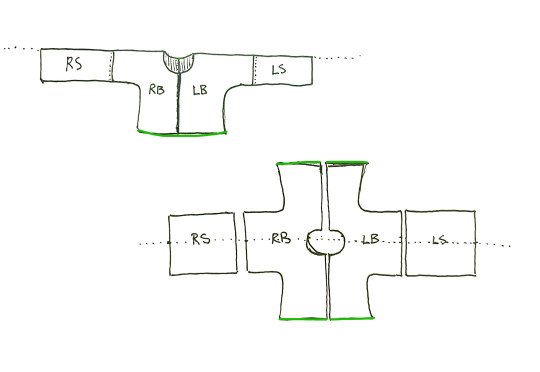

Refers to the bottom hem of the garment. 下 means down/bottom. Note that 擺 can refer to different things in different contexts. If you see someone talk about the 下擺 of a top, they’re talking about this bit.
The following terms only apply to a subsection of hanfu tops and may have fewer images as a result.
衽/REN4/LAPEL EXTENSION
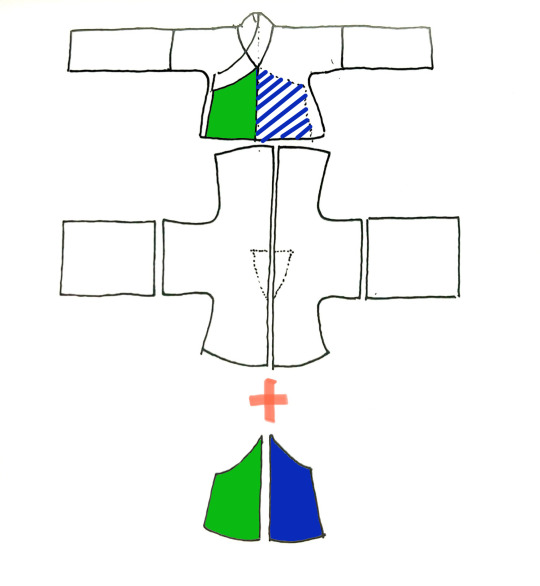

This one is a little harder to translate. Applies to non-parallel lapel tops like cross collar, diagonal-lapel standing collar, and overlapping round collar garments. It’s an extension of the BODY piece on the front, sewn to the vertical center front seam, that overlaps over the other side. (Will have a more detailed post about this later.)
衩/CHA4/VENT
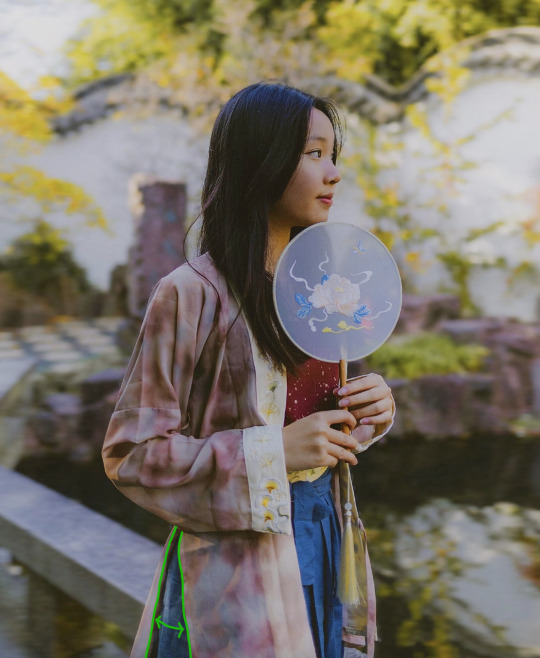

Also called vents or slits—an optional open slit, usually made on each side of a longer shirt or robe, to allow for ease of movement. Might be combined with the word 開/开/kai1/open to form the phrase 開衩/开衩/kai1 cha4/open slit. Mostly applies to longer robes or tops, where the length reaches the knee, so that you don’t have issues with walking.
襴/LAN2/WAIST EXTENSION

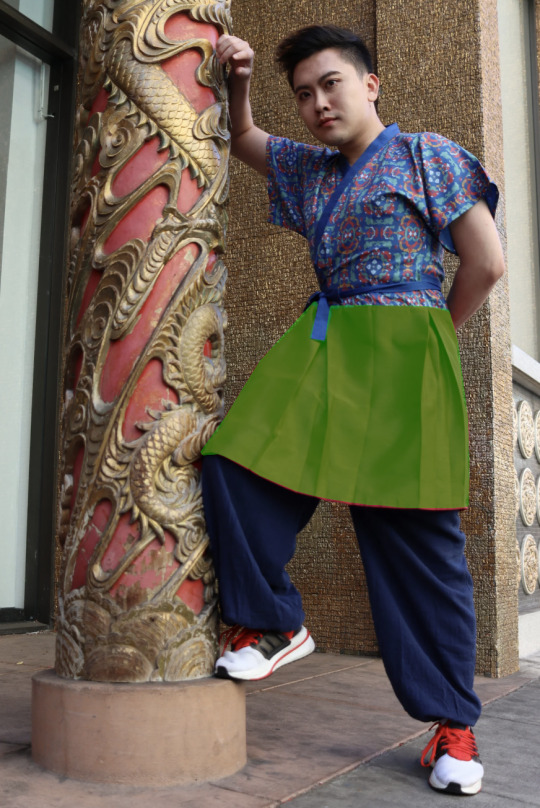
Also a little harder to translate. This only applies to 襦/ru2/Ru tops and 襴衫/襕衫/lan2 shan1/Lanshan robes, plus some varieties that were derived off of those two. The 襴/襕/lan2 is an extra rectangle of fabric appended to the bottom of a shirt/top to extend its length. It can be made of a contrasting fabric or the same fabric, and often has pleats on the sides to allow for movement. (Will have a more detailed post about this later.)
緣/缘/YUAN2/TRIM


Refers to the trim or decorative contrasting bits on a piece of clothing. Specific location goes in front of the character. For example, 袖缘 means sleeve trim, aka the cuff. Some specific trims might have their own special names but that’s for another post.
Later post about skirts/pants to come soon!
navigation: hanfu in components 1 2 3.1 3.2 ...
#hanfu#hanyuansu#chinese hanfu#chinese history#chinese fashion#hanfu photoshoot#hanfu fashion#terminology#reference#chinese#ft tangtang's shitty drawings again#long post#cloud9hanfu#九雲閣#cloud9 hanfu#hanfu in components
206 notes
·
View notes
Text
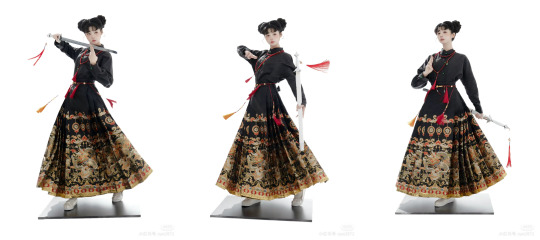
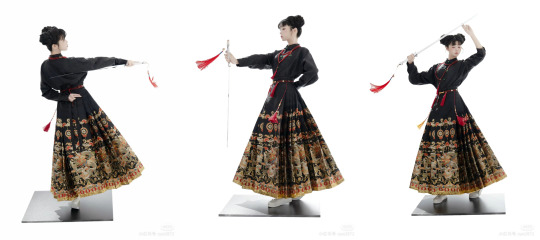
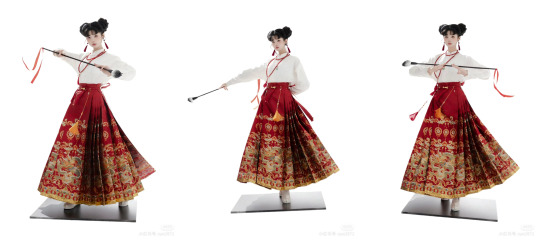
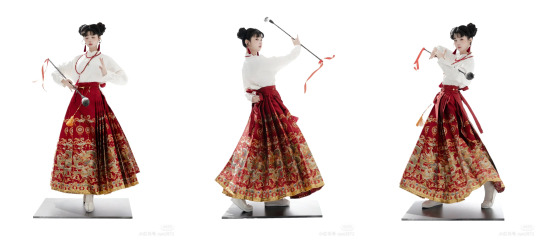
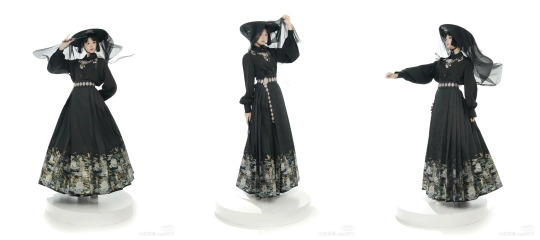
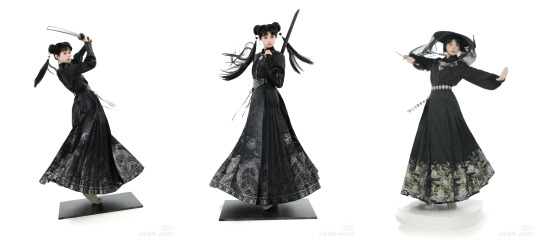
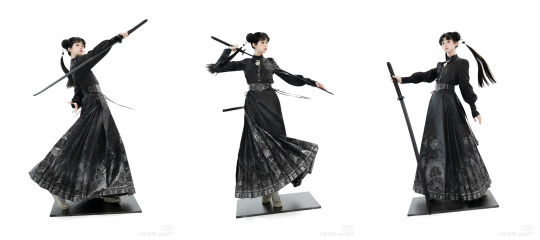
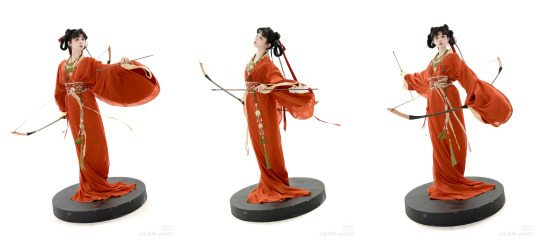
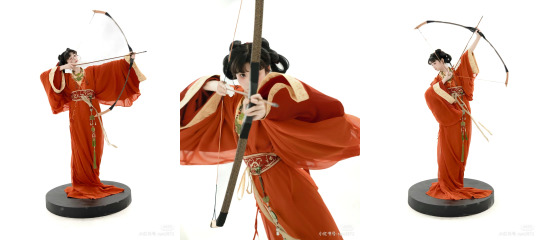
art reference of chinese hanfu by 念一个稚年
786 notes
·
View notes
Text







Chinese hanfu of moon goddess chang'e嫦娥 who lives in guanghangong广寒宫/ guanghan palace (meaning the cold and spacious palace) on the moon. The styling and makeup are often inspired by the chang'e from the costume drama journey to the west (1986 version) and referenced classic chinese paintings. Chang'e flying to the moon is a household story in china. That's why China named its lunar probe series chang'e.
In addtition to chang'e, the looks of yutu玉兔/jade rabbit and guihuajing桂花精/sweet osmanthus spirit are also popular choices for chinese hanfu on mid-autumn festival. Jade rabbit is the pet of chang'e who makes 长生不老药chang sheng bu lao yao/elixir by grinding and smashing herbs every day, and if one takes the elixir, one'll live forever and become immortal (that's the story of yu tu dao yao玉兔捣药/jade rabbit grinding herbs). And guihuajing/sweet osmanthus spirit involves another story about the moon, wu gang fa gui吴刚伐桂/wu gang chopping osmanthus tree.
Wu Gang is a man who wants to learn the secret of immortality but doesn't want to put in the effort. His laziness angers the Jade Emperor, who punishes him by sending him to the moon palace to cut down the osmanthus tree every day, and he can go back to the earthly world when he's finished. It turns out that every time he cuts down the tree, the osmanthus tree automatically recovers its original shape, so wu gang's work will never be finished. According to the story, he cuts down the tree to this day, as a neighbor of chang'e. So his desire to live immortal was realized in an outrageous way lmao (the wisdom of jade emperor). However the chinese myths never says how wu gang and chang'e were related or how they get along, if they ever chatted or anything like that. We only know they are neighbors.
It's funny that no one has ever dressed up as wu gang on the zhongqiu/Mid-Autumn Festival, probably because he doesn't have a specific image or people think he is nobody and don't care about him, and I think it would be especially fun if someone dressed up as a wu gang standing next to chang'e holding an axe as her bodyguard.
In short, yutu and guihuajing are often represented with elements of bunny, osmanthus flowers, and mooncakes respectively, and the colors are usually sunrise orange or bright yellow, many with a distinct xianxia仙侠 style. There are also some historical styles as well.
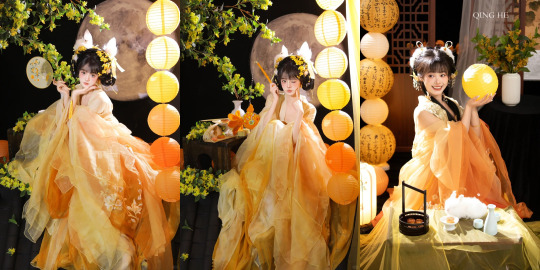







#china#hanfu#chinese hanfu#fashion#chinese fashion#reference#mid-autumn festival#zhongqiu#september 17 is the day of zhongqiu in china this year according to chinese calendar
361 notes
·
View notes
Text
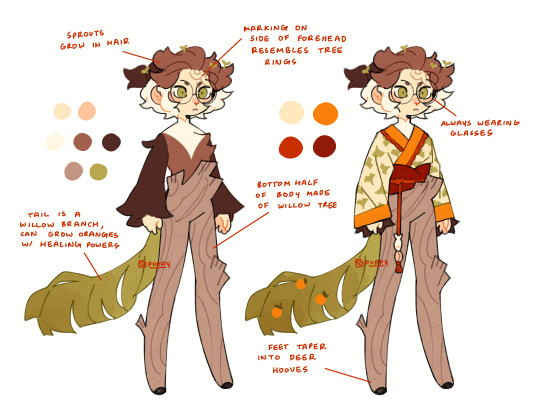
updated xin ref
#i havent drawn them in a while ^_^ changed their hanfu a little so they only really wear the top half#and the leg shape as well.. i used doll joints in the past just so it wouldnt bother me drawing their leg bending but at this point idc#the red parts on their hanfu are meant to kinda visually mirror sailor's red rope.. something something bound by fate#and i opted for a ginkgo pattern this time around since i think its suits them better. coincidentally ginkgo also has medicinal properties#and i kept the marking frm when zah drew them because it really is such a nice touch that i wanna keep it in their design :)#and if we're going off the idea of sailor bringing them clothes to wear as souvenirs id bet he picked that pattern out since it#reminded him of xin lol. you can also see they have a little fish charm as their jin bu (sailor has a matching one)#they are so friends to me... i love them sm#still need to update their page a little since i overhauled some of their lore.. theres a whole slidedeck and everything lol#my art#myart#my oc#myoc#oc#xin ya#lmk#lmk oc#lego monkie kid oc#ref sheet#oc ref sheet#oc reference sheet#fur#furry art#furry
363 notes
·
View notes
Text
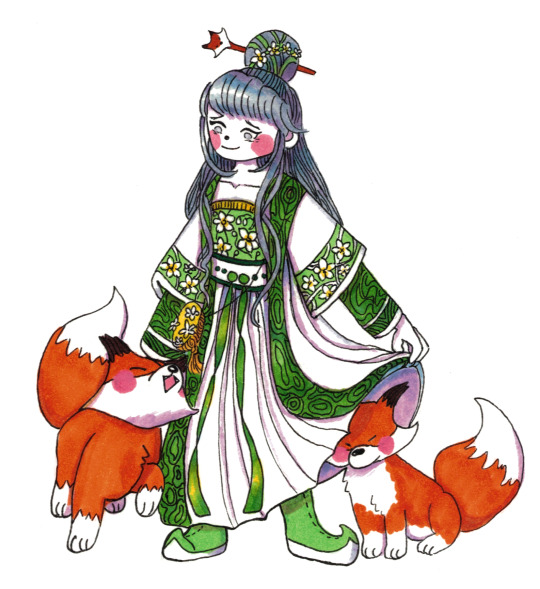
A-Qing, the little fox.
#better drawn mdzs#mdzs#a-qing#I needed to draw her happy one last time#i also really wanted to try my hand at drawing Hanfu. Clothing is still hard for me but I learned a lot!#the process was 1) get idea from the fox hairpin extra 2) thumbnail 3) look up references 4) accept that this is nearly an impossible task#5) do it anyways. For A-Qing#It has also been a while since the last better drawn mdzs. I've been getting better! B*)#I chickened out of having this be a ‘draw this in your style’ prompt….Perhaps in the future!#I want to improve a little more first I think. Psychically beaming my beloved mutuals to re-kick off DTIYS in my stead#I adore how A-Qing is associated with foxes! She is cleaver and quick to adapt! A trickster in many regards!#There is absolutely more to analyze here but I'm not well versed about Chinese mythology
1K notes
·
View notes
Text

⸺ ada wong x reader, 28K
⸺ gothic horror, historical (19th century), vampires, blood, angst, hurt no comfort, tragic romance
⸺ summary: An invitation to curiosity is extended to you, a female historian struggling in the burgeoning 19th century, by the newest heiress of an elusive and basically undocumented, influential family, whose centuries-old secrets are waiting for you in the shadows. As fascination deepens into something darker, you unravel truths that will bind you to Ada Wong’s world forever—and a dangerous question emerges: how much of Ada’s story will become your own in the end?
⸺ back to bloody endings.
⸺ read on ao3

taglist: @uhlunaro @wxwieeee @ann1-the-s1mp @withonly-sweetheart @esterphobic
@justb3333 @ada-wong-lover @nyctophiliagnes @kiyokoume @lightning-hawke
@cherriesnfangs @byexbyez @wlwhorrorgame @misonesaturou @sparrowguardian
@saturnzei

The storm begins before dusk, a faint rumble that rolls up from the distant hills, as though the world itself is sighing out its sorrows. Outside your window, the last threads of daylight slip behind a layer of thick clouds, and the streets below are soon swallowed by shadow. The air is damp and cool, the kind of cold that creeps in under doors and through cracks in the window frames, settling in the lungs like a long-awaited visitor.
The room is a mess, cluttered with the debris of years spent chasing stories that never quite coalesced. Stacks of brittle, yellowing paper are scattered in every corner—old manuscripts, some worn with the creases of too many hands, others forgotten altogether, pages untouched, waiting for eyes that never came. Beside them, books—leather-bound tomes with frayed edges, their spines cracked from years of abuse—are piled precariously on top of one another, threatening to collapse under the weight of your obsession.
Your desk is no better: a mess of open journals, maps drawn with ink that’s starting to smudge from handling, clippings of old newspaper articles pinned haphazardly across its surface. In one corner, a quill sits in a well of ink, the dark liquid rippling slightly in the low lamplight. Your hands, stained faintly with ink, rest wearily atop the pages of a forgotten journal, its contents half-scratched out. You’ve been at this for hours, though it feels like days.
Your eyes flicker toward the clock, its hands ticking away sluggishly. You know it’s broken, that time here has lost all meaning. It’s been this way for weeks, maybe longer—an endless cycle of poring over documents that never quite lead where you hope, of chasing shadows that dissipate just as you reach for them. You lean back in your chair, the wood groaning beneath you, and rub your eye sockets with the heels of your palms, willing away the dull throb that has settled behind your eyes. It’s always there now, this ache, a constant companion.
The walls of your room close in around you, heavy with the scent of old paper, ink, and something damp that lingers in the corners. Outside, the storm picks up, rattling the windows as the wind claws at the glass, demanding to be let in. The soft flicker of candlelight casts shifting shadows across the room, shadows that seem to move of their own accord, stretching and curling in a dance that seems almost sinister. Or perhaps, you think, you’re just tired. Tired and frustrated, the kind of fatigue that seeps into the bones, weighing them down until each step, each breath is a struggle.
With a sigh, you turn away from the window and focus back on your desk. You sink into your chair again, the leather sighing as it takes your weary form. Your fingers brush against the edges of the papers strewn across its surface, a futile gesture. There's nothing here, nothing that leads anywhere. Not for your sex. You've seen men come and go, boasting of their exploits and discoveries, while you remain trapped in the mire of half-truths and conjecture. It's enough to drive one mad, this endless chase, the frustration of being so close to the truth and yet always falling short, being blocked or mocked, or worse, simply ignored. To be a woman in a man's world, especially one of such prestige, is to be invisible, despite your brilliance. And you are brilliant. If only they would give you the chance to prove it. But no, you are relegated to the sidelines, forced to watch as lesser minds take the credit for discoveries that should, by rights, be yours.
It is a bitter pill to swallow, the knowledge that no matter how hard you work, no matter how much you learn, you'll always be viewed as less than, as an afterthought. The injustice of it stings, sharp and deep, a wound that refuses to heal. Some days, when the despair threatens to overwhelm, when the futility of it all becomes too much to bear, you find yourself questioning everything, wondering if the pursuit of knowledge is worth the cost, if the price of greatness is a lifetime of solitude and scorn. Those are the days when the darkness whispers to you, tempting you with thoughts of surrender, of giving in to the void and letting it consume. Just marry a man. Any man. Throw your pen away and settle in a kitchen. Leave the mysteries of the world to those deemed worthy of solving them.
But you can't, not yet, because somewhere, buried beneath the layers of bitterness and anger, lies a stubborn determination, a fierce will to prove everyone wrong. You will not be defeated. You will not fade quietly into the night, a forgotten footnote in the annals of history. A woman that gave up is worse than a dead woman. So on, you will go, chasing the next clue, the next scrap of information, hoping that this time, this time it will lead to something real, to the breakthrough that will silence the doubters and elevate you to the status you deserve. Until then, you will continue to toil in the shadows, a solitary figure hunched over dusty books and faded scrolls, seeking answers to questions that others dismiss as foolish or irrelevant.
A loud crack of lightning illuminates the sky outside, making the window shake and rattle.
There is a knock at the door.
It is soft at first, almost tentative, but it cuts through the quiet, pulling you from your thoughts. You don’t move at first, listening to the silence that follows. Then, again—a knock, more insistent this time, echoing through the small space.
You push yourself to stand, joints cracking in protest, and pace the cramped confines of your room, the floorboards creaking softly underfoot. You pause at the window, drawing back the thin, moth-eaten curtain to peer out. There’s nothing to see, of course, just the dark, empty streets and the shadowy outlines of buildings in the distance, their windows as dim and lifeless as the eyes of a corpse. The rain has started to fall in earnest, fat droplets that splatter against the glass, distorting the view even further. They race down the pane, joining together in a desperate attempt to escape before eventually succumbing to gravity and sliding inexorably downward. The lamplight outside barely cuts through the gloom, illuminating only the vague outline of the cobblestones slick with water.
Opening the door, you’re greeted by a figure standing in the doorway, a silhouette more than a person. The rain hides their features, masking them behind the veil of the storm. Without a word, they extend an arm, and you notice the envelope clasped in their hand, its edges slightly damp from the rain. The wax seal catches the light—a deep crimson, its surface glossy despite the weather, and the crest pressed into it is unfamiliar to you.
Before you can speak, the figure is gone, swallowed by the night as swiftly as they appeared, leaving you alone with the envelope still held awkwardly in your hand. You stand in the doorway for a moment longer, staring into the rain, trying to discern the shapes of buildings and streets through the torrent, but everything feels distant, obscured by the gloom. A sharp gust of wind pushes against you, forcing you back into the warmth of your room, the door creaking shut behind you with a dull thud.
The envelope feels strangely heavy in your hands, its paper thick and textured under your fingers, the seal unbroken. You turn it over, studying the crest pressed into the wax—a swirling, intricate design that you don’t recognize, though something about it sends a faint prickle of unease up your spine. You bring it closer to the lamplight, tilting it slightly to catch the way the red wax gleams, as though it were fresh, untouched by time.
Sitting back at your desk, you place the envelope carefully in front of you, letting your fingers hover over it for a moment before finally reaching for the letter opener. The metal is cold in your hand, the tip slipping under the seal with a soft snap. The wax breaks cleanly, falling away in small pieces onto the desk, and for a moment, the silence in the room holds its breath, the sound of the storm outside muted to a dull hiss.
You pull the letter free from the envelope, the paper softer than you expected, curling slightly at the edges where it was pressed inside. The handwriting is elegant, the ink dark and precise, the words flowing in neat, looping lines across the page. You begin to read, your eyes tracing the curves and angles of the letters, the sounds of the words forming in your mind, the meaning unfolding slowly like a flower in bloom.
My Dear Historian,
The greeting feels personal, too personal for someone you’ve never met. Yet the title fits. It’s what you are, what you’ve dedicated your life to—digging through the remains of the past, searching for truths buried beneath layers of dust and time. But there is something more in those words, something that makes the skin on the back of your neck tighten.
I trust this letter has reached you at a time when your search has led you into dead ends, and the world has shown you its cruel, unforgiving face. Know that I understand the burden of isolation that comes from being different, from having a passion that sets you apart from the rest. It is a loneliness that few can comprehend, but one that I am intimately familiar with. This shared solitude is why I write to you today.
The handwriting loops and curves, elegant yet strong, and you can feel the confidence of the one who penned it—someone accustomed to holding power, someone who knows they are in control of more than just the ink on the page.
My family's estate, hidden from the prying eyes of the world, is a treasure trove of secrets, a labyrinthine archive that holds within its walls the history of centuries. It is a legacy that I wish to share with the right person, someone who can appreciate the significance of what lies within, and who can help me safeguard its contents from those who would seek to destroy or exploit it.
I offer you the opportunity to be the guardian of this knowledge, the first one to ever explore and document what has circumvented the world for so long. This invitation is not without its conditions. Discretion is of the utmost importance. You will have to stay here, at the estate, until the work is done. There can be no communication with the outside world until the work is completed. Once our arrangement is concluded, you will be free to return to your life, a wealthier and wiser historian.
Consider this a challenge to your skills, a test of your intellect, and a chance to leave an indelible mark on the field of historical research. But if you are the historian I believe you to be, the decision is already made. If you accept, a carriage will arrive to collect you at the next new moon, when the night is darkest. All arrangements have been made. Come alone, and bring nothing but your expertise and an open mind.
The name at the bottom of the letter stirs something in your memory—Ada Wong. A name you’ve come across in fragments, hearsays on the edges of off-the-record conversations, a ghost in the archives. She's a recluse, some say, an eccentric heiress who lives in a castle nestled in the mountains, far from civilization. Others claim she's a witch who has robbed the family she's come to inherit from, of their fortune. And still, others, the most serious and scholarly, insist that she's simply a rich, bored noblewoman who has taken up an interest in the obscure, a hobby that has earned her a certain notoriety among those in the know.
For a moment, the world outside fades entirely. The rain, the wind, the cold—all of it seems distant, as though the letter has created its own bubble of reality, separating you from everything beyond its ink-stained words. The idea is seductive, an escape from the drudgery that has become your life, a chance to prove yourself in a way that matters.
And then the spell is broken. As quickly as it had formed, the illusion shatters, leaving you once again in your cramped, cluttered room, the rain battering at the windows and the clock ticking away mockingly. The letter is a fantasy, an impossible dream. You are a nobody, a struggling scholar scraping by on the generosity of strangers and the kindness of a landlord who has seen too many like you. Why would someone like Ada Wong reach out to you? What could she possibly see in a woman whose name has never graced the pages of a prominent journal or earned the respect of her peers?
You flip to the second page where you'd seen her signature, and squint at the crest that's been stamped at the top. It's a bird of sorts, a crane, maybe, perched atop a shield. Below, two words, in a language you can't quite place. Maybe German, or Dutch. The stamp looks real. Real and ancient. Something that would cost a pretty penny to forge. Your finger traces its outline.
No. It's not possible. It's a scam, a hoax, a cruel joke at your expense. And yet, the letter is there, the paper soft and cool beneath your touch, the ink stark and undeniable. And the promise it contains is too tantalizing to ignore, a lure that tugs at something deep within, a need to know, to uncover, that has driven you since you were a child hunched over dusty tomes in the local library. The thought of a hidden archive, a repository of knowledge that has remained untouched, is almost too much to bear. To be the first to delve into its mysteries, to unearth its secrets and bring them to light—it's a siren call that is nearly irresistible.
But doubt lingers. How can you be sure this isn't just another wild goose chase, a distraction from the work that really matters, the work that could finally earn you the recognition you crave? You've been down this road before, chasing whispers and rumors, only to find yourself at dead ends, empty-handed and disillusioned. And to leave the city, to venture out into the unknown, into the home of a complete stranger—could that truly be worth the risk?
It seems that she's anticipated that question. Her reply, written in the same neat, flowing script, reads thus:
I understand that my request may seem strange, even outrageous. But sometimes, the greatest discoveries are made when we are willing to take risks, to step outside of the comfortable and the familiar. I ask you to trust in the potential of this opportunity, in the possibility of what we could achieve together. And remember, there is no reward without risk. History, after all, is filled with stories of those who dared to venture into the unknown and emerged victorious.
I have seen your work, and I know you are not one to turn away from the unknown. Your tenacity and intelligence are well known in the circles that matter. And while the path I am offering may seem uncertain, I assure you, it is not a trap, but a gateway. Beyond the door that I hold open, lies a world of knowledge and understanding that few will ever have the privilege to experience. The immortality that you seek is in my hands. Take the chance. Accept my offer, and let the new moon guide you to a future that is brighter than anything you could have imagined.
To be the one to unlock the secrets of Ada's ancestral home, to be the one to finally bring the truth to light... it's an opportunity that can't be ignored. And so, with a shaky hand, you pick up the pen and begin to write your response. Outside, the storm has grown in intensity, the wind howling and the thunder cracking like the anger of a forgotten god. But the sound is distant now, muted by the walls of the house and the roar of your own thoughts, a cacophony of doubt and anticipation that threatens to overwhelm.

The road winds into the hills, narrow and uneven, flanked by trees that loom overhead, their branches arching together to form a dark canopy. The rain hasn’t let up since you began the journey, the steady drumming against the carriage roof becoming part of the background, a constant, insistent poking of the storm that follows you. The occasional flicker of lightning flashes through the gaps in the trees, casting the landscape in brief moments of stark, white light before plunging it back into shadow.
You glance out the small window beside you, but there’s little to see. The mist rolls over the hills in thick sheets, swallowing the path ahead. The horses’ hooves pound steadily on the wet earth, their steps the only other sound aside from the storm. The driver, hidden beneath his wide-brimmed hat and heavy cloak, hasn’t spoken since you departed, and you haven’t felt the need to ask him anything, the silence between you is a mutual understanding.
The estate’s name, etched into your mind from Ada’s letter, lingers at the edge of your thoughts, pulling you forward even as your surroundings grow more foreboding. Each mile takes you deeper into the unknown, into a place that feels far removed from the world you left behind. You shift in your seat, fingers brushing over the worn leather of your bag, your papers and journals tucked carefully inside. You feel their presence there, a small comfort of the world you know—structured, organized, and real, but everything beyond the window seems intent on dissolving that reality, turning it into something less solid, more ethereal.
As the carriage rounds a sharp curve, the terrain changes. The forest falls back, the tree line retreating to reveal the jagged peaks of the mountains, their summits lost in low-hanging clouds. Ahead, the road grows steeper, winding its way upward toward some unseen destination. At the base of the hill, you spot a village—a collection of old, weather-worn buildings clustered around a small, decrepit church. Its spire reaches skyward, a black finger accusing the heavens. There are no lights in the windows, no signs of life except for the dim glow of the street lamps. It has an aura of abandonment, of being left to decay and crumble, a relic of a time long past. As the carriage rumbles past, a shiver runs down your spine, a feeling of unease settling in the pit of your stomach. This is the last settlement you’ve seen for miles, a final outpost of humanity before the wilderness takes over.
The carriage jolts as the wheels hit a stone buried in the mud, and your hand instinctively reaches out to steady yourself, gripping the edge of the seat. The road is getting rougher, narrower, and you sense the climb as the horses struggle against the incline. The mist thickens, curling around the trees and spilling onto the road, wrapping the world in a damp, cold shroud.
And then, the trees break.
Without warning, the darkness gives way to a vast, open plain that stretches out before you, its edges lost in the swirling mist. In the center of the clearing, a castle rises from the gloom, its towers and parapets outlined by a pale, silver light that emanates from somewhere within, rising out of the mist like a sentinel watching over a forgotten land. Towers reach toward the clouds, their windows narrow slits that seem more like watchful eyes than places for light. Ivy clings to the walls, creeping up the stone in twisted vines, giving the impression that the building has grown from the earth itself, rather than having been built. There is a stillness here, a sense that the passage of time has slowed, or perhaps stopped altogether, leaving the estate trapped in a moment of eternal twilight, and even the rain seems muted, the drops falling in a hushed patter, a gentle murmur.
The path leading up to the entrance is overgrown, the stones cracked and uneven beneath the carriage wheels. As the carriage draws closer, the details of the castle emerge from the gloom. A massive, arched doorway, flanked by two enormous, iron torches that cast an eerie, flickering light, greets the travelers. The ironwork of the hinges is ornate, swirling and looping in repetitive patterns, hinting at an era long gone. Two gargoyles perch on either side of the arch, their faces twisted into grotesque, snarling expressions, their bodies crouched as if ready to spring to life. Their wings stretch out behind them, and their tails wrap around the columns they sit upon, their claws digging into the stone.
Beyond the door, a courtyard opens up, a large, cobblestone area that is silent and empty, save for the statue of a knight in full armor standing guard in the center, a sword held aloft in its raised hand. The fountain at his feet is dry, the basin cracked and filled with dead leaves. The sound of the horses’ hooves is loud in the quiet, echoing off the empty space, a steady, rhythmic thud that seems to reverberate through the very bones of the castle. The scent of rain is stronger here, mixed with the musty aroma of age and the sweet, almost sickly smell of dying flowers. Somewhere in the distance, an owl calls, its mournful hoot adding to the atmosphere of melancholy that permeates the entire estate. The driver pulls the reins, guiding the horses to a stop in the center of the courtyard. For a moment, all is still, the only sounds are the rain on the stones and the soft, panting breath of the horses. Then the door of the carriage swings open, its hinges squealing in protest, the sound cutting through the quiet.
You step out, a hesitant figure in the gloom, the hood of your cloak pulled low over your face. The driver doesn’t speak, only nods once, a quick gesture before snapping the reins and guiding the horses back down the road without a backward glance. He’s gone before you can even thank him, the clatter of hooves fading into the mist.
The wind picks up, sharp and biting, whipping through your hair as you look up at the estate rising in front of you, towering against the swirling mist and darkened sky. Its silhouette is sharp, angular, and unforgiving—an imposing structure that speaks of old wealth and forgotten grandeur. The walls are dark stone, streaked from years of rain and time, their surface etched with cracks that twist and spread like veins. Tall, narrow windows are set deep into the stone, their glass stained with a layer of dust that seems to keep the outside world at bay. They climb up the sides of the building, reaching for the shadowed heavens, casting long, skeletal shadows across the grounds.
At the center of it all stands the main entrance—a pair of massive wooden doors, each one banded with iron that’s rusted at the edges, the metal flaking and peeling away, and the large, metal knocker, its shape a twisted, serpentine dragon. There’s something about the way the doors sit, slightly uneven on their hinges, that makes them feel heavier than they should. You can imagine the groan they will make as they open, the weight of centuries hanging on every inch.
But beyond the decay, beyond the overwhelming sense of age and abandonment, there is something else—something that doesn’t quite belong. As your eyes wander over the architecture, you notice the small details that stand out against the design. The curves of the stone are interrupted here and there by subtle flourishes—carvings that resemble flowing clouds, delicate floral patterns that snake along the edges of the windows. It takes you a moment, but you recognize the influence—the style is distinctly Asian, its delicate intricacy weaving into the otherwise European structure.
The juxtaposition strikes you. It’s as if the house itself has been altered, added to over time by different hands, each one leaving its mark. The harsh Gothic edges clash with the soft, flowing lines of the more recent additions, creating a dissonance that feels deliberate, as though each resident had a vision that never quite fit with the one before.
The longer you look, the more the disjointedness of it all becomes apparent, the estate feeling less like a cohesive whole and more like a patchwork, stitched together by the changing tastes and whims of those who lived within its walls.
The rain rolls off the stone, pooling in small rivulets around the base of the steps where you're standing, and you hesitate, your fingers flexing inside your gloves as you tighten your grip on your bag, feeling the reassuring pressure of its contents, then take a breath, steadying yourself before you ascend the steps.
As your hand reaches for the iron knocker, cold and heavy beneath your fingers, there’s a moment—just a fraction of a second—where the storm quiets. The rain still falls, but its sound feels distant, muffled, as though the estate itself has swallowed it, pulling everything around you into a strange, unnatural silence.
The door opens before you can knock.
It swings inward with a low groan, revealing a foyer that seems to swallow the light, but you're too stunned, not from the timing, but because that there's nobody around to have done the opening. Your eyes scan the area quickly, looking for any sign of a person or a device, but there's nothing. Just the dimly lit room and the echoes of the door's creaking hinges. An uneasy feeling creeps up the back of your neck, a sense of being watched, or perhaps anticipated.
A gust of wind pushes you forward, and the door slams shut behind you, sealing you inside. The noise of the latch clicking into place is jarringly loud in the sudden, tomb-like silence. You stand in the entryway, heart pounding in your chest and hands pulled to your chest shaking, the taste of copper in the back of your throat. For a moment, the thought of fleeing crosses your mind. This is wrong, all of it, and you have the growing suspicion that this is a mistake, a horrible, irreparable mistake. But the realization that the carriage won't return, and the knowledge that the walk to the village would be treacherous in the storm, traps you.
"Hello?" you call out, your own trembling, meek echo in the vastness of the entry hall, "Lady Wong? Are you there?"
Your words hang in the stagnant, dusty, and mildew-scented space, the faintest of shuffles, the scrape of fabric, the drip of moisture, and the settling of ancient wood, becoming deafening in the wake of the quiet. It’s warm inside, but not comforting. The warmth presses down, thick and stale, wrapping itself around you like the remnants of a forgotten fire left too long to smolder.
There's an undercurrent of... something in the unmoving atmosphere, a kind of lingering dread that seeps into the pores and clings to the skin, the sort of unease that settles in the pit of your stomach and refuses to let go, a sensation that's difficult to shake, and even harder to dismiss as a mere figment of an overactive imagination. A single bead of sweat trails down the length of your spine, the source of which isn't the heat, but rather the chilling cold that's taken hold, a stark contrast to the stifling humidity outside.
The grand hall before you stretches into the shadows, its walls lined with portraits that seem to watch you as you move. The ceiling arches high above, almost lost in the dim light cast by flickering sconces. The flames sputter, casting strange shadows that shift along the walls, making the room feel alive in a way that the outside world no longer does. Your eyes are drawn upward, toward the high windows that let in no light, the glass stained with rain and grime, and then back down to the floor beneath your boots—polished stone, dark and glistening.
There’s something layered about the space. The same clashing of styles you noticed outside is present here, too, though it’s more subtle, more hidden within the details. The pillars lining the hall are carved in a style that speaks of European craftsmanship, yet the bases are adorned with delicate etchings of cranes and lotus flowers that seem to belong to another time, another place. The chandeliers above, too, are a strange amalgamation, wrought iron twisted into shapes that almost resemble dragons, their mouths open in a silent roar, their bodies curling in on themselves.
Your eyes drift over the portraits hanging on the walls, the frames gilded and ornate. The figures within them are dressed in the fashion of centuries past, their expressions solemn, eyes fixed forward in that unsettling way portraits have of capturing more than just a likeness. Some are clearly European, their features sharp, condescending, but others are a study in diversity of different peoples of the world.
There’s no rhyme or reason to the placement of the portraits, no clear lineage to follow. Some of the faces seem to blur together, their details lost in the dim light, while others are so sharply defined that they almost seem to stand out from the canvas. And always, those eyes—they follow you as you move deeper into the hall, a silent audience watching your every step. As you walk, the sound of your footsteps is muffled, the acoustics of the space swallowing the noise instead of reflecting it, the echoes that should bounce off the walls and ceilings are muted and distorted, creating a disorientating effect.
At the end of the hall, a grand staircase rises up, the banisters sweeping upward in graceful arcs, the wood polished to a deep, rich shine. You stop at the bottom step, your hand reaching out to touch the smooth, cold metal of the railing.
And then, from the upper landing, a figure appears. Dressed in a gown of crimson and black that ripples in the low light, the colors shifting and blending like oil on water, the woman descends the stairs, her steps a slow, measured cadence, her heels clicking softly against the marble. She moves with a kind of effortless grace that catches you off guard, as if the air itself parts for her, smoothing the way.
"Welcome." The word slips from her lips, soft but firm, carrying effortlessly through the hall. "You must be my guest."
Despite the warmth of her words, there's a certain coolness to her demeanor, an impenetrable aloofness that keeps her at a distance, a barrier that invites curiosity and defies intimacy.
Ada Wong stands before you in the flesh, not the half-imagined, half-fabricated version of her that you've conjured from her letters, but the real, tangible woman. She's taller than you'd expected, her frame deceptively willowy under the layers of her finely tailored dress—a hanfu, you realize. Its style and cut are unmistakable, its intricate embroidery and elegant lines a striking contrast to the Gothic architecture surrounding her, a living embodiment of the cultural dichotomy that seems to permeate the entire estate. In the dim, wavering candlelight, her eyes are a rich, deep shade of brown that borders on red in the right angles, the color of aged mahogany or a fine, well-seasoned wine. Short hair, a glossy, jet-black that gleams in the low light, frames her face, the strands falling in a neat, razor-sharp edge along her jawline. The severe cut only serves to emphasize the elegance of her bone structure, her features fine and delicate, the porcelain of her complexion nearly flawless. She moves with a controlled, fluid grace, each gesture precise and intentional. It's a mannerism that speaks of years of practice, a cultivated poise that hides any trace of effort.
You manage a nod, though your throat feels dry, and the words you had planned—the polite, professional greeting you had rehearsed—die in your chest. Something in her presence makes speaking feel unnecessary, almost redundant. Ada’s eyes flicker briefly, as though she’s aware of your struggle and finds it faintly amusing.
"I trust the journey wasn’t too difficult," she says, though there’s no real question mark at the end of the sentence. It holds the same quiet command as before, a gentle pressure that compels you to respond, even if you’re not entirely sure how.
"It was..." Your tongue feels too big, clumsy in your mouth, the simple act of speech a challenge. You clear your throat, trying to regain some semblance of composure. "It was uneventful, thank you."
She watches you for a moment longer, the smile still lingering at the corners of her lips, but something about her gaze sharpens, narrowing slightly as though she’s assessing you. It’s not scrutiny, not the kind that makes you feel judged, but something far more subtle—a kind of curiosity that feels too specific, too focused.
Her hand lifts, a slow, graceful movement that draws your eye as she gestures toward the room behind her. "I hope your stay here will be equally comfortable," she says, the invitation clear in the lilt of her tone and the arch of her brow.
There's a glimmer of amusement in her eyes, a hint of a smirk at the corner of her mouth that suggests she knows something that you do not, a secret shared only between her and the flickering shadows that surround her, and the paintings on the wall, their eyes seeming to focus on her, and her alone, like they have come to life and are paying her tribute, or perhaps watching her every move, ready to judge her at a moment's notice. You find yourself wondering which is the reality, and which is the artifice, and if either of them matter at all in the grand scheme of things.
"Thank you," you say again, the words coming a bit easier this time, but there's still a catch in your throat that you can't quite shake, a tightness that wasn't there before, a fear that's been planted in the soil of your mind, waiting to grow, and bloom, and strangle the rest of your senses, leaving only the bitter taste of regret in its wake. "For everything, I mean. The opportunity. All of this." You wave a gloved hand, encompassing the estate and its mysteries in a single, broad gesture. "Even stepping a foot in here is a privilege few can dream of. So, thank you, Lady Wong, for allowing me to be a part of that small percentage. I am in your debt."
"Come." She takes your arm with no effort, linking her elbow to yours, her grip firm yet yielding, as if her strength were a tide, ebbing and flowing at will. "Let us get you settled in. There will be plenty of time to admire the decor later."
The warmth of her palm radiates through the fabric of her dress, a heat that is at once startling and reassuring. Her touch is light, a feather's brush, and yet it anchors you, grounding you in the present, the solidity of her presence dispelling the lingering sense of unease that's followed you from the courtyard. With a gentle tug, she guides you forward, leading you up the stairs and down a corridor that seems to stretch on forever.
"Lady Wong, may I ask what prompted your letter to me? Of all the historians, why did you choose me?"
A beat of silence. Then, "Straight to the point, aren't we?" Her laugh is low, barely a rumble of sound, and yet it sends a tremor of something akin to anticipation through you. "Just like your work," her eyes flit to you and then away, her smile never faltering, "your reputation preceded you. Your work on the forgotten texts of the ancient kingdoms of China was... illuminating, to say the least."
As Ada talks, her fingers tighten on your arm, her grip a fraction stronger, the pressure a subtle warning. "But let's save that conversation for another time, shall we? We have so much to discuss, and I'd hate to bore you with business matters on your first evening."
She leads you deeper into the house, past rooms that are closed off, the doors sealed shut. The walls seem to lean in, the darkness thickening around you, swallowing the light from the sconces until it's just a distant memory. And still, her hand remains on your arm, a constant, guiding presence. As you round a corner, the corridor opens up into a wider hall, the ceiling stretching higher above, the shadows receding. At the far end, a set of double doors stand open, revealing a library that is unlike anything you've ever seen. Shelves upon shelves of books line the walls, their spines a riot of colors and textures, the scent of old paper and leather filling the room. A fire crackles merrily in a grand hearth, the flames casting dancing patterns of gold and orange across the floor. In the center of the space, a large table stands, its surface littered with papers and manuscripts, the evidence of a scholar at work, a kind of organized chaos that is both familiar and comforting.
Ada releases your arm, and the loss of her touch is a sudden, jarring absence, as though a layer of protection has been stripped away. "I thought you'd appreciate having tea in here," she says, her tone light. "A chance to become acquainted with the materials that will consume your days, and perhaps some of the nights, too." She smiles at that, a knowing look that hints at her own experience with the demands of research. "Please, make yourself comfortable. I'll return shortly."
With a swirl of crimson and black, she departs, the click of her boots echoing softly against the wooden floorboards. Left alone, you stand in the middle of the library, the enormity of the task ahead settling on your shoulders as you take off your coat and gloves, draping them gingerly on the back of a chair with your chin tipped back, eyes flitting around to try to figure out how big the library is.
The tea set she comes back with isn’t what one expects a woman of her stature to have. It’s the sort of thing that belongs in a museum, not a private collection, a relic of a bygone era when art and utility were considered two sides of the same coin. It's distinctly Chinese, that much is obvious from the elegant, sweeping curves of the ceramic and the intricate, stylized depictions of cranes that dance across the white and blue glaze. But there's something else about it, a feeling that goes beyond mere cultural appreciation. The craftsmanship is exquisite, every detail etched with precision and care. The paintwork is delicate, the strokes so fine that they almost seem to blend into the porcelain itself, creating a seamless, fluid motion that gives the impression that the birds are alive and in flight.
She begins by rinsing the cups. A small amount of hot water pours from the teapot into each of the tiny, delicate cups before being discarded into a small dish on the side. The water ripples and steams briefly before settling, and you watch as she repeats the process, warming each cup as though preparing it for something far more important than tea. She does this without explanation, and you don’t ask, unsure of how to break the silence without shattering the careful balance of this moment.
Her gaze flickers briefly to you, catching your eyes for a split second before returning to the task at hand. There’s no rush in her movements—everything she does is smooth and unhurried, as if time bends to her will, slowing under the weight of her attention. Ada’s fingers, long and slender, curl around the teapot as she prepares the first pour of tea. A faint wisp of steam rises as the tea flows into the cups, dark and fragrant.
It turns out, the first pour is not for drinking. Ada tips the tea into another small dish, emptying the cups entirely. It’s a cleansing, a wash, though she offers no explanation, and you can only watch, fascinated by the careful choreography of her actions.
When she pours the second time, it is different. The tea is measured, filling each cup only partway, just enough to be savored but never wasted. The cups, delicate in her hands, barely make a sound as they are placed on the table. Ada’s gaze lifts to meet yours once more as she carefully offers the first cup to you, her fingers steady as she holds the small vessel out, both hands cradling it in a gesture that feels as much a gift as a service.
You reach out to take the cup, your fingers brushing the edges of hers for the briefest of moments. Her touch is cool, a stark contrast to the warmth of the fire, and for a moment, the room feels charged with something unspoken, a current that hums just below the surface. You wrap your fingers around the cup, feeling its warmth seep into your skin, and though you’ve never participated in this kind of ritual before, there’s a strange sense of expectation in the air—Ada frowns at you for some reason, eyes remaining on you, as if waiting.
You hesitate, unsure, but follow her lead, switching to accepting the tea with both hands, mimicking her grace as best you can. Her smile curves slightly at the corner of her mouth, almost imperceptible, before she turns back to her own cup, pouring tea for herself with the same fluidity.
You bring the cup to your lips, inhaling the soft, fragrant steam before taking a small sip. The tea is rich, its warmth blooming across your tongue and down your throat, though it does little to calm the quiet unease that has been building since you entered the house. There’s something about the way Ada watches you that unsettles you—her gaze never lingers for too long, but it’s sharp, assessing, as though she’s reading something beyond what you can offer.
You snap out of your thoughts when a knocking three times on the table interrupts the quiet between you and her. Your brows knit in confusion, and you glance up at Ada who is already looking at you, the ghost of a smile playing on her lips.
"That's an old tradition," she explains. "One meant to convey gratitude to the person offering the tea."
You look down at her hand, formed into a loose fist where it rests against the tabletop, and nod in understanding, her words sparking a flash of memory, a snippet of knowledge that seems to echo from somewhere deep within. She notices, of course, a gleam of amusement in her dark eyes. "Ah," her tone is warm, almost affectionate, the word hanging in the space between you. "So, not completely unaware of our ways, after all?"
"Not... not fully," you stammer, caught off guard. Something about her presence makes it hard to concentrate, like a fog has descended over your mind, making it difficult to articulate, so you enthusiastically copy the movement, albeit embarrassing yourself by one too many knocks akin to that of an impatient toddler, earning a raised eyebrow from her, and a huff of laughter.
Your face burns, cheeks hot to the touch, and you quickly raise the cup to your lips again, using the tea as a cover to regain your composure.
She doesn’t call attention to the slip-up, but her smile widens, the edges of her eyes crinkling in a way that suggests she finds your awkwardness endearing, and that somehow makes it worse, a knot tightening in the pit of your stomach, the sensation that you’re being evaluated growing stronger, and the urge to prove yourself overwhelming, a desperate need to demonstrate that you deserve to be here, in her home, in her presence, to earn the trust and respect that is so clearly absent from her gaze, her posture, her every action and reaction.
"Now, I believe we have a great deal to discuss, such as your accommodations," Ada says, setting her own cup down, the clink of china against the tabletop unnaturally loud in the otherwise still room.

Your assigned room is on the upper floor, a dark, heavy space with a tall, four-poster bed at its center, its velvet curtains drawn halfway around the posts. The bed looks ancient, its wood carved with intricate designs that are nearly lost to the passage of time. The corners of the room are inked in shadow, despite the small oil lamp flickering weakly on the nightstand, its flame barely enough to hold the darkness at bay.
You set your bag down on the old wooden chair near the bed, the leather creaking softly under the weight. The floor beneath your boots groans, the boards uneven, worn smooth from years of footsteps. As you walk to the window, the room feels colder, the air thick with the musty scent of wood and damp stone. You glance outside, the rain still coming down in relentless sheets, turning the world beyond the glass into a blurry landscape of black and grey.
Something catches your eye, a small statue sitting on the windowsill. It's a simple piece, carved from a single block of jade, the green stone luminous even in the dim light of the storm. It's of a woman, her form draped in a flowing gown, her head bowed in silent contemplation, a stylized crane perched on her shoulder. There's a familiarity to it, a sense of déjà vu that makes the hairs on the back of your neck stand on end. You've seen this figure before, or at least its likeness. Where, and when, eludes you, but the recognition is undeniable, a half-remembered fragment of a dream that refuses to come into focus. Your fingers trace the contours of the statue, the cool, smooth jade seeming to pulse under your touch, like a heartbeat, a faint, lingering memory of life that once was, or might yet be.
You realize that the exhaustion of traveling has settled into your bones, a deep weariness that pulls at your muscles and weighs down your eyelids. With a sigh, you turn away from the window and the statue, letting the shadows fall back over the small figure, obscuring its features. You sit on the edge of the bed, the mattress sinking beneath your slight frame, and remove your boots, placing them neatly beside the chair.
In the distance, a clock chimes, its melancholy tones echoing through the empty halls, marking the passage of another hour, another day, drawing you closer to the unknown future that awaits in the cold, rain-drenched countryside. The sound seems to fill the room, a somber note that lingers in the corners, clinging to the walls and the ceiling, a solemn companion for the night ahead. You lie back, the pillows swallowing your head, muffling the chime, and stare up at the canopy, the embroidered fabric a painting of faded colors and forgotten patterns, a story without an ending.
The dream comes quietly.
It starts with a song, a low, mournful melody that seems to rise from the very ground beneath your feet. The notes are discordant, jarring, and yet they resonate in your bones, sending shivers racing along your spine. You are standing in a field of white flowers, their petals stained red at the edges, their color a stark contrast to the dull grey of the sky above. The wind howls around you, its icy fingers pulling at your hair, whipping the strands against your face, a thousand tiny lashes that sting and burn. You lift a hand to shield your eyes, and when you lower it, the scene has changed. Instead of the flower-littered meadow, there are rows of gravestones, their surfaces slick with rain, the names blurred and illegible. They stretch on forever, a city of the dead, a metropolis of mourning. And in the midst of it all, a woman in white, her dress a cascade of lace and silk, her hair a waterfall of inky black that spills over her shoulders and down her back. She's facing away from you, her head bent, her hands clasped in front of her, and though you can't see her face, you know she's weeping. The song that haunts the dream grows louder, the melody more urgent, the notes climbing in pitch and volume until it's a scream, a wailing chorus that threatens to tear the fabric of the world itself. But then, just as the noise reaches a crescendo, the woman in white turns, and her red gaze locks onto yours.
With a gasp, you jolt awake, heart pounding, the remnants of the nightmare still clinging to the edges of your consciousness. For a moment, you can't remember where you are—the darkness that surrounds you is suffocuating, a cocoon of shadow that envelops the room, hiding the familiar landmarks of the waking world. Slowly, the shapes of the furniture emerge from the gloom, the outline of the wardrobe and the chair becoming solid, the ghostly apparitions of the dream receding into the recesses of your memory.
As the panic subsides, a certain ache settles in, a persistent, throbbing pain that emanates from the meat of your left shoulder, radiating outward in waves that seem to encompass your entire body, the source a burning point of discomfort that refuses to fade. You sit up, the covers pooling around your waist, and reach a tentative hand to probe the tender flesh, expecting to find the ridged lines of a recent scar, but there's nothing. Just the unbroken expanse of skin, smooth and unblemished, the pain an intangible thing that has no place in the reality of the early morning. You shake your head, trying to clear the cobwebs of sleep, and the ache begins to lessen, the memory of the dream slipping further and further away, until all that remains is the fading echo of the woman's cry, the last, haunting notes of a melody that should have ended long ago.

It's been a week since your arrival at the estate, and the days have taken on a routine of sorts, a rhythm dictated by the ebb and flow of the hours and the demands of your research. Each morning, you rise with the sun, the pale, watery light that filters through the clouds and the glass of the bedroom window serving as a natural alarm, rousing you from the clutches of whatever dreams have followed you from the previous night.
You wash and dress, the ritual of preparing for the day a necessary one, a means of grounding yourself in the reality that is the house and its mistress. Ada has made her presence scarce during the daylight hours, leaving you to your work, the volumes of family history and the dusty tomes of the archives your only companions. Occasionally, a servant will appear, a silent, efficient figure in a plain, serviceable outfit, bearing a tray of food or a fresh pot of tea, but they are gone as soon as they arrive, leaving you alone once again, the silence of the library settling over the room like a palpably physical entity, a fourth wall that is both a comfort and a prison, a barrier between you and the world beyond the doors, and an embrace that keeps the past at bay, allowing you to lose yourself in the words on the page. The stories are of a people and a time that is not your own, but that calls to something deep within, an ancestral memory of a homeland you’ve never seen, and a legacy that is not your own, but that feels as much a part of you as the breath in your lungs and the blood in your veins.
The evening is a different beast. When the sun sinks below the horizon and the sky turns from grey to a bruised purple, Ada emerges from the shadows of the manor, a phantom in a crimson gown, the skirts trailing behind her like a pool of blood, her steps muffled, her approach heralded by the faint scent of the perfume that clings to her, a sweet, cloying fragrance that fills the space, a heady aroma that sends your pulse skittering, a wild, untamed thing that flutters in the hollow of your throat, a bird in a cage desperate to escape.
And then she's there, in the doorway of the library, a specter of beauty and mystery, her eyes dark and hooded, her mouth a slash of red in the pale canvas of her face. She comes to join you, a book in hand, a wineglass in the other, and together, in the flickering light of the fire, you read, a collection of manuscripts and open tomes spread before you. The text is old, written in a language that isn’t quite familiar, though its meaning is starting to come together as you decipher it. Across from you, Ada sits, poised and elegant, her hands resting lightly on the edge of the book she’s examining. The candlelight catches the sharp lines of her face, casting her features in stark relief, and for a moment, she looks like something out of a painting—timeless, otherworldly.
"Here, look at this," her words break the silence, her tone casual, as though speaking to a longtime friend rather than a relative stranger. Her finger taps the page, indicating a particular passage, the motion drawing your attention to her well-kept nails, the lacquered surface gleaming in the soft illumination of the candles that surround her. "The translation is incomplete.
“Are there any more passages?”
She slides the tome across the table, the pages rustling softly as she does, and points to a section of the text. It's a poem, a series of verses that speak of loss and longing, the ink faded with age, the characters blurred and smudged in places. As you lean closer, the scent of her perfume envelops you, a heady, floral blend that makes your head swim, the words on the page swimming in and out of focus.
“They’ve translated this word to mean ‘sacrifice,’ but they’ve misunderstood its context. It’s more nuanced—‘offering,’ perhaps, or ‘tribute.’ Something willingly given, not taken.”
You follow her index finger, tracing the line of text. She's right, the translation is flawed, the original meaning obscured by the translator's assumptions, their biases seeping into the interpretation. It's a common issue in historical documents, the meanings of words shifting and evolving over time, the nuances of language lost to the vagaries of history. “That changes the entire meaning of the ritual described here,” you say, thoughtful. “If it’s a tribute rather than a sacrifice, then it’s not about appeasing a force out of fear. It’s about… what, mutual respect? A covenant?”
Ada nods, her eyes bright with interest, and for a moment, the distance between you evaporates, the walls of the library falling away, and it's just the two of you, the books, and the knowledge contained within. "Exactly. The idea of balance, of reciprocity, is central to the culture of the region. It’s no longer about submission but negotiation."
You turn to another section, running your fingers along the margin of the page, the paper dry and brittle beneath your touch. "This word here—it means 'blood,' doesn't it? But not in the literal sense. More like... the essence of life?"
"Close," Ada murmurs, her gaze fixed on the page, her brow furrowing. "It's not just the physical substance, but the energy it represents. Life force, if you will. Blood is the carrier, the vessel, but it's the essence that matters."
"Blood is the carrier," you repeat, "I'll note those down."
You pick up the pen from the tabletop, its metal nib reflecting the flame's glow, and begin to transcribe the corrected translations onto a sheet of parchment. The scratching of the pen is the only sound in the room, the fire's crackle a distant accompaniment. Outside, the rain falls steadily, the droplets pelting against the glass of the windows, a steady drumbeat that underscores the quiet concentration.
“It makes me think about the way these rituals were perceived over time,” you say, not looking up. “There's always discussion about this, but it's always fresh to dig into it. How the meaning of the same act could change depending on who was telling the story. To one group, a willing offering, a sign of devotion and respect. To another, a sacrifice, an act of desperation or coercion. The same actions, the same intentions, but seen through the lens of a different culture, a different set of values.”
Ada leans back slightly in her chair, her fingers curling lightly around the armrests. “History has a way of doing that, doesn’t it?” she muses. “Turning the practical into the mystical. The rational into the feared. It’s easier to control people when you wrap truth in a veil of superstition.”
“I suppose that’s true. It makes sense when you think about it—rituals that were once about maintaining balance, reduced to something meant to inspire fear. Or worse, obedience.”
"Indeed," Ada says, her smile thin, her eyes glinting. "When power is on the line, facts often take a backseat. It's not about the truth, or even the tradition. It's about control. And control can be a dangerous thing in the wrong hands."
"Or the right ones, I imagine," you counter, a wry smile tugging at the corner of your lips, the words slipping out before you can stop them, a hint of unexpected challenge in your tone. "Control, that is. When wielded wisely. Like a scalpel, rather than a hammer."
"Touché," she murmurs. "Perhaps you're not so green, after all."
"I'm glad someone seems to think so," you quip, the retort coming easily, the banter feeling oddly natural, considering the short amount of time you've known each other.
But instead of keeping it up, Ada's head tilts at that, a subtle shift that speaks of her interest, and the conversation takes a turn. She watches you closely, her eyes searching yours as if seeking to uncover something hidden, some secret that might lie behind the mask of professionalism that you've worn since your arrival, and the intensity of her scrutiny makes you squirm, a faint heat creeping up the back of your neck, a flush that's a blend of embarrassment and an emotion that's more difficult to define.
"I'm sorry," you say, trying to diffuse the sudden, charged atmosphere. "It's not a comforting comment coming from the person you've chosen to document the history of your family, is it?"
Ada’s hand moves toward you, and before you can process it, her fingers brush lightly against your wrist. The touch is fleeting, barely noticeable, but it sends a small shock through you.
“They’re fools,” she says quietly, her gaze locked on yours, her fingers still lingering against your skin. “To underestimate you. That kind of ignorance breeds contempt. They see a young scholar and assume that's all you are, not recognizing that youth and experience aren't mutually exclusive. You're not afraid to stand on the shoulders of giants and reach a little higher, are you?"
Her words strike a chord, resonating deep within, a tuning fork that hums in sync with your soul. The warmth of her skin lingers, a brand that refuses to fade, and it's only when her touch retreats, her fingers sliding from your pulse, that you realize you've been holding your breath.
"Thank you," you manage, the gratitude sincere, the simple acknowledgement of the doubt that has plagued you a balm to the uncertainty that has lurked in the recesses of your mind. In the wake of her praise, the doubts recede, replaced by a sense of determination, a renewed commitment to the task at hand, and a growing awareness that the woman sitting across from you is far more complex, more layered, than you originally thought.

Some weird things have been happening lately.
A couple of times, you've walked into the study to find a book left open on the table, its pages turned to a specific passage that has nothing to do with what you've been working on. Then there was that strange incident a few days ago where the door to the library suddenly swung shut on its own, nearly catching the hem of your skirt in its wake. Just yesterday, a vase of flowers inexplicably appeared on the mantelpiece, its blooms a riot of colors and fragrances that seemed to permeate the room, an anomaly in the otherwise dusty, somber space. These occurrences are odd, certainly, but not enough to raise serious alarm. They're merely the kind of minor disturbances that can happen in an old house like this, the settling of the foundation, the shifting of the floorboards, and the quirks of the drafts that whistle through the ancient halls.
What does concern you, however, is the fact that the castle seems to have developed an uncanny ability to keep track of your location, almost as though the estate is alive, a sentient entity that follows you with invisible eyes, watching your every move. You've found yourself in rooms that should have been too far away to reach on foot, and in the gardens, the plants seem to bend and twist, guiding your path in a way that feels unnaturally convenient. It's as if the very architecture is bending to accommodate you, or, a more unsettling possibility, herding you along a predetermined course.
There's also the matter of the food that appears in the kitchen at mealtimes, the plates and bowls laden with delicacies that you've never requested or seen prepared, dishes that seem to cater to your tastes, your moods, and even the fluctuations of the weather. It's a level of attention to detail that borders on intrusive, and the longer you think about it, the more convinced you become that there's something—or perhaps, someone—behind it all. Someone who knows you, or is at least attempting to know you, in a manner that is both intimate and disconcerting.
Despite these concerns, the work continues, and the evenings with her in the library have taken on a new dynamic, a comfortable rhythm that belies the strangeness of the circumstances. As the days pass, the conversations grow deeper, more probing, and you find yourselves discussing not just the history and language of her family, but the nature of power, the intricacies of belief, and the fine line between fact and fiction. Her insights are sharp, incisive, and her questions are not the idle musings of a dilettante, but the considered queries of a woman who is deeply interested in the world and its workings, the sort of person you can't help but admire, and the kind of individual that can be incredibly, dangerously fascinating, and the sort of fascination that can lead to a whole host of complications. Not that that matters, of course. Your role is that of a historian, a scholar, a neutral observer. Nothing more.
It's during one of these late-night sessions, when the clock has struck midnight and the fire has burned low, that she brings up the topic of dreams, her eyes glinting in the dim light. "Do you believe they can tell us anything?" Ada asks, her tone casual, but her gaze intent. "About ourselves, or the world around us?"
"Dreams?" you ask, caught off-guard by the sudden turn in the conversation. You sit back, considering her question, the book in your hands momentarily forgotten. "Well, yes, I suppose so. They're a product of the subconscious, aren't they? An amalgamation of our experiences, our fears, our desires. But whether they're prophetic, or hold some deeper, cosmic significance, I'm not sure. Why do you ask?"
"Just curious," Ada demurs, though the slight upward tug of her mouth suggests otherwise. "I've had some... interesting ones, lately." She pauses, her eyes never leaving yours, and for a moment, the silence stretches, a thread of connection pulled taut between you. "What do you dream of, I wonder?"
"Oh, the usual," you deflect, not wanting to delve into the particulars of your nighttime wanderings.

The usual is a lie, of course.
Before coming here, your dreams had always been abstract, amorphous things, a jumble of images and sensations that faded upon waking, meaningless and unremarkable.
But since your arrival, the landscape of your sleep has transformed, the nebulous terrain coalescing into a series of recurring visions, a narrative that unfolds in fragments, each episode picking up where the last left off, a winding tale always about Ada that draws you in, its tendrils burrowing deeper with each passing night. You've seen her in a hundred different guises, in a thousand different settings, her face a constant in a sea of shifting scenarios. In one of them she lives in the Han Dynasty, a noblewoman in silk robes of the deepest crimson, her hair adorned with jade ornaments that catch the light and throw it back in dazzling patterns. The next, a courtesan in the pleasure district of the capital, her beauty veiled behind a painted fan, her laughter a melody that entices and ensnares, a siren's song that lures men to their doom. Then, a spy in the shadows, a master of disguise and deception, her every move calculated, her true intentions hidden beneath layers of artifice. And in another, a priestess in a temple atop a mist-shrouded mountain, her prayers a balm to the souls of the lost, her presence a beacon of solace in a world of chaos. No matter the time or place, her essence remains the same—a force of nature, a creature of contradictions, a woman of infinite depths and unknowable secrets.
Your favorite of the dreams, or perhaps the one that troubles you the most, is the one that recurs with the greatest frequency. In this dream, Ada is a queen, resplendent in her finery, a crown of wrought iron and rubies perched upon her raven hair. Her throne is a towering monolith of black stone, its surface etched with symbols and runes that seem to writhe and twist in the flickering torchlight. She sits upon the cold, hard seat, her posture regal and commanding, her gaze distant and unfocused. A court of shadows surrounds her, their forms insubstantial and fleeting, their whispers and laughter echoing in the cavernous space. As you approach, the shadows part, allowing you passage, their faces a blur of malice and delight. When you are close enough, the whispers cease, the laughter dies, and a silence descends, thick and suffocatings, a blanket of anticipation that wraps itself around you, a serpent's coils squeezing the breath from your lungs. Ada's red gaze finally settles on you, and in those endless depths, you see a reflection of yourself, a mirror image that is not quite right, a distortion that sends a shiver down your spine. She smiles then, a slow, predatory curve of the lips that reveals teeth that are too sharp, too many, and the room begins to spin, the shadows dancing around you, a macabre ballet that threatens to pull you under, to drag you down into the abyss of her madness. You wake with a start, the taste of ashes on your tongue, and the echo of her laughter ringing in your ears. It's the only time her smile is terrifying.
But the other dreams, the ones where she looks at you the way she does in the study, the way her hand brushed yours the other day, the ones where she leans in and tells you how beautiful you look in the morning sun, the ones that make the blush creep up your neck because they're not nightmares, and in the dark hours of the night, alone in your bed, you're allowed to indulge in the fantasy of what it might be like to have her smile at you and call you her own...
Sometimes, the dreams are mundane, a repetition of the day's events, the echo of a conversation held in the library, or a memory of a shared pot of tea, the scent of jasmine and bergamot lingering in the ethereal space. Other times, the scenarios are more surreal, a collage of half-remembered history lessons and snippets of overheard gossip, a patchwork of stories that may or may not have a basis in reality.
Tonight, as you drift off to the sound of the rain tapping softly against the windowpane, the dream is vivid, a Technicolor film reel that plays out behind your closed eyelids, a movie of the mind that holds you captive, unwilling or unable to look away. In the dream, you are walking through a field, the grasses waist-high and swaying in a gentle breeze, the sky above a clear, cloudless expanse of azure. Ahead, on the crest of a hill, stands a structure—an ancient temple you've only ever seen drawings of in the books of the library, its marble columns worn and pitted, the stone steps crumbling at the edges. But here, in the realm of the imagination, the edifice is pristine, a relic from a forgotten age preserved in the amber of the subconscious, a fragment of a past that never was, or perhaps a future that has yet to come. From somewhere within the temple, a sound emerges, a haunting melody that seems to rise from the earth itself, a lament of strings and drums that reverberates in your bones, a call that is impossible to resist.
Drawn forward, you ascend the stairs, the music growing louder, more insistent with each step, until you are standing on the threshold. Inside, a figure waits, draped in black, a veil obscuring her features. It's her—you can sense her presence without seeing her face, an aura that is unmistakably hers. And then, the veil is lifted, and her red eyes are revealed, burning like embers in the dimness, a fiery, molten stare that sears into your soul. She beckons, a single finger extended, and despite the warning bells that clang in the recesses of your thoughts, you follow, a willing supplicant to the altar of her gaze.
You descend further into the darkness, the music swelling, the tempo increasing, the beat thrumming in your veins, a primal, ancient rhythm that speaks to something deep and unknowable, a truth buried beneath the veneer of civilization, a wild, untamed thing that hungers to be set free. At the heart of the temple, a chamber awaits, its walls adorned with symbols of a lost faith, the carvings worn smooth by the touch of countless worshipers, the names of the gods erased by the relentless march of time. And in the center, a pool of dark water, its surface mirror-like and still, reflecting the infinite vastness of the universe, the celestial dance of stars and galaxies rendered in miniature, a cosmos contained within a single drop of dew.
She reaches out, a slender hand dipping below the surface, and the liquid ripples outward, the reflection distorted, the constellations swirling in a maelstrom of color and light. When she withdraws her hand, it is stained crimson, the blood stark and shocking against the pallor of her skin. Then, her eyes lock onto yours, and her lips part, the words that spill forth a siren song that entwines with the melody, a harmony that is both beautiful and terrible, a chorus that echoes through the hollow chambers of your heart, a hymn to powers that defy comprehension. The meaning of her words is lost on you, the language archaic, the pronunciation unfamiliar, but the intent is clear, a plea that resonates on a cellular level, a summons that cannot be ignored. You take a step closer, the world tilting on its axis, the ground falling away beneath your feet, the abyss yawning wide to receive you.
And then, just as the precipice looms before you, the brink of oblivion stretching out to infinity, a hand grasps yours, a tether that anchors you to the present, a lifeline that reels you back from the edge of the chasm. Your eyes snap open, the darkness receding, the nightmare dissipating like smoke in the wind, leaving behind a residue of fear and confusion, a lingering sense of dread that clings to your waking thoughts like a shawl of cobwebs.
This is your usual now. This is what's happening to you. There's no one to share the burden, no confidante to divulge the grip Ada Wong has on your unconscious to place her in such a starring role.

Your sense of time has blurred.
It's no longer measured in days, but in the number of cups of tea that you've shared, the hours spent hunched over dusty texts, the pages of the manuscript that have been painstakingly translated, and the nights that have passed in the grip of dreams that leave you disoriented and shaken upon waking. How long has it been since you arrived? A week, a month, a year?
Time has become a fluid concept, a stream that bends and twists, its course altered by the whims of the estate and its mistress, the rhythms of the seasons and the cycles of the moon. Days blend into weeks, and weeks into months, the boundaries between them eroding, the lines blurring until all that remains is the constant companionship of the woman who has become the focus of your existence, the object of your fascination and, if you are honest with yourself, the subject of your burgeoning obsession.
And it has led you down a path that wasn't originally in the plan. Instead of simply transcribing and translating the documents that have been provided to you, you've found yourself drawn to exploring your surroundings for a glimpse of what she has been doing before your arrival.
That's when you re-discovered the portraits.
You avoided them all this time, mostly for the jarring sensation of being watched the first time you took a step in the manor, and also because there's no need to go anywhere except the library, and to the dining area to eat. Now that the work is done, and the rest of the castle has opened to you, so have the paintings.
You don't know why you haven't noticed this before. It's a blend of men and women, but none of them look related. They all have different skin tones, and body types, and eye shapes, and hair, and the dates of their lives range widely. Instead of being family heirlooms, these seem more like paintings bought from a museum. There is no way this many racially divergent people can trace their lineage back to the same ancestor. Unless they're adopted, or the product of a series of extramarital affairs. But to have that happen over centuries, and in places where adoption wasn't really a widespread idea? That's very weird. And even then, the odds of having that many successful adoptions across the span of four centuries is...
Well, let's just say the chances are low. Really low.
So, you decide to ask about it at dinner.
"The portraits downstairs at the entrance to the castle. Who are they?"
"Family," Ada answers, not meeting your eyes, her attention fixed on the plate of food in front of her. "Ancestors."
"It's a bit odd to have ancestors that... look nothing alike," you remark, the words slipping out before you can think better of it. "I mean, I doubt any of those men and women were born of the same parents. Not unless every generation of the Wong clan had children that were, uh... out of wedlock." You give a small, nervous laugh, hoping to pass it off as an innocent observation, a harmless joke that won't provoke her ire. After all, questioning someone's heritage isn't exactly polite dinner conversation. But something about the situation strikes you as strange, a puzzle that doesn't quite fit together, and curiosity has always been a driving force in your life. "They're all from different places, and the dates are all wrong, too."
Her reaction is unexpected. She freezes, her fork hovering in the middle of the table, her gaze lifting slowly to meet yours, a hint of amusement dancing in the depths of her eyes. The corner of her mouth twitches, a suppressed smile that could easily be mistaken for a sneer, and then she lets out a soft, almost imperceptible sigh, the sound a prelude to the storm that is brewing beneath the surface of her carefully controlled facade.
"Does family all need to be related?" Ada asks, her tone light, her question deceptively simple. "Do we not choose our own kin, in the end?" Her words are like daggers, their edges honed to razor sharpness, their impact felt deep within the core of your being.
"I suppose," you reply, the uncertainty creeping into your response. "But that's not how things usually work. Most people stay loyal to their birth families, no matter the distance or the differences." The implication of her statement is clear—she considers the collection of strangers portrayed in the portraits to be her true family, a bond stronger than blood, a connection that transcends the boundaries of race and nationality, a notion that defies the conventions of society, and the expectations of her peers.
Ada's laugh is a brittle thing, a shard of ice that pierces the warmth of the room, a chilling gust that sweeps across the table and settles in the marrow of your bones. "Oh, my dear, sweet fool," she says, her lips twisting in a mocking smirk. "You are smart enough to find the holes, but not to fill them, are you?" Her laughter fades, replaced by a cold, calculating stare that pins you to the spot. "Or maybe, you've already filled them. Maybe, just maybe, you're playing a game with me, a chess match where you think the pieces are in your favor. A little cat and mouse, hm?"
The accusation stings, a barb that lodges itself in the flesh of your pride, a wound that bleeds the confidence that has sustained you thus far. You have never considered yourself a coward, not when confronted by bullies in the schoolyard, or the ignorant professors who sought to undermine your ambitions, or the skeptics who questioned the veracity of your chosen field of study. But now, seated across the table from the enigmatic, the captivating, the utterly terrifying Ada Wong, you feel small, insignificant, a speck of dust caught in the maelstrom of her will.
"I'm not—I didn't—" the denial falters on your tongue, the words crumbling under the pressure of her scrutiny. "I meant no disrespect. I was simply curious."
Curious. Such a benign word to describe the tangled knot of emotions that has taken root in the depths of your being.
Curiosity. Yes, that is what you will call it, the insatiable thirst for knowledge that has driven you from the safety of the familiar, from the embrace of the known, to the wild frontier of the unknown. Curiosity has brought you here, to this isolated estate, to this woman whose very existence defies explanation, to the precipice of discovery and the brink of insanity.
"Curious about the wrong thing," Ada says, the corners of her mouth curving upward, her teeth flashing white and sharp in the candlelight, a predator's grin that sends a shiver of trepidation down the length of your spine. "You want to know why, not how. Why a bunch of unrelated people are called 'family' by their owner, not how they got there. Isn't that right? Are you curious to know their stories, to hear their tales of woe and wonder? Or is it only the mystery that intrigues you? The riddle, not the answer?"
"You're the one avoiding questions, not me." It's a bold move, a gambit that could end in disaster, a taunt that dances on the edge of impertinence, a challenge to her authority, a gauntlet thrown at her feet. But the alternative is unthinkable—to concede defeat, to surrender to her will, to admit that she has seen through the veneer of scholarly detachment that you have cultivated, that the armor of intellectual curiosity that you have wrapped around yourself is nothing more than a flimsy disguise. "You've given me the invitation to curiosity, and now that I'm finally taking a bite of the fruit, you're trying to snatch it away. If you wanted someone to just sit pretty and follow your orders, you should've hired a scribe, not a historian."
A moment of silence follows, the world holding its breath, the balance of power shifting, the scales of fate tipping precariously between the extremes of triumph and calamity. Then, the stillness is shattered, not by the roar of outrage, or the hiss of anger, but the peal of laughter, the rich, throaty sound of genuine amusement that spills from her lips, a cascade of merriment that breaks the spell of her intimidation, a chink in the armor.
"Oh, I do love a fire," Ada remarks, her eyes alight with a new, a different kind of hunger. Not the predatory gleam of a hunter sizing up its prey, but the spark of interest, the glimmer of admiration that comes from recognizing a kindred spirit. "I've been waiting for someone like you."

"Here, I found this. Thought we could try making it together." She sets a book on the desk in front of you and taps a manicured fingernail on the page. "I'm in the mood for something sweet."
It's a recipe. Simple. Easy to make, easy to eat, and apparently even easier to find ingredients to. Why a baking book has somehow made its way into her family's collection of records, journals, and historical texts, though, is beyond you, but it's not the weirdest or most disturbing thing to have happened since your arrival.
You don't say anything about why the two of you should venture out into this adventure instead of leaving it to the servants, or that the idea of a lady such as Ada with both hands in a bowl of dough is almost hilarious to you. They're inconsequential points in the grand scheme of things. Instead, you nod, a little dumbly at that, and agree. What else can you do? Refuse the first request she's actually made of you?
"You know how to bake?" the question is innocent, but the answer is not. You've always been the homely type, the kind of person who finds joy in the simple pleasures of cooking, of creating something from scratch. It's a side of yourself that's rarely seen, a private indulgence that you've kept hidden from the world, a secret pleasure that feels too vulnerable to share.
"It certainly would be inconvenient for me if I didn't," a self deprecating laugh follows your admission. "We aren't all born into luxury, after all."
Her smile is knowing, a hint of amusement playing at the corners of her mouth. "Well, not to worry, we'll have a professional baker on site if anything goes wrong. Now, let's get started, shall we?"
She rolls up the sleeves of her red blouse, exposing the delicate skin of her wrists, the blue-green tracery of her veins visible just beneath the surface, a map of life and fragility. The sight of her bare skin, so rarely on display, sends an unexpected thrill along your spine, a spark of electricity that dances across your nerves.
"Oh, I love cherries!" You gush, plucking one from the pile, popping it in your mouth and biting down on the firm flesh, the sweetness exploding on your tongue, the flavor a burst of sunshine in the dim, candlelit space of the kitchen. "They're my favorite!"
Ada's chuckle is warm, her eyes twinkling in the flickering light. "Then we'll have to make sure there are plenty of them in our pastry."
As you work, the two of you fall into an easy rhythm, and you're more than surprised to see that the lady of the house swarmed by servants is better than you at this. It's almost amusing to watch her expertly crack eggs, separate yolks from whites, and measure flour and sugar with precision. And yet, there's something oddly comforting about the domesticity of the scene, the shared labor and laughter a balm to the isolation that has plagued your stay. Her presence is a salve to the loneliness, a warmth that spreads through you, a feeling that is both welcome and disconcerting in its intensity, and the realization hits you like a bolt from the blue—you're enjoying this.
Enjoying her company, her wit, the way her eyes crinkle at the corners when she laughs, and the softness of her touch as she brushes the errant strands of hair from your face. You're not supposed to feel this, not towards her. She's a subject, a puzzle to be solved, a historical artifact to be studied and understood, not a woman whose proximity makes your pulse quicken. Yet here you are, standing in her ancestral home, a stranger in a strange land, and the only thing that feels familiar, that feels right, is her.
She even lets you have her share, a kindness that's rare in the world you've known, and the gesture touches something deep within, a wellspring of emotion that has lain dormant for too long. In the wake of the storm, as the last crumbs of the tart are consumed, and the final drops of wine are savored, the silence descends once more, a cloak of intimacy that envelops the two of you, a moment of connection that transcends the boundaries of station and circumstance, a fleeting instant where the barriers that separate the scholar from the noblewoman are lowered, and the truth of the matter is laid bare—you care for her, deeply, irrevocably, and the realization is a revelation that steals your breath, a dawn breaking over the horizon of your heart.
"Thank you for indulging me," she begins, the words a gentle intrusion on the stillness, her gaze meeting yours with a warmth that belies the formality of her tone. "It's been ages since I've baked, and I must confess, it's a pleasure I've missed."
"It was my pleasure, I mean, I ate everything," you reply, a faint tremor in your response, the depth of the sentiment catching in your throat. "I'm... glad you asked."
"Perhaps we could make this a regular occurrence," Ada suggests, her fingers tracing the rim of her glass, the gesture absentminded, her focus squarely on you. "I'm sure the library won't mind relinquishing us for an hour or two each day. Besides, a bit of cooking might provide some insight into the daily lives of the people of the estate, wouldn't you agree?"
"That's an interesting approach," you acknowledge, the thought piquing your curiosity. "I hadn't considered the anthropological aspect of culinary pursuits, but you're right—"
"—it's a great excuse to spend time with me. Isn't that what you were going to say?" She interjects, her smile mischievous, her eyes dancing with mirth. It's a playful challenge, a veiled invitation to admit to the growing attraction that hovers between you, a silent acknowledgement of the sparks that leap and crackle in the charged atmosphere of the kitchen.
"I wouldn't presume to—"
"Of course not," Ada cuts in, her laughter a bright, musical cadence that fills the space, a melody that wraps itself around you, drawing you deeper into her orbit. "You're a scholar, not a poet, after all. Leave the flowery words to the romantics and the fools."
"Right," you manage, a half-hearted retort that rings hollow in the face of her charm, her effortless ability to disarm and captivate, a power that she wields with the same finesse that she employs in all aspects of her life. "I'll stick to the books."
"That would be a shame, though."
But she just said...
Ah, well. Who are you to argue?

You've been feeling like the work has sucked the life out of you these days, and that's not a metaphor.
There are bags under your eyes from exhaustion despite getting more than enough sleep, and the headaches that come and go are starting to become debilitating. You've found yourself struggling to concentrate on the tasks at hand, the words on the page blurring and shifting, the sentences coalescing into a murky soup of letters that refuse to resolve into coherence. Even the simplest of translations, once a second nature to you, now require a Herculean effort, a battle against the fog that has settled in your brain, a relentless foe that saps your strength and will, leaving you depleted, a shell of your former self. There's this ache that moves around in your neck and shoulders that no amount of stretching can fix. And the nausea. God, the nausea. Sometimes the room spins, and sometimes it's hard to keep food down, and sometimes a wave of dizziness will suddenly knock you down. All signs of a terrible, awful problem: the fact that the source of your illness is a mystery to everyone, including the staff physician.
"Physically speaking, you're fine," he's told you. That's the bad news. The good news is that the cook has learned to prepare meals that won't upset your stomach, and that the servants have gotten used to keeping their distance. Nobody wants to catch whatever it is that's ailing you, especially when the symptoms are so elusive and the prognosis is uncertain.
If you could, if the choice was yours, you'd send yourself back home and stay until you get better. But the castle is not a place that's easily departed. Not to mention the unfinished task of translating the rest of the Wong family archives, which is still incomplete.
Your employer, who's also your host, has other plans. Ada has decided that the best course of action is to allow you to rest. This isn't the first time someone has fallen ill in the manor, and they've developed a routine for dealing with these situations. You're confined to your room, with the exception of supervised trips to the library to retrieve materials, and even then, they're not happy about it. A nurse has been assigned to tend to your needs, and while her ministrations are appreciated, the constant scrutiny and fussing is grating on your nerves. You're not a child, and you resent being treated as one. Nevertheless, you resign yourself to the confinement, hoping that whatever has taken hold of you will pass soon and that you can return to the world beyond the four walls of your sickbed.
The boredom is the worst part. You're stuck waiting for Ada's daily visits, the only distraction from the tedium of the hours spent staring at the ceiling, listening to the sound of the wind rustling the leaves outside.
Today, as the clock strikes noon, the door to your chamber swings open, and there she is, a vision in red silk, a splash of color against the muted tones of the wallpaper.
"You don't look any better," she comments dryly, her gaze sweeping over you, taking in the pallor of your skin, the dark circles beneath your eyes, and the slumped posture of defeat that seems to have become a permanent fixture. "Have you eaten anything at all today?"
You want to answer her, to explain that the mere thought of food turns your stomach, that the idea of swallowing even a morsel is anathema to you, but the words stick in your throat, a stubborn clot that refuses to budge. Instead, a hoarse croak emerges, a pitiful approximation of speech that only serves to underscore the depth of your infirmity.
Her sigh is a gust of impatience, a blast of frustration that ruffles the edges of the pages of the book that sits on the nightstand, a forgotten relic from an age when such diversions were not beyond the realm of possibility.
She strides to the bedside, her heels clicking on the polished floorboards, and the butterflies on her skirts move in tandem with her. With a fluid motion, she reaches for the silver tray that rests on the table, the contents of which—a plate of cold, untouched soup and a piece of bread gone stale from neglect—bears witness to the ravages of your ailment. She lifts the lid, her nose wrinkling in distaste at the sight of the congealed broth and the floating bits of vegetable matter that bob like tiny life rafts in a sea of grease.
With a deft flick of her wrist, she discards the offending meal, the dish clattering to the floor, the remnants of your failed attempt at sustenance splattering in a greasy arc across the pristine rug, a Rorschach blot of culinary failure that mirrors the chaos in your mind.
"There was no need for that," you protest weakly, the effort of forming words a monumental labor that leaves you breathless and shaking, the exertion of your body a cruel mockery of its former vigor. "It's food."
"Worry about yourself rather than spilled milk," Ada counters, her tone firm, brooking no dissent. "A bowl of soup is of little concern in the face of a guest in ill health."
She leans in, her scent filling your nostrils, a heady blend of jasmine and spice, the aroma at once soothing and intoxicating, a balm to the frayed edges of your consciousness. Her fingers, cool and smooth, brush against your forehead, a gentle caress that erupts shivers all over, and for a fleeting moment, the pain recedes, the pounding in your temples subsiding to a dull throb, an ebbing tide of misery that leaves you gasping in relief.
"Would you want me to take this away?" she whispers, her breath a warm, sweet breeze. "All of that suffering, and the sickness, and the pain. Would you want that to stop?"
"Are you secretly a nurse, by any chance?" Despite the haze that has enveloped your senses, a sliver of humor survives, a defiant spark that flares to life, a small victory in the face of the overwhelming odds that have arrayed themselves against you. "Or a doctor? If so, that would be very helpful."
"I am neither, though I do have some experience in the healing arts." She pulls back, her touch retreating, the comfort of her presence replaced by the gnarled grip of discomfort. "A couple drops of my blood, and that will end the worst of it."
An ugly snort makes you cover your mouth at the end of a weak chuckle, you've forgotten laying on your back means laughing can lead to choking.
"This is not the time for levity," Ada admonishes, her gaze sharpening, her lips thinning into a severe line, the mirth that once danced in the depths of her irises extinguished, a candle snuffed out in a sudden gust of disapproval. "This is a serious matter, and a serious offer. One that could save your life, should the illness prove to have fatal consequences."
"But—" you begin, the protest half-formed, the words a jumbled mass of disbelief and suspicion, the rational part of your brain—the scientist, the historian, the skeptic—rejecting the notion outright.
But the plea dies on your tongue at how quick a touch of her nail to the pad of her finger is enough to draw blood, the crimson drop welling up, a perfect sphere of carmine brilliance that catches the light, a miniature sun.
"Go on," her urging is soft, yet insistent, a command that cannot be ignored. "It's not a gift I bestow lightly. You are the first, and likely the last, to receive it."
Oh I'm sure, you think to yourself, touched by the lengths she would go to keep up the bit, and moved to help, in spite of everything. How much has she spent to pull off these tricks for your benefit? What a strange woman.
"I'm honored," you quip, a feeble attempt at humor in the face of the absurd, a final act of rebellion against the forces that have conspired to bring you to this juncture.
Your face crumples up in a grimace the moment she actually goes through with the gesture and puts her bleeding fingertip between your parted lips. Your teeth click together in a vain attempt to ward her off, to reject her intrusion, but it's too late. The taste is coppery, salty, and unpleasantly thick, and you gag, the reflexive spasm of your throat a desperate bid to expel the foreign substance, to reject the intimacy of her offering. But Ada is relentless, her finger probing deeper, smearing the essence of her being across the surface of your tongue, an inescapable invasion that sends a shudder of revulsion rippling through your frame.
"Swallow." The directive is a hiss, a sibilant demand that pierces the veil of your resistance, a dagger thrust into the heart of your defiance. And, to your horror, you obey, the muscles of your throat working in concert to draw the noxious liquid down.
You expect the immediate onslaught of nausea. Yet, to your astonishment, and not a little trepidation, the sensation that sweeps over you is not the familiar wave of repulsion, but a flood of warmth, a suffusing glow that radiates outward from the epicenter of her touch, a sunburst of vitality that banishes the shadows of lethargy, a surge of energy that reinvigorates and rejuvenates.
It's not just a placebo, or a trick of the mind. It's a tangible, measurable effect that defies explanation, a miracle that cannot be dismissed. For as her blood courses through your veins, the malaise that has plagued you for weeks dissipates, a fog lifting to reveal a landscape transformed, and in the wake of her intervention, the world comes alive anew, a riot of color and sensation that fills you with awe.
"Better," Ada remarks, a satisfied smile curving her lips, a subtle triumph evident in her demeanor.
"What did you do to me?" The question spills from your lips, unbidden, an involuntary exclamation of wonder and confusion, a need to understand the impossible. "How could that possibly work?"
"A secret," she demurs, her tone playful, a coy evasion that only serves to deepen the enigma. "I'm afraid the particulars of my family's medical practices must remain confidential. But rest assured, the effects are quite real, and will not fade. You are cured, if not completely healed. A few days of bedrest should see to the remainder of your recovery."
"You're telling me," you say, struggling to wrap your head around the concept, the incongruity of her actions, the absurdity of the entire situation. It's like something out of a fairy tale, a storybook ending that feels too neat, too convenient. And yet, the proof is undeniable, the pain in your joints receding, the fatigue that has dogged your every waking moment evaporating like mist in the morning sun. You are, impossibly, getting better. "That a drop of blood, a single drop, and that has magically cured me of what's ailed me for the past two weeks."
"Magic has no part in it, I assure you." Her laugh is a rich, resonant sound that seems to reverberate in the confines of the chamber, a melody that echoes in the hollows of your bones. "Just an old remedy, passed down through generations. Consider yourself fortunate to have been on the receiving end of it."
"I consider myself confused! Curious!" you retort, the fire of indignation kindling in your breast, a flame that refuses to be quenched. "What is this, Miss Wong? First the invitation, the isolation, the mysterious documents and the ancient lineage that doesn't add up, then the weird things happening all around the castle, and the—and the dreams—"
"Dreams?"
"The blood!" A deep flush creeps up your neck and horrifyingly, her gaze follows it before you go red. "The portraits, and now a cure that's too good to be true, and you won't even tell me the truth of why the hell you invited me to stay here!"
"Curiosity," her reply is a silken caress, a verbal embrace that encircles and ensnares, a whispered promise that lures you closer, a moth drawn to the flame. "The same reason that led you to accept my invitation. We are alike, you and I, driven by a hunger that cannot be sated by mere sustenance, a thirst that demands more than water can provide. Knowledge, the pursuit of understanding, the unraveling of mysteries—that is the currency we trade in, the coin of our realm. Is that not enough for you to stay?"
"Except you don't trade with me. You hoard. You hold back, and lie, and tease, and taunt." Your accusation is pointed, a barbed arrow aimed at the heart of her duplicity, a challenge to her motives, a demand for the truth. "Why is the portrait gallery filled with people that can't be related to each other? Why is the history of the Wong clan so convoluted and fragmented? What are these secrets that you guard so jealously, that you refuse to share, and yet, expect complete fealty from those who serve you?"
"Sometimes, the cost of knowledge is too high," her rejoinder is a slap in the face, a stinging rebuke that brings you up short, a sobering reality that dampens the fires of your righteous anger. "There are some truths that are best left buried, hidden from the prying eyes of the world. Some doors are locked for a reason, and to pry them open is to invite disaster."
"Then what's the point of having a historian under your roof?" you counter, refusing to yield ground, to capitulate in the face of her evasions. "If the past is to be sealed away, the history of your family entombed in the dust and cobwebs of a forgotten archive, then what purpose do I serve?"
She doesn't answer, at least not immediately. Instead, she turns her back to you, a gesture of dismissal that speaks volumes, and strides to the window, her figure outlined against the backdrop of the twilight that has swallowed the sun, a crimson shadow that stands sentinel at the boundary between light and darkness.
Then you remember what you have been told. You're asking the wrong questions.
"Miss Wong." You call her name, not the formal 'Lady' or 'my lady', or any of the titles that others have bestowed upon her. It is a direct address, an acknowledgement of her presence, a recognition of her individuality. "Ada," you amend, the name feeling strange on your tongue, an intimacy that has not been earned, a familiarity that is both presumptuous and electrifying. She doesn't correct you, and in the silence, a tacit acceptance hangs, an allowance that grants you a measure of equality, a concession that levels the playing field. "What do you want from me here?"
She doesn't hesitate, doesn't prevaricate, doesn't deflect. Her response is a single word, a syllable that encapsulates the entirety of her intent, the core of her agenda. "Company."
It's a simple statement, a declaration of desire that rings true, a need that transcends the superficial trappings of wealth and power, of class or station.
She's lonely.
"You have a whole house full of servants. Surely, someone is willing to talk to you."
It's an observation, not a criticism. There's no judgment, no censure in your words, only a genuine curiosity, a desire to understand the motivations of this woman. After all, the halls of the estate are filled with a veritable army of retainers, a host of individuals whose sole purpose is to cater to the whims of their mistress. To suggest that solitude could prevail amidst such a throng is almost absurd.
But then, Ada laughs—a harsh, mirthless sound that echoes in the room, filling the space and lingering in the corners like the remnants of a bitter aftertaste.
"Servants are not friends," she says, her tone sharp, her eyes cold and hard. "They are paid to be here. Their loyalty is bought and sold, their devotion a commodity to be bartered. They do not keep me company. They attend to my needs, they fulfill their duties, and then they retreat. They fear me. And rightly so."
"What do they have to be that afraid of?" You lean forward, the blankets falling away, exposing the bare skin of your arms and the swell of your breasts to the cool night. It's not seductive; it's an unconscious act, a reflexive response to the gravity of the conversation, a physical manifestation of your engagement, a willingness to expose a bit of vulnerability in the hope of eliciting a reciprocal openness from her.
She doesn't respond, not right away. She just looks at you, her gaze penetrating, searching, as though trying to peer beneath the surface of your flesh and into the deepest recesses of your being, a scrutiny that is both intimate and uncomfortable.
"I've revealed enough to you for today," she finally responds, her tone flat, her words a barrier that shuts down further inquiry, a wall that rises between the two of you, a boundary that is not to be crossed. "Rest. Regain your strength. When you are well, we will speak again."
With that, she leaves, the door closing behind her with a soft but resolute click, the sound echoing in the emptiness of the room, a period at the end of a sentence that remains unfinished.

After that incident, the dynamic shifts. Not dramatically, not in any overt, seismic way, but subtly, imperceptibly, like a fault line deep beneath the earth's crust that grumbles and groans. Gone are the elaborate pretenses, the carefully constructed façade of the lady of the manor and her humble historian. In their place is something raw, unvarnished, a connection that is as fragile as it is electric. There are no more games, no more elaborate ruses, no more contrived tests of will and wit. Instead, there is an uneasy détente, a truce that is held together by the tenuous strands of mutual curiosity, and a growing, inexplicable fascination.
Ada's visits become less frequent, but also longer in duration, each encounter a delicate dance of push and pull, a tug-of-war between her desire to maintain the upper hand, and her obvious, if begrudging, interest in you. It's an odd, disorienting sensation to have her in close proximity, the heat of her presence a constant, low-level buzz of awareness that prickles at the edges of your consciousness, a persistent, distracting itch that cannot be scratched.
You talk more freely, now. With the need to prove your intellectual mettle no longer hanging over your head like the sword of Damocles, you find yourself able to engage her on a variety of topics, from the esoteric to the mundane. She proves a surprisingly erudite and thoughtful conversationalist, her mind agile, intellect razor-sharp.
A friendship of sorts begins to bloom, a tentative, tenuous thing that hovers somewhere in the liminal space between professional courtesy and personal warmth. It's an undefined, nebulous creature, a chimera that defies categorization, a hybrid of trust and mistrust, affection and wariness.
But it's the most honest relationship you've had in ages.
So, subsequently, the revelation of her immortality unfolds in a similarly understated fashion. It's not a dramatic confession, no tears or accusations or grand declarations of eternal life.
You'd been talking about history, the passage of time, the inexorable march of years and the fleeting nature of human existence. You'd mentioned, in passing, how strange it was to stand on the precipice of the new century, to look out at the vast expanse of the future and wonder what lay ahead, to contemplate the possibilities and perils of a world on the brink of transformation. And Ada, in her characteristically blunt and incisive manner, had cut to the heart of the matter, laying bare the truth that had always hovered just beyond the fringes of your awareness.
"Yes, that must be a curious position to be in," she'd said, her gaze fixed on the landscape visible through the bay windows of her study, the rolling hills and verdant fields a tableau of natural beauty that seemed to stretch on forever, an endless panorama of green and gold. "To exist in a state of perpetual anticipation, never quite sure of what lies ahead, but certain that the only constant is change."
There'd been a moment of silence, a pause in the conversation that had felt pregnant with possibility, an opening that begged to be explored, and before you'd known it, the question had slipped past your lips, the words spoken before you could think better of them. "You speak as if it doesn't concern you. But surely, the prospect of a new era affects us all, does it not?"
"Does it?" Ada had turned to face you, her eyes gleaming in the fading light of dusk, her features cast in the soft, golden glow of the dying day. "For some, perhaps, the dawn of a new age holds the promise of a fresh start, a chance to reinvent oneself. For ones like me, however, the turning of the centuries is merely another tick of the clock. The world changes, yes, but I remain the same. An anachronism in an ever-evolving universe. Do you understand?"
And suddenly, in that moment, you do. You do understand. It's almost as if she's whispering the answer into your consciousness.
All the little hints, the cryptic references, the subtle suggestions—it all crystallized in your mind, puzzle pieces of clues that resolved into a coherent picture, an image that was both startling and oddly comforting in its clarity.
"You're not mortal, are you?" you'd asked, the question a rhetorical one, a statement of fact disguised as an inquiry. "That's why the archives are so extensive, and the family history is a convoluted mess. You've lived long enough to see generations come and go. But—"
You were about to ask how. But again, the thought of asking the wrong question comes to the forefront of your mind, and instead, you say:
"—why do all of this? Why hire someone to chronicle a story that doesn't actually belong to you, a history that is nothing more than a fabricated fiction designed to obscure the truth of your existence?"
Ada had smiled, then, a wry, self-deprecating twist of her lips that held a hint of bitterness, a taste of the loneliness that she carried within her, the burden of an eternity spent watching the world pass her by.
"You'll find out soon enough," was all she'd said, her eyes glittering with a light that seemed to contain the wisdom of ages, a lifetime's worth of secrets and regrets compressed into a single, piercing glance. "Now, shall we continue our discussion of the Habsburgs, or would you prefer to delve into the intricacies of the Ming dynasty's economic policies?"

You figure out she's a vampire when you notice it's not wine that she's drinking.
The glass itself is a beautiful, curlicued piece of crystal, its facets catching the candlelight and refracting it into a spectrum of colors that dance across the table. The liquid inside is a rich, deep crimson, almost black, and it coats the sides of the glass in a thick, viscous film that seems to cling to the surface. You'd assumed, at first, that it was a particularly full-bodied vintage, a rare and expensive libation reserved for special occasions. But as the evening wears on, and the level of the substance in the glass remains stubbornly unchanged, a creeping suspicion takes root in the back of your mind, a nagging doubt that refuses to be silenced.
"That looks too much like blood," you point out, the words slipping from your tongue before you can stop them, a verbal slip that lays bare the direction of your thoughts.
Across the table, Ada's eyebrow arches, a slender, elegant arc that conveys a world of meaning in the subtlest of gestures. Her lips twitch, a suppressed smile threatening to break free, and she inclines her head, a gesture of acknowledgment that simultaneously confirms and dismisses the accuracy of your observation.
"It is," she states, her tone matter-of-fact, devoid of any hint of surprise or defensiveness. As if the admission were no more remarkable or scandalous than a preference for a particular type of cheese or vintage of whiskey.
Your brain stutters, momentarily overloaded by the implications of her confession, the logical consequences of her statement clanging around in your skull like a cacophony of discordant bells. Visions of stakes and garlic and sunlight flash through your consciousness, a litany of half-remembered folktales and myths that seem woefully inadequate in the face of the woman seated opposite you, sipping calmly from her goblet of what is undoubtedly the lifeblood of another living being.
"How..." the question emerges haltingly, your mouth and throat dry, the sound of your own pulse thundering in your ears, a deafening drumbeat that drowns out the rational, analytical part of your mind. How is she here, in front of you, a creature of legend and nightmare made flesh and reality? How can she sit there, so composed, so assured? "Is the... Is the word I'm looking for vampire?"
"Among other things, yes," she says, a trace of amusement creeping into her inflection, a note of wry humor that serves to underscore the absurdity of the situation, the surreal juxtaposition of the mundane and the supernatural that has somehow insinuated itself into the heart of this refined, aristocratic dining chamber. "I suppose that's the most convenient label. A bit pedestrian, perhaps, but serviceable."
"And you're not going to... drink my blood?" It's a ludicrous thing to articulate, a sentence that should never have to be spoken, an eventuality that should exist solely in the realm of fiction and parlor games. And yet, the query lingers in the space between the two of you, an unspoken fear given form, a possibility that refuses to be ignored or dismissed.
"Only if you want me to," Ada responds, her gaze locking with yours, her eyes twin pools of obsidian that seem to swallow the candlelight, a darkness that beckons and entices, a bottomless well of mystery and temptation. "But that's not what I invited you here for. I have plenty of... volunteers. From the household, and from the town below. Mortals who seek a different kind of immortality. You, on the other hand, are a scholar, an intellectual. Your value to me lies in your mind, not your veins."
"I'm glad to hear that, at least," you murmur, a shaky, uncertain laugh escaping your lips, a release valve for the pressure building in your chest, a safety mechanism to prevent an emotional implosion. "I'm guessing the word not getting out means you have other gifts than that healing blood of yours."
She lets the silence be the answer to that.
"Do they know? The servants, the people in the village. Do they understand that their protector is also their predator?"
"Predator. Predator," she repeats, the syllables rolling off her tongue as if she were tasting them, savoring their texture and flavor. "An interesting choice of words. Yes, to some extent, I am a predator. I hunt, I feed, I survive. But no, they do not know the entirety of the story. They see me as their benefactor, their patron, the source of their prosperity and comfort."
Your mind goes to that one little translation error you two had discussed way back when you first arrived here. Not sacrifice, more like an offering meaning mutual exchange.
"Huh," you say, the sound a non-committal grunt, a placeholder that fills the space until the next, more important question can emerge. "How many of them are willing, then, or is that really none of my business?"
"I only take the willing ones," Ada replies, her tone matter-of-fact, her posture relaxed and open, a study in confidence and assurance. "It's not difficult to find volunteers, especially among those who have grown weary of their mortal coils, or harbor a secret, desperate longing for something beyond the veil of death."
"I guess I'm in no position to judge," you concede, a rueful smile tugging at the corners of your mouth. After all, who are you to cast aspersions on the choices of others, the decisions that have led them to this strange, secluded estate in the shadow of the Carpathians, to willingly offer up their vital essence in exchange for a semblance of companionship, a shared intimacy that transcends the merely physical. "To each their own. So, the cat is out of the bag, or the bat is out of the coffin, or however that saying goes... I think I understand why you had me learning and documenting everything about the made-up you and this made-up family. You can't very well have historians and genealogists poking their noses into a lineage that doesn't actually exist. Better to give the curious a version of the truth, a carefully curated fiction that satisfies their questions and keeps the real secrets buried."

It doesn't take too long for you to start questioning her about vampirism, the concept of it, the actual practice of it, the culture of vampires and the lore surrounding their existence. She indulges you, answering your queries with a patient, amused tolerance, her demeanor that of a seasoned instructor guiding a particularly precocious pupil through the intricacies of a new and unfamiliar discipline.
Some of what she reveals aligns with the popular mythology, the familiar tropes and conventions that have been woven into the fabric of human storytelling for centuries—the aversion to sunlight, the preternatural strength and agility, the haunting beauty that seems to emanate from the depths of her being, and the thirst, ever-present and relentless, that drives her to seek sustenance from the veins of the living. But there are surprises, too, details that deviate from the accepted narrative, and it is in these moments of divergence that the true complexity and richness of her condition becomes apparent.
For instance, the sun does not incinerate her on contact due to her age, nor does the sight of a crucifix or the presence of garlic send her recoiling in horror. Rather, the daylight hours leave her weakened and lethargic, her senses dulled and her powers diminished, a state of semi-dormancy that renders her vulnerable and exposed, a far cry from the formidable, commanding figure that dominates the nocturnal realm.
As for her diet, while human blood is the preferred, and indeed essential, nourishment that sustains her, she is not wholly reliant upon it. Animal blood can suffice in a pinch, though it provides little in the way of satisfaction, a mere stopgap measure that does nothing to assuage the persistent, gnashing hunger. The subject of mirrors arises, and she laughs in your face. Apparently, vampires have no issue appearing in reflections, and the whole idea of them avoiding or being invisible in a mirror is complete and utter nonsense. A rumor, or a myth, or a superstition that caught on. Though the whole 'having no soul' bit is true, and she's able to produce an image of herself in a silver-backed mirror to prove her lack of a soul.
"So the legends of a stake to the heart and a cross to ward off evil—none of that is true?"
"A stake to the heart, regardless of the material, would certainly be unpleasant. As for the cross... Think about it, what's the logic in a cross harming me when the star of David doesn't? Or an Om, or an Ankh, or anything else?"
You spend countless hours discussing the minutiae of her condition, the physiological and psychological effects of her unique metabolism, the social and cultural implications of her existence, and the existential dilemmas that arise from her prolonged, potentially endless lifespan. It is a fascinating, exhilarating conversation that stretches across days and nights, an exchange of ideas and perspectives that challenges and enriches both of you, a meeting of minds that transcends the boundaries of species and experience. And at the end of every discussion, every debate, every exploration of the myriad facets of her nature, you are left with a renewed sense of awe, a profound appreciation of the depth and complexity of the creature who sits before you, her eyes glimmering with the accumulated wisdom of ages, a being that exists at the intersection of the natural and the supernatural, a living embodiment of the contradictions and wonders of the universe itself. Every day, the respect you have for her grows, as does your admiration... and curiosity.
So you ask one day, while the two of you are walking through the portrait gallery. "Would you turn someone into a vampire, if that was what they desired above all else? Have you ever?"
Her fingers brush the frame of a particular painting, a portrait that depicts a man in his late thirties, his features sharp and angular, a pair of piercing blue eyes that seem to follow the observer. There is a sadness in her touch, a lingering regret that colors her words, a bitter undertone that hints at a history fraught with disappointment and heartache. She hesitates, a moment of indecision, and you can almost feel the gears of her mind turning, the calculations and considerations that weigh heavily on her thoughts.
Then she speaks, her tone measured and cautious, a diplomat negotiating the terms of a delicate truce. "You're considering it."
"I'm not!" you protest, a denial born of instinct rather than conviction. For the truth is, the seed has been planted, a possibility that has taken root and begun to germinate, a tantalizing prospect that beckons with promises of eternal life, of knowledge and power beyond the confines of mortality. "I'm just curious. That's all. We're just talking."
"But you imagine it, don't you? What it would be like to leave your time behind to embrace better days to come? To be here to see the changes, to watch the world evolve and shift? All to be the one to witness history instead of standing on the sidelines like those who underestimate you. It's in your nature, my beloved historian. You'd make an excellent companion, but an even greater vampire. Most are born either from tragedy or accident, and a rare few, the best ones, have a hunger for something more. What would you be like, I wonder, when the wonder fades away and that curiosity turns to boredom? How would we pass the years, the decades, the centuries then? When the books have all been read and the stories have all been told, and the music has lost its charm? When the dawn and dusk bleed together, and the seasons lose their meaning, and the stars themselves grow dim and cold? What will hold your attention, my dearest, when the novelty of immortality has worn thin, and the banality of eternity has set in?"
Ada's hand reaches out, her fingers brushing against the canvas, the rough texture of the oils and pigments yielding to the gentle pressure of her touch, and the entire time she'd been talking, you could not tear your gaze from her, from her lips, from her teeth, from her eyes, from the promise of a future, a forever, with her.

You've been with her for five years when she decides to turn you.
Five years.
Only a blink of an eye for Ada. But for you, those years have changed you in ways that are subtle, yet unmistakably present. Her blood has healed the infirmity that had plagued you, leaving you stronger, healthier, more vibrant. And in that same period, the castle has transformed from a place of work, of scholarship and discovery, to something more—a home and a refuge from the vicissitudes of the wider world. In the shadow of the mountains, amid the halls and chambers of the estate, you have found a community, a family of sorts, an eclectic group of individuals bound by a shared commitment to the maintenance and preservation of the Wong legacy. The servants, the staff, the attendants, and the occasional visitor—they have all become familiar faces, their comings and goings a constant, reassuring presence in the uncertainties of your daily life. So much has changed.
Yet, despite the passage of time, the mystery and allure of Ada remain undiminished. You have turned her once untouched entire library upside down. Read every book, every journal, every scrap of paper, and learned the languages contained inside, until the only thing remaining is the archives, the last frontier.
The night of the decision, you're outside, taking in the moonlit splendor of the countryside that stretches out before the castle, the rolling hills and forests bathed in the soft, ethereal glow of the celestial orb. The stars twinkle overhead, a scattering of diamonds against the black velvet of the sky, and the breeze carries the scent of pine and wildflowers, a fragrant bouquet that fills your lungs and invigorates your senses.
The night is cold, so you have on a fur cloak that Ada gifted to you, and a warm mug of mulled cider, the steam rising in lazy, swirling patterns, a visible manifestation of the warmth that suffuses your body, a counterpoint to the crisp, frosty evening that envelops you. The taste is sweet and spicy, the cinnamon and cloves blending harmoniously with the apple and wine, a comforting, familiar flavor that transports you back to the cozy, hearthside gatherings of childhood, the memories of laughter and the simple joys of companionship.
Does all blood taste different like all food is, and does the blood of someone eating a specific dish result in a change of flavor, you wonder? Would you ever taste this cider again if you were to become a vampire? It's not the existential questions for you, but little things, that make you hesitate. A whole world of experiences, of tastes, of sounds and sights that will fade away, or be enhanced, in a way that will never be replicated again. Your favorite meals will lose their appeal, and you'll be trading the sun's light for the moon's, and a single bite will mean an ending, and a beginning. Philosophical questions are nothing next to the idea that you will no longer crave the taste of a hot bowl of soup on a rainy day, or that a lover's caress might be the precursor to a hunt. You've seen enough to know that, and while the thought of becoming a vampire doesn't scare you, the finality of it does. You'll have to say goodbye, and hello, to everything, and everyone.
"You're brooding," a soft, melodious, teasing, chiding, amused, but understanding, and a million other things, at the same time. "It doesn't suit you."
"Thinking, actually," you respond, a wry smile tugging at the corners of your mouth, an involuntary reaction to her gentle reproach. "There's a difference. I'm not some moody artist."
"Some would argue that a scholar is just a frustrated writer," she parries, taking her place at your side on the stone bench, underneath a blanket that is draped around her shoulders, her arm extended in invitation. She's close. Close enough to feel the heat of her body, to catch the faint, floral notes of her perfume, a fragrance that seems to encapsulate the essence of springtime, of blossoms unfurling beneath the warmth of the sun. The kind of smell that makes you lean in. Just a little.
You huddle close, allowing your head to rest on her shoulder. It's a comfortable position, a familiar intimacy that has developed over the course of the past years. "And what do they call a frustrated historian?"
"A storyteller," she answers, her fingers entwining with yours. "Or a romantic."
"And a frustrated lady of leisure?" you inquire, a note of amusement coloring your tone. "What do they call that?"
"Unemployed," she retorts, her laughter ringing out in the stillness of the night, a sound that is as infectious as it is rare. "Or a recluse. Take your pick."
"Ah, yes. The perils of wealth and idleness," you muse, a wistful sigh escaping your lips. "How do you ever cope?"
"By finding distractions," she replies, her breath warm against the shell of your ear, sending a delicious shiver down your spine, a sensation that borders on the illicit, a forbidden delight that quickens the tempo of your pulse, an exhilaration that dances on the edge of recklessness. "And by keeping company with fascinating individuals."
"That's good to hear." Your reply is a murmur, a barely audible susurration that hangs in the space between you, a palpably charged, electric energy that crackles and arcs, a current of desire that flows inexorably toward its inevitable culmination. "I'm glad to be a source of entertainment, at least. Heaven forbid I should bore the great Lady Wong. They'll probably put that on my epitaph. 'Here lies the mortal. She bored a vampire to death, so the vampire returned the favor.'"
"What else would your epitaph read, were you given the chance to fabricate one for an empty grave?"
"I'd have to think of something clever, and not too on the nose. Maybe, 'She died the way she lived. Curious—"
But the meaning of her words sink in late, and you rise from her shoulder to look at her, at the earnest, serious look on her face, and the question in her eyes.
"—until the very end." You finish lamely. "Is this a proposal, Ada?"
"Would it be unwelcome if it were?"

The room Ada has chosen for the turning is an intimate, secluded chamber deep within the bowels of the castle. The walls are lined with ancient, crumbling stones, the mortar that binds them together weathered and pitted, the surface rough to the touch. Torches start flickering in sconces the moment Ada steps in, casting dancing shadows across the floor and ceiling, their guttering flames the only source of illumination in the otherwise Stygian gloom. The temperature is cool, a damp, subterranean ambiance that seeps into the bones, and it's hard to breathe, suggesting how unused to guests this place is. An old chapel, or a hidden crypt, or a forgotten dungeon, it's difficult to discern. Perhaps it served multiple purposes at various points in the estate's long and tumultuous history, because it's quite literally empty save for a symbol spanning the entire floor, intricate and complex, made up of concentric circles, filled with an interlocking, overlapping pattern of sigils that seem to shift and blur when viewed from different angles, a visual puzzle that defies comprehension. The design is etched into the stone, worn and faded in places, but still retaining its essential form.
At the center of the pattern rests a low, circular altar, its surface polished to a mirror-like shine, reflecting the flickering torch light in eerie, wavering patterns. It's constructed of a dark, lustrous stone, possibly obsidian, its edges smooth and rounded, the product of centuries of erosion and neglect. And upon the altar, a singular ornate silver goblet, surface engraved with swirling motifs, sits in mute anticipation, their contents obscured in shadow.
"The ritual itself is straightforward enough," Ada says softly, her words settling into the silence as if they belong here as much as the dust and flickering of the fires, "We'll take a bit of our blood, from whatever location you prefer, and mix it together in the chalice. Then, we drink."
"That's it?"
"No, we're introducing our bloods to each other. If the bond takes, then we'll move onto the next step, which is to drain me."
Your brain had somehow decided on the logic that it should be the opposite, and it shows in your face with all its glory for Ada to see and address.
"You have to take all of my vampiric blood for it to transform you. I'll guide you through that, and in exchange, once you're done, I'll drain you of your human blood. Once the exchange has been completed, the transition will have begun."
Blood is the carrier, you remember her once saying.
"Transition. That's... a nice euphemism."
"It's not instantaneous. Nor is it pleasant. I'm sorry to say that, and I wish there were a less painful way, but the process of changing from one state of being to another is inherently traumatic. Your body will undergo a series of dramatic changes, and the pain will be excruciating. But I promise, I'll be here the entire time. You won't be alone. You won't suffer a moment more than necessary."
Ada's assurance is a balm to your frayed nerves, her confidence is contagious, and you find yourself drawing strength from her calm, measured demeanor, the steadiness of her gaze, and the unwavering conviction in her tone.
"Yeah," you agree, a faint tremor in your response. "No need to sugarcoat things. I appreciate the honesty."
She doesn't attempt to soothe you further, nor does she offer platitudes or false assurances. Instead, her focus remains on the practicalities of the task at hand, her actions methodical. In a swift, precise gesture, she produces a slim, razor-sharp blade, its metal a dull, tarnished hue that catches the firelight in an unsettling, almost sinister gleam. With a deftness that speaks to a lifetime of familiarity with the weapon, she makes a diagonal cut on her forearm. Dark, viscous fluid wells up from the incision, oozing down her arm in rivulets before dripping into the chalice, where it begins to pool, a small reservoir of liquid life, or unlife. And, after a beat of hesitation, she extends her free hand to you. Her gaze is steady, patient, a silent encouragement that requires no verbal prompt or cajoling, a trust that is offered, and an invitation that awaits acceptance.
With a deep, shuddering breath, you accept her proffered blade, its grip strangely warm to the touch, the handle smooth, worn, and well-balanced, a tool designed to inflict maximum harm, a sharp contrast to the delicate skin of your wrist. The act of inflicting self-harm is a strange, disconcerting experience, a primal, instinctual revulsion that must be overcome.
"It has to be your decision," Ada reminds, a gentle, yet firm, admonishment. "I can't be the one to do it to you."
You nod, a jerky, spasmodic motion, a tacit acknowledgment of the irreversible nature of the path you are about to embark upon, a crossing of the Rubicon from which there is no return. With a grim determination, the edge meets the flesh, the steel parting the tissue, a sudden, stinging pain that radiates outward, an immediate, throbbing ache. Blood wells up in the wake of the incision, a crimson cascade that flows freely, splashing against the obsidian surface of the altar, a red rain that puddles in the shallow depression at the center of the stone. You quickly move to aim the flow into the chalice. The darker, thicker substance of Ada's essence seems to envelop and consume your own, a slow, inexorable absorption that is both mesmerizing and disturbing to witness. Soon, the gash ceases its flow, the wound already beginning to clot, and the two of you reach for the cup at the same time, fingers brushing against one another in an unexpected, almost electric contact that sends a jolt of sensation racing along your nerve endings, an involuntary gasp escaping your lips.
"To new beginnings, and the end of loneliness," Ada toasts, a solemn, resonant declaration that hangs in the stagnant, crypt-like atmosphere.
She drinks first, and then you, the mingled flavors of coppery tang and earthy undertones filling your mouth, a taste that is simultaneously repulsive and alluring, a sensory contradiction that leaves you reeling, your senses overwhelmed, and your thoughts scattered, fragmented, like the shards of a shattered mirror, a kaleidoscope of fractured images that coalesce and dissipate in a hypnotic, disorienting dance.
A wave of vertigo washes over you, a dizzying, nauseating onslaught, and for a moment you're afraid if this is 'the bond not taking' as Ada put it. You're left clutching her, arms wrapping around her middle to anchor yourself in her solidity, hoping her blood doesn't reject yours. You want to be with her, truly. To never have to leave her side, or her company. For the nights to stretch on endlessly and the sun to never rise, to spend the rest of eternity in her presence, in her embrace. A selfish wish, perhaps. A desire born of a deeper, more fundamental yearning, a hunger that transcends the petty concerns of mortality, and the fleeting pleasures of the mundane world. You want her, in every sense of the word, and you're willing to sacrifice everything, to cast aside the trappings of a fleeting, transient existence, in order to secure her affections.
She is the most earth-shattering thing to have happened to you—this bloodsucking creature of the night wrapped in the skin of a goddess most fair, her heart of ice, and her soul of a crimson sunrise stuck perpetually below the horizon, waiting to arise. There's beauty in that, you think, a kind of frozen, suspended animation that is at once tragic and enchanting, a limbo that has held her captive for centuries, a timeless purgatory from which there is no escape. Not without someone to pull her out of the snowdrift and the avalanche that is her past, and the present, and her future, to thaw the coldness that has seeped into her bones. And that someone is you. Only you. As she is the only one who has pulled you up from the glass ceilings of the world and pushed you forward to break through them. She's seen the potential in you and nurtured the growth of an oak that will withstand a forest fire. The only one to ever see the true worth in a woman that had nothing to offer, and gave her the whole world.
"You're fine," she whispers, her breath warm against the shell of your ear, her hands cradling the back of your head, a gentle, reassuring pressure that anchors you. "It'll pass."
And it does pass. Eventually, the dizziness recedes, leaving in its wake a peculiar, tingling numbness that spreads outward from the center of your being.
"What was that?"
"The bond taking," she explains, the relief in her tone palpably apparent. "The foundation has been laid. But we have much more to go."
To your surprise, compared to your shaken and dumbstruck state, she's much more eager. It's like a switch has flipped, and the cool and composed lady of the house is gone, and in her place, a starving, desperate creature, and the flash of her fangs emerging makes your stomach drop, your mind going blank.
"You have to drink from me," she reminds, her thumb tracing idle circles on your knuckles. "Take from me. Drain me. Make me weak, and fill yourself to the brim, and then drain some more. I'll take care of the rest."
"I... How?" Your query is a hushed, tentative utterance, the words barely audible even in the sepulchral silence of the chamber.
The prospect of the act itself is daunting, how do you even drink from a person? Let alone drain them to the last drop?
"If you were a vampire, this would be much easier, but..." She takes the blade once more, and casually, gracefully, sits down on the floor before the altar, pulling you down with her. "I'm going to puncture a major artery and you'll suck."
"Suck..."
"Don't let it flow. Suck. Pretend I'm a fruit."
"A fruit," you repeat, in disbelief.
"Yes, a fruit," she smiles, and you could swear that's the sweetest smile you've ever seen. "And to make sure it's not too fast or messy, the carotid artery is best. Right here." She taps her neck twice, right at the base, where the pulse is the strongest, and you swallow. That's... that's a lot. You don't see her hand move, but suddenly two deep streams of blood begin to trickle down her chest, and she leans back, exposing her neck. "Come now, love. We've a long night ahead of us."
Love. Love. Love. The term of endearment echoes in your mind, a sweet, melodic refrain that reverberates in the hollow chambers of your chest, and pulls you forward as if you're connected to her by a leash. Panicked by the blood ruining her dress, you're quick to latch onto the wound, and the first taste is unlike anything else. She's given you only drops before, to cure illnesses, to heal wounds. Never a mouthful. It's thick, rich, and lingers in the mouth. A sweetness to it, a bitterness in the aftertaste, a hint of something smoky, a complexity of flavor that defies easy description, and the texture is equally remarkable, a silky, luxurious quality that belied its macabre origin, a tactile sensation that evokes a sense of opulence, of indulgence, of a feast fit for a queen.
Suck.
You feel her arms encircle you, a comforting, protective presence, her fingers carding through your hair, a soothing, rhythmic motion that helps to ground you amidst the sensory overload. You slot yourself between her legs to keep her in place, and she lets out a low moan, a sound of surrender, of submission, a signal of her willingness to yield, to offer herself up to you. And as the moments stretch on, the initial shock and horror of the act subsides, giving way to a burgeoning, undeniable hunger, a primal, insatiable need that propels you to draw deeper, to consume more of her essence, and to fill the aching void within you that has been left empty and wanting for far too long.
Eventually, it's less of a mindless drinking to fulfill a ritual, and more of a dining experience like you're the vampire here, and you've pushed and pushed until both of you are horizontal on the ground. Pulling away from her throat, you lick at the wound, at the edges, to catch stray beads of blood, to prolong the savor of each sip, and she sighs in contentment, her body melting into the cold stone beneath, a pliant, yielding form that seems to conform to the contours of the ancient slab, an offering made flesh, and you are the supplicant, the devotee, the acolyte at the altar of a forbidden deity. Her eyes flutter open and close, her lips parted in a dreamy, languorous smile, and the soft sounds that escape her are the most beautiful music to have ever graced your ears.
You go in again and don't come up until the fountain has slowed to a trickle, unaware of how much time has passed, and are jolted out of your haze by the force of her pushing you away. That force doesn't match someone who should be rendered boneless by blood loss, and when you look at her, she looks the part of a corpse. Skin pale, pallor deathly, her lips have lost color, and her chest doesn't rise. She's not breathing, because she's not dead, just severely weakened, and the thought is a balm to your worries. Even her hair lacks its previous shine, and her eyes are glassy, vacant, a dull, listless gaze that roams the darkness, unfocused, a disquieting, unsettling sight that sends a shiver of unease racing down the length of your spine.
"My turn," she croaks, her fingers gripping the collar of your shirt, and tugging insistently, a gesture that is equal parts demand and entreaty. "Come to me."
With a muffled gasp, you acquiesce to her request, lowering yourself atop her, your bodies aligning in a strange, intimate embrace, and her arms encircle you once more, her grip surprisingly strong despite the weakness of her frame, her nails digging into the fabric of your clothing. When she tilts her head, the wounds on her neck have clotted, the scent of her potent and overpowering, a bouquet of iron and copper that saturates the stagnant, tomb-like air of the chamber. And then, with a sudden, startling swiftness, her teeth sink into the side of your neck, the pain a sharp, searing agony that blossoms from the point of contact, a radiating, throbbing anguish that spreads outward in waves of excruciating intensity. It's not the first bite from her, but the intent behind it changes everything. Where before, there had always been a measured, restrained quality to the act, a delicate, precise application of pressure and suction, now her feeding is frenzied, a ravenous, all-consuming onslaught that leaves you reeling, your senses overwhelmed, your thoughts scattered, and fragmented, a disjointed cacophony of fear, of panic, and of an underlying, simmering desire that burns low in the pit of your belly, a longing that defies the horrors of the moment, a perverse, twisted manifestation of lust that should not, cannot, exist in the midst of such brutality.
Her hand moves lower, and lower, and her palm slides under your shirt to push you down and closer to her, and her fingers dig into your hip, the pressure bruising, painful. She's taking your heat, draining the life from you, the very essence of your vitality and existence flowing inexorably from the wound, the steady ebb of your strength leaving you enervated, settling over you like a funeral shawl. Yet, the discomfort is not without its rewards, a peculiar, paradoxical pleasure that courses through your veins, a sensation that borders on the erotic, a forbidden delight that thrills and terrifies in equal measure, and as the world around you dims and fades, the edges of your vision blurring and warping, and the shadows closing in, a veil of darkness descends.
In the aftermath, the only sounds are that of her greedy gulping, the occasional, half-formed murmur of approval, and the ragged, labored rhythm of your own breathing as your body struggles to endure the ordeal. And as the last vestiges of consciousness slip away, the final image that flits across your mind's eye is the sight of her, the woman whose life is inextricably intertwined with yours, the one who has claimed your heart and soul, her smile stained crimson.

The world returns slowly, slipping into your awareness in fragments, as if someone is pulling you from the depths of a dark, unfathomable sea. You can’t remember when the night ended or how you’ve arrived here, in the dim warmth of the estate’s east-facing room, with an odd glow filtering in through a crack in the heavy curtains. The light is wrong—too bright, too solid in the room around you, tinged with a color that is neither the warm hues of daylight nor the cool, silvery tones of the moonlight that has been your constant companion throughout the long nights of Ada's company. No, this light is different, a strange, ethereal illumination that seems to cast a pall over the surroundings, imbuing the space with an eerie, otherworldly ambiance that unsettles and disorients in equal measure. It feels almost as if the boundaries between the corporeal and the incorporeal have blurred, a liminal realm in which the physical and the metaphysical coexist in uneasy harmony, a delicate equilibrium that could tip at any moment, plunging the world into chaos and confusion which you've seen nothing of the likes before.
You stir, your limbs moving with an unfamiliar languor, as if you’re piecing yourself back together. Your skin is clammy, cold sweat clinging to the fabric of the sheets that envelop you in a damp, uncomfortable cocoon. Every inch of your body aches, a dull, throbbing pain that permeates the marrow of your bones, the sinews of your muscles, and the tendons that bind them together, a relentless, pervasive agony that leaves you weak and trembling. Each breath is a laborious effort, a shallow, rasping inhalation that does little to assuage the burning, desperate hunger at the pit of your stomach, an insatiable, primal craving that demands satiety, a yearning that goes beyond mere sustenance, a fundamental, existential urge that threatens to consume you from within. But the worst of the sensations is the maddening thirst that claws at the back of your throat, a parched, desiccated sensation that seems to reach down to the very core of your being—you feel as if you could drink the world dry and still not slake the fire that rages inside you.
The warmth that surrounds you is not your own. Your eyes drift open, slow and unwilling, to see Ada sitting across from you, her silhouette sharp against the muted gold of the morning light spilling in from the window. Her figure is draped in shadow, yet something about her seems… altered. She’s watching you with a gaze that is softer, less guarded, her presence lacking the quiet, unyielding power that had always surrounded her. There’s something disturbingly human in the way she sits, unmoving, her hands resting lightly on her lap, her posture devoid of the subtle predatory grace you had come to expect.
And the light—it dances across her face, illuminating her in a way that feels jarringly real, almost blasphemous. It cuts across her skin, warm and soft, bringing out the faintest undertones of color in her cheeks, the way sunlight only ever can. Your eyes drift to her hands, to the way the light catches on the faintest creases of her skin, the shadows playing at the delicate veins tracing across her wrists. She is sitting in the morning light, with no hesitation, no consequence.
“Good afternoon, my love,” her words are hushed, a gentle caress that floats through the room. “Welcome to the rest of your life."
Sunlight leaves her weakened, you remember. So why? How? Why does she look so... Why does she smell so...
"Ada," you rasp, the word scraping against the raw, inflamed tissue of your vocal cords, a hoarse, guttural sound that barely resembles the melodic, dulcet tones of your former self. "What's going on?"
Vampires don't drink from each other. They don't make one another hungry like that. It's what she's told you when you asked about companionship in the truest sense. But she makes the hunger in your body sharpen, coiling into something darker, something fierce, but your mind remains rooted in a mixture of disbelief and something close to horror. This isn’t a dream, not some haunting vision of a life you’ve been chasing. The sunlight, the way it wraps around her so softly—it’s real.
Ada tilts her head, a slight, knowing smile touching her lips. The smile is different now, devoid of that cool, detached amusement you had grown used to. This smile is warm, edged with something quiet, almost vulnerable. Her hands rest lightly on the arms of the chair, her fingers curling slightly as though steadying herself.
You push yourself up, the movement strangely effortless, though you feel a disorienting pull, like you’re moving through water. There’s a dull pulse in your chest, slow, measured, each beat heavy, relentless, like a drum pounding from deep within. Your senses feel sharp, too sharp, as though the room itself has drawn closer, each detail magnified and blurring at the edges.
The light, the firelight from last night’s hearth, everything feels more alive, more present. You catch the faintest scent lingering in the air—the sweetness of cedarwood, of wax and smoke, mingling with something faintly metallic. Your gaze falls on Ada’s wrist, the slight line of red where her pulse should be. That red mark feels like a spark, a flash of something you can’t quite place, and the hunger stirs again, deeper this time, insistent.
Ada studies you in silence, her gaze gentle yet unwavering, as though she’s waiting for you to grasp the truth buried beneath this impossible moment. The quiet stretches between you, your mind piecing together fragments of what you both know but haven’t spoken aloud. There is no more pretending, no more stories wrapped in shadows. This is the truth, laid bare in the unforgiving light of day.
"Why are you... why are you human?"
"We made an exchange. I'm now you. You're now me. A trade."
"But..."
It's all in her eyes. All of it. The entirety of her plan, the intricacies and the machinations of the whole process are laid out, plain and clear, and the pieces click and fit into place. There's no need to say any of it. What's the point of asking questions to which the answers are obvious? Her not telling you of the real nature of the transition proves it.
Your fingers tighten on the bed sheets, knuckles white, the fabric bunching under the pressure of your grip, and it's a struggle to keep your breathing steady, a futile attempt at maintaining a semblance of calmness, to not betray the growing unease, the trepidation, that gnarls and knots within. Had it all been a lie? The affection, the bond, the connection that had blossomed between you in the shadowed halls of the estate, the shared laughter and stolen glances, the quiet moments of intimacy that had seemed so genuine, so sincere, the tender touches and whispered promises, had they all been nothing more than an act, a facade designed to manipulate, to ensnare?
And the thought of that possibility, that perhaps you had been nothing more than a pawn in her grand scheme, a willing victim in her quest for humanity, stings, an ache that lingers and festers, a wound that refuses to heal, a betrayal that cuts deep.
“You've condemned me,” you whisper, the words slipping from your lips with a hollow finality.
"I've given you what you wanted," she corrects, her tone soft, nonchalant, as if oblivious to the turmoil churning within, a tempest that threatens to consume, to destroy. "You wished to witness history being made. To see the future unfold. And now, you will be a part of that—"
"You know it means nothing without you by my side! I don't care that you've stolen my humanity from me, I care that you're depriving me of the only thing that would have made eternity worthwhile! You!"
Her laugh is a low, throaty sound, rich with an emotion that defies easy interpretation. Is it pity, or condescension, or a twisted form of compassion that colors her words? Whatever the source, the effect is undeniable: a wave of fury, a surge of indignation, that rises like bile in your throat that demands an outlet.
"I wouldn't have given this curse to you if I didn't think you couldn't handle it. Love is yet another curiosity of yours, and a fleeting one at that. It's the most fickle of things, and a fool's errand to seek the permanence of the sun in something as ephemeral as the moon. Give it a decade, a century at most. Your infatuation will fade, and then we'll be on even ground. Though, I must admit that having had a taste of mortality once more, I do understand the appeal. Perhaps there's a lesson in here somewhere. Or maybe that's just the human in me talking."
"How dare you!" The accusation slips from between clenched teeth, the venom of anger seeping into each syllable, a bitter, acrid flavor that coats the tongue, a poison that seeks to inflict harm, to exact retribution. But the vitriol of your words fails to find purchase, bouncing off her placid demeanor like raindrops against a stone wall. "How could you do this to me? How could you deceive me so cruelly?"
"The same way the past has deceived us all. With a promise of a better future, or a brighter tomorrow. Isn't that what humanity is, after all—"
"Enough with the philosophy," you snap, the word cracking in the silence of the room. "This isn't a game, or some grand experiment, or a philosophical treatise. This is my life. Our lives. And the fact that you've played with them, toyed with us, with no regard for our feelings or desires, that's... that's—"
"Cruel?" she supplies, her tone remaining infuriatingly even, a calm that only serves to further fan the flames of your outrage. "Yes, I suppose it is. Cruel, cold, calculated. Those are the hallmarks of the vampires. You'll come to learn and appreciate these traits in due time. They will serve you well in the coming centuries."
"Don't," your warning emerges as a growl, a sound that seems to emanate from the depths of a soul wracked with despair, a threat born of desperation. "Don't pretend that this is anything other than a violation, a betrayal of trust, of loyalty. Don't try to justify it, to rationalize it away. What you've done is unforgivable, and I will never, never forget it. I will never stop hating you for it."
"As you should." Ada nods, a simple, accepting gesture. "That is often the relationship between the maker and the turned. But I've been preparing you for it, and you were so eager to learn, so eager to understand."
"This whole time... teaching me your family’s history, everything—"
"Was never meant to be published." Her confirmation is a blade, sliding smoothly between your ribs, piercing the fragile vessel of hope that had somehow endured. "It was meant to be inherited. By you. You were always going to be the sole author of my clan's legacy, the curator of the Wong dynasty. From the moment I found you, that had been the purpose of our arrangement. A mortal, to immortalize the immortals. My historian. My vampire. Mine."
So… she's been teaching you all along.
Not just the mechanics of vampirism, the minutiae of a thousand-year-old blood feud, or the intricacies of a hidden society. No, she's been training you, grooming you, molding you to suit her purposes. And you've been a willing, even enthusiastic, participant in your own deception, a pawn that danced willingly to her tune. Each question, each inquiry, each late-night discussion over a bottle of wine or a shared meal, they'd all been steps in a carefully orchestrated dance, a choreographed performance in which you'd played the role of the wide-eyed, trusting ingénue, and she'd worn the mask of the benevolent mentor, the patron saint of knowledge and wisdom.
"No," you say. "You just wanted an out. An exit. A way to slip the bonds of the curse, the same curse that I've now inherited. This wasn't about preserving your legacy, or passing the torch, or any of that noble rubbish."
A tremor ripples through your hands, curling your fingers into fists. The hunger stirs, insistent, yet it’s something colder, sharper, that drives you forward now, something fueled by the raw betrayal, the sense of abandonment. She’d promised eternity, and delivered a gilded cage she wouldn't even share with you. There's a sensation of prickling on your bottom lip. Your nails have elongated, sharpened. Fangs, the first stirrings of a power that is still unfamiliar, but potent. As the initial rush of shock begins to subside, replaced by a slow, smoldering anger. You can feel the shift within, the darkness that had lain dormant beneath the surface, stirring, awakening. The shadows in the room seem to deepen, to coil and writhe, mirroring the chaos brewing inside you. A part of you, the rational, academic mind, notes the changes, the transformation taking place before your eyes, cataloging them, analyzing them, a detached observer in the midst of a personal apocalypse. Another part, the emotional, the human, recoils in horror, unable to reconcile the monster you're becoming with the person you once were, and the new one, the monster, is hungry. Furious.
"What did you expect, love? That we would play house for the next millennia? That we would settle down, start a family, and watch as our children grew old and died while we remained forever young and untouched by the ravages of time?"
The derision in her tone, the mockery dripping from her every word, sparks a fresh flare of rage, and you lunge forward, propelled by an instinct that is not wholly your own, an urge to strike, to hurt, to tear and rend. There's the telltale, muffled sensation of sunlight hitting your flesh and scalding it, but it's a faraway pain that you're too out of your body to even feel. Ada's chair is knocked away, broken into kindling, and in the blink of an eye, you're on top of her, pinning her to the floor, a snarl on your lips and a wild, untamed fury in your eyes. But Ada is no mere maiden, and the look on her face is not of fear or alarm, but of a quiet acceptance, a resignation tinged with sadness.
You've devolved into an animal, and the sight of her, of the pulsating vein at her neck, the warmth that radiates from her skin, the scent of her, the smell of her, is an irresistible lure. The thirst, the insatiable, all-consuming need, claws at your throat, and you lean in, mouth opening to reveal the newly formed fangs, sharp, deadly, ready to sink into the soft, yielding flesh and drink, to drain, to satiate.
And you do just that.
Your teeth pierce her skin, and the hot, coppery taste of her blood fills your mouth, a rich, heady flavor that sends a jolt of ecstasy racing through your veins, a primal, savage satisfaction that momentarily drowns out the anguish, the despair, the sense of loss that threatens to consume you. Yet, this isn't a kiss, isn't a tender, intimate exchange. No, this is violence, a brutal act of dominance, of retribution, and Ada's gasps of pain, her weak attempts at resistance, only spur you on, growls rumbling from deep in your chest, a beast that has been unleashed, a creature of hunger and wrath. And the worst part is, despite the savagery of your assault, she doesn't fight back, doesn't defend herself against the onslaught, simply lies there, her arms falling limp at her sides, her breath growing ragged and shallow, the light in her eyes slowly dimming, a silent surrender to the fate she's wrought for both of you, a twisted, tragic union of predator and prey.
"You don't bite the blood," she rasps, and her laughter, her goddamn laughter, is the final insult. "You suck it."
But you don't care. Because right now, all that matters is the taste of her, the warmth of her lifeblood flowing down your throat, quenching the fire that burns within, a fleeting, illusory relief from the hellish existence into which she's dragged you, kicking and screaming, a descent into a darkness that has no end.
And you don't stop until her pulse is gone and her heart can't pump any more blood for you to consume.
When you come to your senses, when the frenzy subsides and the crimson haze lifts from your vision, you find yourself hunched over her, her blood smeared across your face, your hands, a gruesome tableau of carnage, a scene from a nightmare.
"Ada?"
You reach out, tentative, trembling, to touch her cheek. It's cold, lifeless, a hollow shell devoid of the vibrancy that once animated her.

The funeral is held on a sunlit afternoon, a small, private affair attended by a scant few mourners. A handful of local dignitaries, a scattering of acquaintances, and a solitary figure draped in mourning black, her face obscured by a veil that catches the faintest hint of the breeze, its gauzy fabric billowing gently in the warm summer wind. The service is a somber, muted affair, the priest's words echoing hollowly in the ears of those gathered, a eulogy that speaks of a woman who had lived a life of solitude and secrets, a recluse whose true nature was known to none.
As the casket is lowered into the ground, a gentle, haunting melody drifts across the cemetery, carried on the wings of the wind, a requiem that seems to encapsulate the melancholy of the occasion, a farewell that lingers in the memory long after the last note fades.
You don't attend.
You can't attend.
Sunlight burns you.
The estate feels hollow now. The corridors stretch out endlessly, each doorway, each shadow, lingering with memories that never quite solidify, never quite fade. Days blur, seeping into nights, the sun rising and falling in a relentless, indifferent cycle that you watch from the tall, narrow windows lining the halls. The clocks still tick, marking time for no one, each tick a reminder of the life Ada has stolen away and left behind for you to grapple with, a gift, or perhaps a curse, that has altered the very fabric of your reality and sentenced you to an eternal purgatory. The books that line the shelves are no longer a source of comfort or fascination; instead, they stand as silent, accusatory reminders of the knowledge that had drawn you here, the obsession that had led to the shattering of everything you once knew and the construction of this new, alien world in which you are now forced to reside, a puppet bound to the strings of a power greater than yourself.
You move through her rooms with steps too soft to echo, tracing over the places she frequented, the furniture that still holds a faint warmth in your mind, though it’s long since grown cold. Her study lies abandoned, the desk cluttered with documents, notes scrawled in the delicate, measured handwriting you’d learned to recognize even in brief glimpses. You lift one of the pages, running a finger over the ink as if it might pulse beneath your touch, as if Ada herself might rise from these scattered words and continue the conversation she left unfinished.
You drift to her chambers. The thick drapes that were usually drawn tight left open for that one singular day she spent as a mortal, the curtains pulled wide to allow the sunlight to spill across the floor and illuminate the room. You close them, trying not to get burnt.
The scent of her lingers here, faint but unmistakable, clinging to the silks and velvets she favored, the delicate perfumes on her vanity. You stand by her bed, looking over the emptiness of it, the indentation on her pillow long faded, the blanket still neatly folded where you last placed it. For a moment, you almost forget yourself, hand reaching out, fingers hovering over the sheets, as if the mere act of touching them might summon her back. But the silence doesn’t break. The room remains empty.
It’s in her journals that you begin to find hints—small, cryptic entries, scattered through the pages, written as if for herself, as if for no one. She wrote of immortality with a detachment that borders on disdain, speaking of centuries passed with an exhaustion that’s now all too clear. The words unravel before you, each entry filling in pieces of a life that feels infinitely beyond your understanding. She’d written about her weariness, about a desire for rest, for release, for an ending.
And you begin to wonder—was it always meant to end like this?
Her plan, her machinations, the chess moves that had brought you together, that had ensured the transfer of power, of life, from her to you, was there ever an alternative? Was there ever a scenario in her mind where the two of you would walk the same path, hand in hand, sharing in the eternity she had found such a burden in, or was she always going to choose leaving you behind? You had taken the mortal life she'd yearned for so long from her at the height of her freedom, hadn't you? Hadn't you? She could grow old, and have a family, and watch her grandchildren, and great-grandchildren, and die knowing that her legacy would be preserved, and treasured, and remembered, and even though it wasn't planned on your part, you hadn't allowed that victory to remain hers. In her last moments of mortality, she'd felt you tear that from her, and that had been your retaliation. A fitting punishment.
So why doesn't it feel like one?
You're still the losing party, aren't you?
You sink to the floor, clutching the book, her last words pressed against your chest, and in the silence, a final thought settles over you—a quiet, aching realization that you may spend eternity searching for a truth she never meant for you to find.
#my favorite work in this series!!! a lot of interview with the vampire (amc) influence and direct references on this one#ALSO I PUT ADA IN A HANFU!!#ada wong x reader#ada wong x you#ada wong x y/n
84 notes
·
View notes
Text

that asian character having no speaking lines won’t stop me. ive adopted them already
#shao is a nonbinary they them elder queer who found out what being nby is at 49 and have been doing it since#theyre an artsy ethics professor who’s high enough the chain to wear whatever they want to work and chooses to wear modern hanfu#i imagine their ‘coming out’ just being like#telling their secretary '' oh and emily? use they and them pronouns when referring to me to doctor clark.''#art#my art#artists on tumblr#digital art#find us alive#fuapod#find us alive podcast#scp find us alive#liang shao#shao liang#director shao#scp fua
111 notes
·
View notes
Text
Does anyone have a rly good and historically accurate (ish) drawing reference for male and female ancient Chinese wedding outfits? Like in between 222AD and 589AD?
#wei wuxian#the untamed#mdzs#lan wangji#wangxian#mo dao zu shi#the grandmaster of diabolism#the grandmaster of demonic cultivation#wedding hanfu#Chinese wedding outfits#ancient China#drawing reference
138 notes
·
View notes
Text





Just imaging Vesper in hanfu <3
#These are Qiyao Ruqun style of hanfu if my googling is correct?#I also feel fairly confident that the bottom two are Wei/Jin dynasty style. The rest are more modern-style recreations I believe!!#They were labeled as Han Dynasty but they look much more similar to Wei/Jin from the references I was using. But!! Obv I'm not an expert#(Realistically if Vesper were to wear traditional clothing it would be a Kimono since she lives in the Empire-#-whose traditional clothing and such are Japanese inspired! But since she's Lanapteran who are Chinese inspired I like to imagine her in-#-hanfu as well. She was raised completely isolated from ANY culture so she never got the chance to experience it.)#Vesper tag
37 notes
·
View notes
Note
Hi my friend wanted to ask about Chinese Opera and the red pom poms on their hats and their significance. I asked my mom and she said they were for decoration so I just wanted clarification
Hi! Thanks for the question, and sorry for taking ages to reply!
The pom poms you see on 盔头/kuitou (Chinese opera headdresses) are called 绒球/rongqiu (lit. "velvet ball"). They are often red, but can also be other colors, and vary in size. Rongqiu are decorative and serve to distinguish the many different types of kuitou from one another. Each type of kuitou is distinct in the number, size, and color of rongqiu that it's decorated with (of course, not all kuitou have rongqiu).
Below - a few different types of Beijing opera kuitou decorated with rongqiu (x):
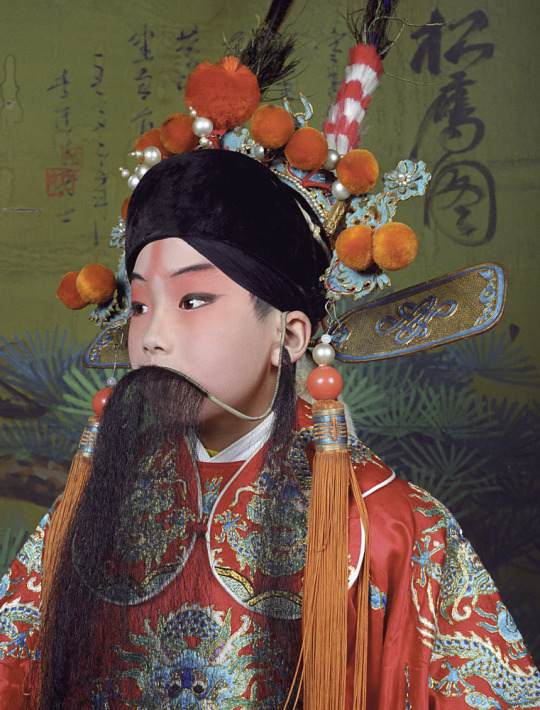
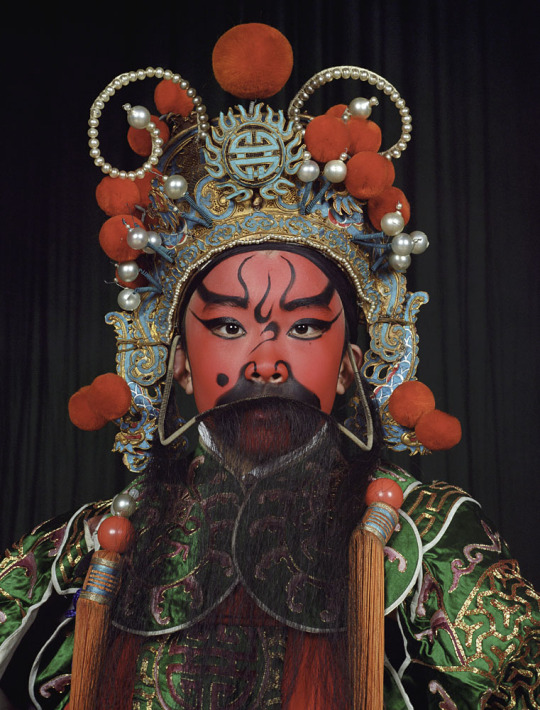
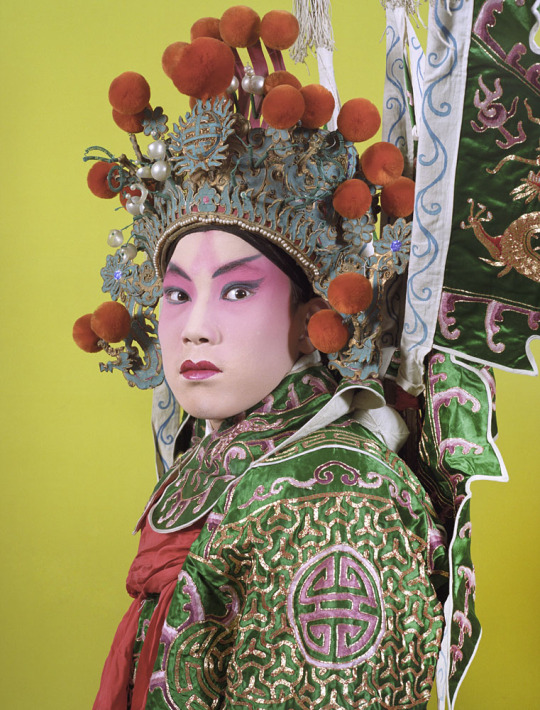
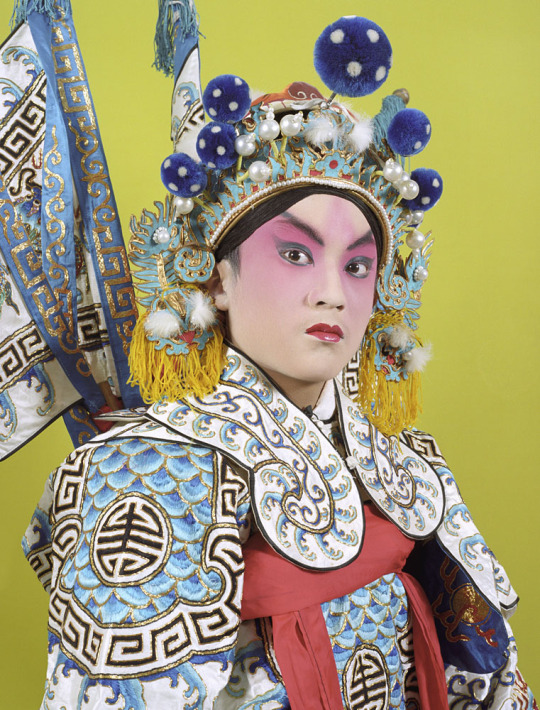
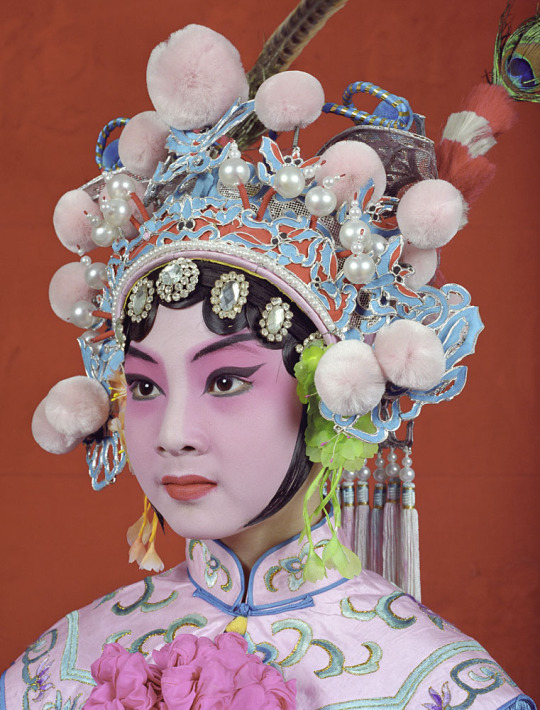
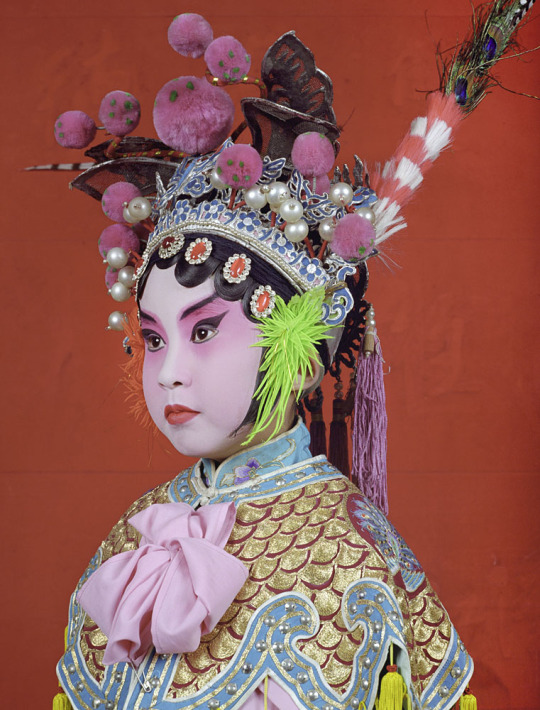
Rongqiu isn't used just for Chinese opera performances - it's a very common decorative item for Chinese headwear, especially for traditional/folk performances.
Below - examples of rongqiu use in folk custom/performance costumes, left to right: 1) 游神/youshen (wandering gods) procession in Fujian (x), 2) 英歌舞/yingge wu (yingge dance) performer in Guangdong (x), 3) & 4) 高跷/gaoqiao (stilt walking) performers in a 社火/shehuo parade in Gansu (x):

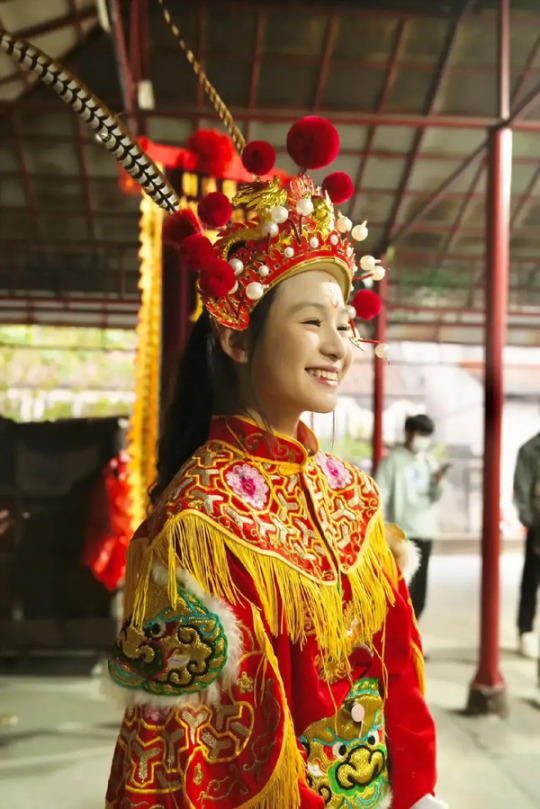

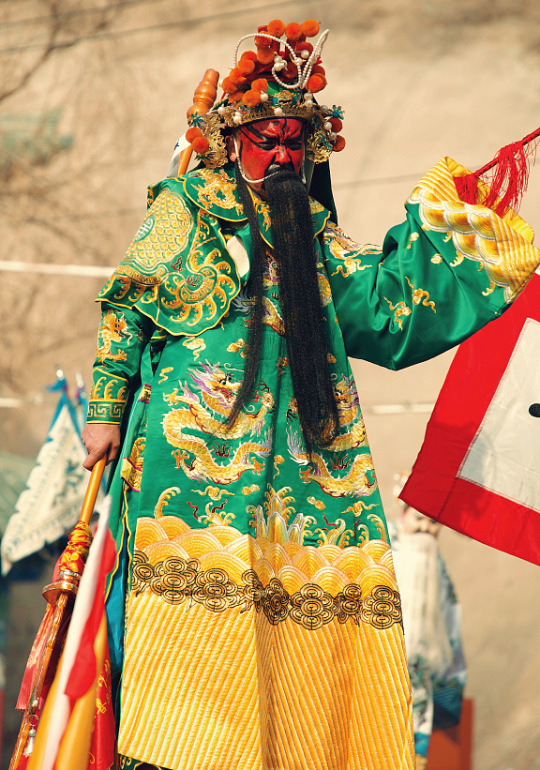
As a festive decoration, rongqiu was also widely used on bridal guan (crowns) from the Qing dynasty into the modern day.
Below - examples of rongqiu use in historical bridal guan: Left - a bride during the late Qing dynasty, circa 1890 (x); Right - a bride during the Republican era/minguo, in 1939 (x):
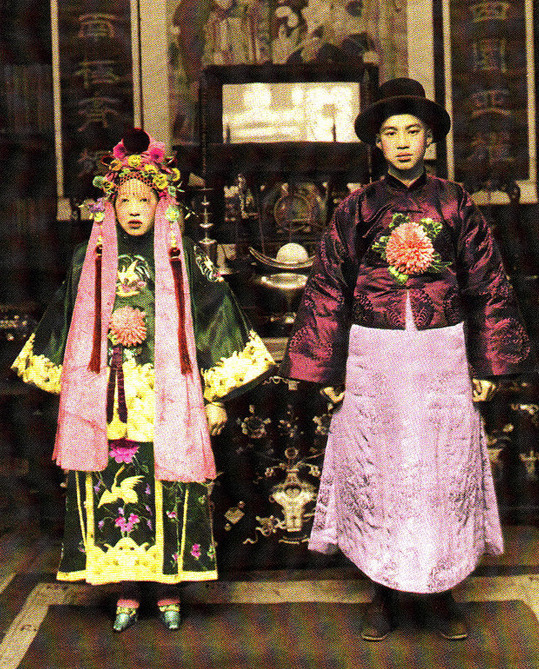
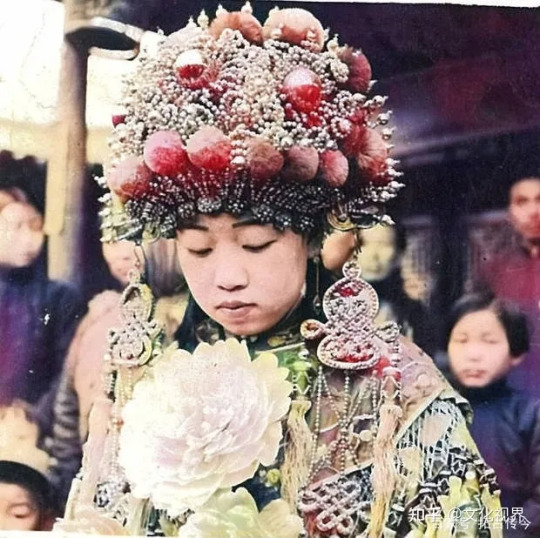
For some reason it's been extremely difficult to find sources on the origin of rongqiu that would shed more light on its significance, but based on historical paintings the use of rongqiu as a head ornament may have originated in the Qing dynasty. During the late Qing dynasty, it was fashionable among women to wear rongqiu on the sides of their hair, as can be seen in the paintings below (x):

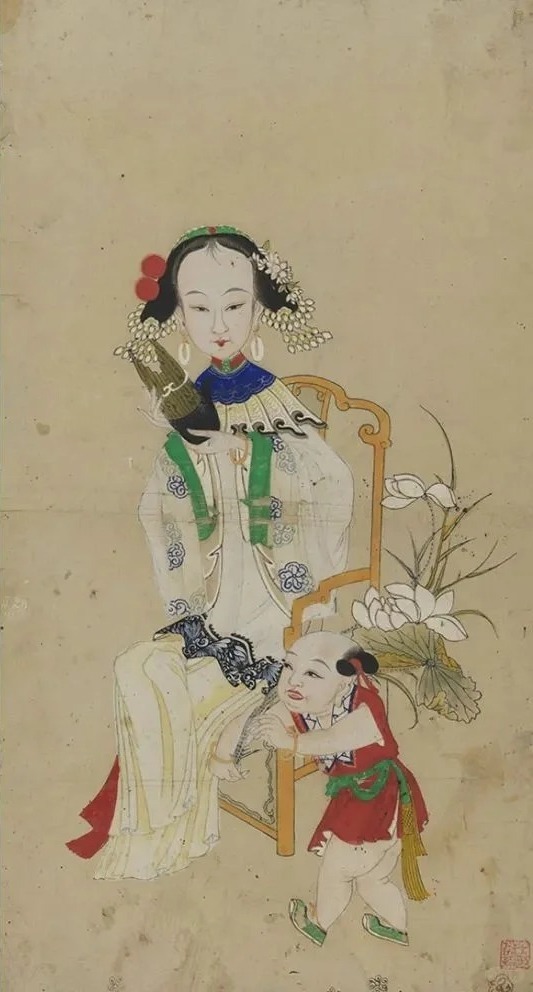
This particular style of rongqiu hair ornament was depicted in the 2012 historical cdrama 娘心计/Mother's Scheme:
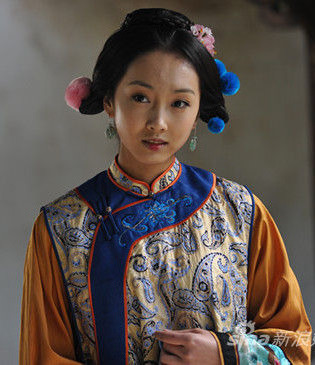
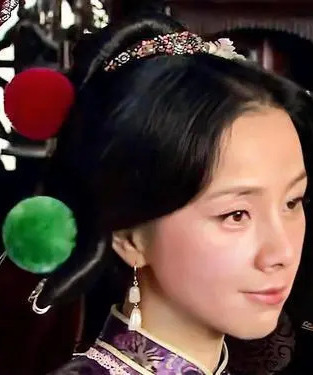
For more references, please see my rongqiu and kuitou tags.
If anyone has more information on the significance of rongqiu, please do share!
Hope this helps ^^
#rongqiu#pompoms#kuitou#chinese opera#opera costume#xifu#hanfu#history#reference#ask#reply#junpeicindystories#chinese fashion#chinese clothing#china
588 notes
·
View notes
Text
Some Chinese fashion styles
Disclaimer: The following styles and their definitions were observed by me and are not authoritative. I am only familiar with Hanfu and if I made mistakes and picked the wrong photo examples or fraud shops, please let me know. Also, this post focused on women's fashion because 1. I am not into men's fashion so I don't know much about them. 2. The algorithm also knew that so I don't really see them.
汉服/Hànfú
传统服饰/Chuántǒng fúshì (传服/chuán fú)
清汉女/Qīng hàn nǚ
旗装/Qí zhuāng
旗袍/Qípáo
新国风/Xīn guó fēng、新中式/Xīn zhōngshì 汉元素/hàn yuánsù 茶艺服/Cháyì fú or 茶服/chá fú 唐装/Tángzhuāng 中山装/Zhōngshānzhuāng.
汉服/Hànfú
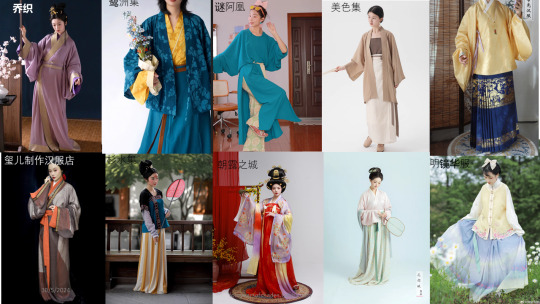
The ethnic clothing of Han Chinese (not the Han Dynasty).
There was a prohibition of Han clothing and hair styles in Qing dynasty, i.e. the 剃发易服/Tìfā yìfú qu Queue Ordinance, so modern hanfu is an on-going revivalist moment.
Modern hanfu are based on archeological evidences with minor twists to suit modern like, such as the type of fabric used and cut.
As a result, there are many types of garments and sub-styles. The figure above shows some examples.
While which style should be included and promoted is a constant debate, but in general, the cutout line is the Qing dynasty (however small accessories such as purses are alright).
传统服饰/Chuántǒng fúshì (传服/chuán fú)
No example because I am not sure who identified with this label.
The Chinese traditional clothing.
This either referred to historical clothing restorers (regardless of ethnicity) or people who promoted that the traditional clothing of Han people should be in the late Ming dynasty style, since "people should get up at where they had fallen".
They might be agreeable with the hanfu movement or not.
清汉女/Qīng hàn nǚ
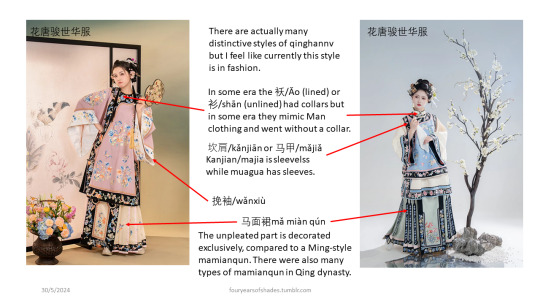
The clothing of women of Han Chinese in the Qing dynasty.
Since the Queue Ordinance wasn't that strictly enforced on Han women, the Han women clothing in the Qing dynasty had quickly absorbed Manchurian's elements while retaining the characteristic two-piece silhouette. (Manchurian women wore a one-piece robe.)
I believed it appeared around 2019 when the styles of hanfu had moved to fully embroidered surface to a more tone down brocade or weaved patterns.
旗装/Qí zhuāng
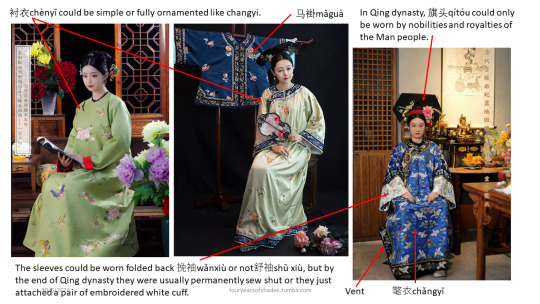
The ethnic clothing of Man people (Manchurian).
The women's clothing are generally in round collar opened on the left (youren) with straight sleeves.
The most basic item is a 衬衣/chènyī, which doesn't have vents.
However, the most common item I have seen on the street is a 氅衣/chǎng yī (probably rented), which should be worn on top of 衬衣, since they have side vents.
They usually have no standing-up collar but in some cases a fake collar could be worn.
On top of changyi they could wear a 马褂/mǎguà、坎肩/kǎnjiān、褂裥/guà jiǎn.
旗袍/Qípáo
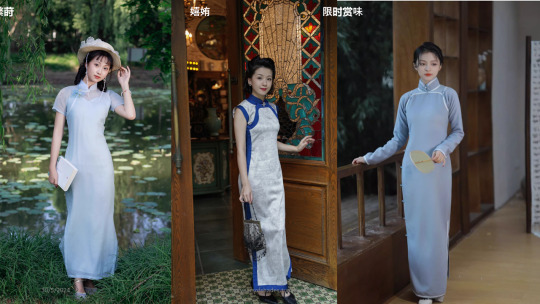
The Chinese clothing of women originated from the Minguo era, known in English as qipao or cheongsam.
The male equivalent is 长衫/chángshān.
Currently in style is the retro-cut, while uses the traditional flat cut (no shoulder seam) instead of the more body-hugging modern draping style.
There are also many variations and cuts, but the overall silhouette is similar.
新国风/Xīn guó fēng、新中式/xīn zhōngshì
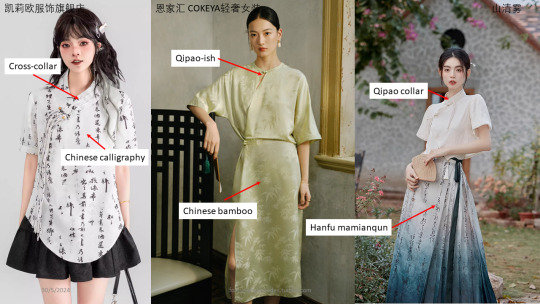
Innovative clothing that was inspired by Chinese traditional aesthetic.
It is an umbrella term.
汉元素/hàn yuánsù refers to clothing inspired by hanfu specifically, while xinguofeng could be inspired by qipao and other ethnic clothing. In addition, hanyuansu is a term more familair to hanfu-ers, so the target audience is slightly different between hanyuansu and xinguofeng.

茶艺服/Cháyì fú or 茶服/chá fú,i.e tea dress, which aimed to convey a zen and rustic aesthetic could also be considered a sub-style. They are often worn by retirees, artists or workers in tea shops, calligraphy shops, Chinese spas, Chinese traditional medicine clinics etc.
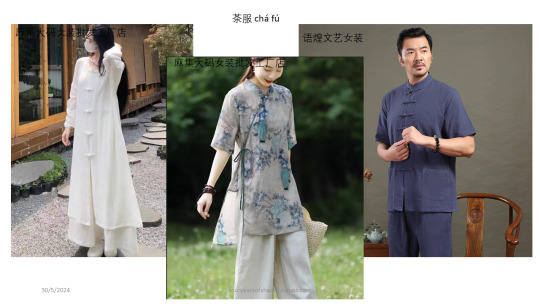
The older "Chinese style" generally refers to 唐装/Tángzhuāng and 中山装/Zhōngshānzhuāng.
Tangzhuang (Tang Suit) was a men suit characterized with a mandarin collar with a row of 盘扣/pán kòu frogs in the middle. There are two pockets at the bottom front of the suit. It was a well-known looked worldwide due to the 2001 APEC summit. However, other clothes resembled a 马褂/mǎguà could also be called a tangzhuang.
Zhongshanzhuang was designed and named after Sun Yat-sen but was often known in English as the Mao Suit. Mao Suit was characterised with a 关门领/Guānmén lǐng(“closed-door collar", but also known as Mao collar in English) with a row of round buttons. There are four pockets at the front of the suit.
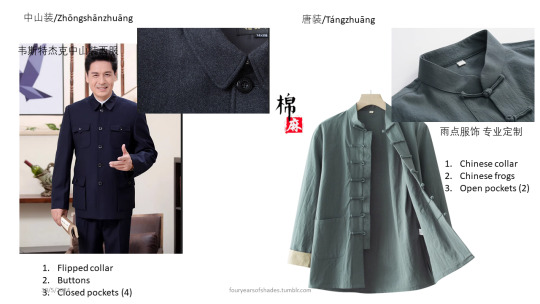
中华lolita/Zhōnghuá lolita
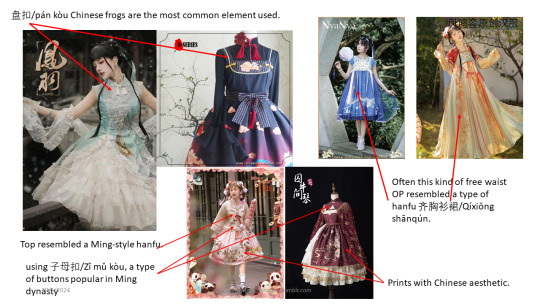
A sub-style of the lolita fashion inspired by cheongsam/qipao, hanfu or other Chinese artistic elements.
The same item could appeared in different styles, but with different cut and accessories. The following examples showed a mamianqun used in different styles.
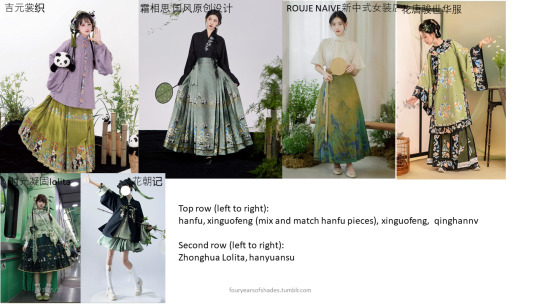
THE END
#chinese fashion#hanfu#qinghannv#qipao#qizhuang#chinese language#non-hanfu#lolita fashion#terminology#i rarely seen men in alternate fashion#like i saw maybe one in the last year#they spent money elsewhere#like shoes#long post#reference#fouryearsofshades#i spent so much time on this post#hope you will like it#feel free to correct me if i am not right
633 notes
·
View notes
Text
Hanfu in Components: Hanfu Anatomy, Skirts & Pants (pt 3.2)
navigation: hanfu in components 1 2 3.1 3.2 ...
More anatomy terminology things as promised :0000 There are lots of different kinds of skirts and pants, but in general they all wrap around your waist or chest and are secured by some kind of tie. They're usually much simpler than the tops.
裙頭/裙头/QUN2 TOU2/SKIRT HEAD


Same thing as waistband, applies to pants and skirt. We call it a “head” because it’s at the top of the garment and the body of it follows. This can vary in width depending on whether you’re looking at a standard waist-high skirt or a 訶子裙/诃子裙/he1 zi0 qun2/Hezi style skirt-dress, which has a very wide skirt head that looks more like the bodice of a strapless dress.


The horizontal length is usually made to be approximately 1.5x the waist measurement of the wearer to allow for ample overlap when wrapped around the waist. Might be called 褲頭/裤头/ku4 tou2/pants head for pants or 腰頭/腰头/yao1 tou2/waist head in general.
���帶/系带/XI4 DAI4/RIBBON
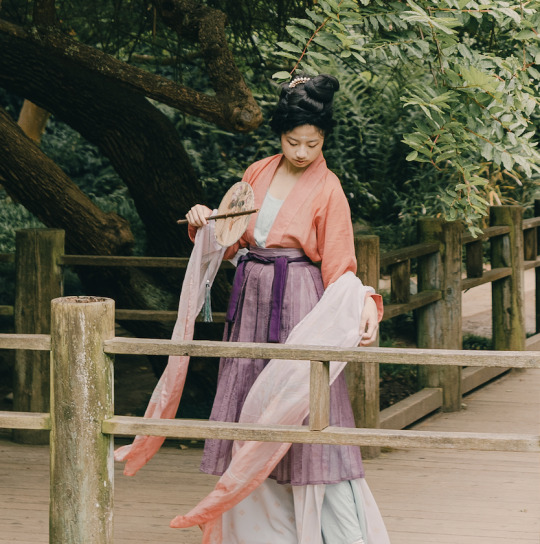
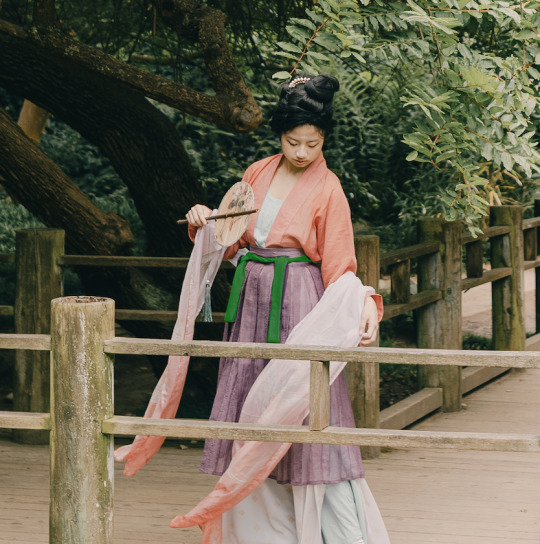
Usually translated as a ribbon or tie, two long ribbons each attached on one end of the skirt head so that you can secure the garment around your body. Some styles will also have one long ribbon come separately from the skirt itself and instead attach loops on either side of the skirt head that the ribbon goes through, but this style is less common nowadays. Some styles will also have four small ties rather than two large ones.
孔/KONG3/HOLE


A slot made in the skirt head to pass the tie/ribbon that’s stuck on the inside through to the outside. This is a modification from the traditional cut of hanfu, but it has become so ubiquitous that it’s practically the standard now.
肩带/JIAN1 DAI4/SHOULDER STRAPS


Applies to 齊胸/齐胸/qi2 xiong1/chest-high skirts. Shoulder straps can be sewn on or removable and attached via a hook and loop.
擺/摆/BAI3/‘SWING’


Can refer to different things based on context. 下擺 Refers to the bottom hemline of the garment, with 下 meaning down/bottom. 擺 alone literally means ‘swing’ or ‘swish.’ When used alone or combined with 裙 for 裙擺, it’s referring to how much fabric has been used in the body of the skirt, measured by the stretched-out unpleated total length of the hemline. The lightest skirts have a 3-meter bai, with 4.5m and 6m also being standard.
褶/ZHE2,3/PLEAT
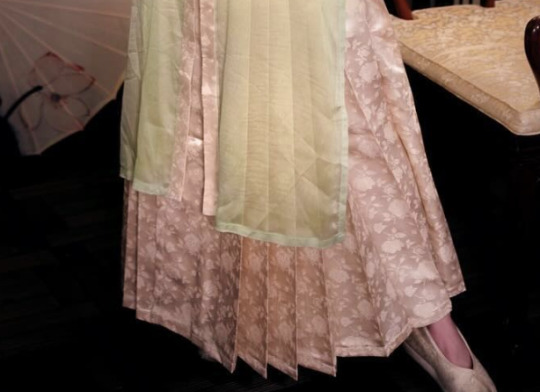
Fold or pleat. Almost all hanfu skirts have either 順褶/顺褶/shun4 zhe2,3/knife pleats or 工字褶/gong1 zi4 zhe2,3/box pleats. Sometimes also written as 折, which is pronounced the same way meaning 'fold,' but usually this refers to a crease in paper or the action of folding something rather than a pleat. Pronunciation caveat: zhe2 is standard in Taiwan, zhe3 is standard in China.
裙門/裙门/QUN2 MEN2/SKIRT DOOR


Applies to Ming Dynasty 馬面裙/马面裙/ma3 mian4 qun2/horse-faced skirt. Smooth unpleated face of a skirt. Similar to the 光面 of Song Dynasty baidiequn.
光面/GUANG1 MIAN4/EMPTY FACE


Applies to Song Dynasty 百迭裙/bai3 die2 qun2/hundred-layer skirt. Smooth unpleated face of a skirt. Apologies for the bad picture, this one is made of linen and the boundaries between the pleats are lowkey really hard to see x-x
破/PO4/PANEL

Applies to 破裙/po4 qun2/‘broken skirt.’ 破 means broken, colloquially; when referring to the 破 of a skirt you are referring to one of the trapezoidal or rectangular panels of the skirt.
襠/裆/DANG1/CROTCH


Crotch area of pants. Pants can usually be classified as either 開襠/开裆/kai1 dang1/open-crotch or 合襠/合裆/he2 dang1/closed-crotch.
navigation: hanfu in components 1 2 3.1 3.2 ...
#hanfu#hanyuansu#chinese fashion#chinese hanfu#chinese history#hanfu fashion#hanfu photoshoot#chinese#terminology#reference#long post#cloud9hanfu#cloud9 hanfu#九雲閣#hanfu in components
126 notes
·
View notes
Text
I need help picking wedding outfits for Miaoqi for my fic.
Since this is post-canon Miaoqi it would be your modern dress and suit, but I don't want it to be boring.
There is apparently a common joke in China about the dream of getting married in Vera Wang, so I've looked for Vera Wang, but I wonder if her style may be a bit too simple? Not that I think Miaomiao would choose something overly extravagant and frumpy, but I'd like at least some detail. I personally favor ball gown style wedding dresses, but I'm not the one getting married here so if you come across something else that screams Miaomiao let me know.
Any ideas? For Ziqi as well! He deserves better than the most boring black tuxedo on earth.
Feel free to drop some of your faves or just some general ideas! The fic is going to have art, so I need something specific in mind.
#for some reason i do think they would go modern instead of doing the hanfu revival you see in some weddings#of course miaomiao might change for the reception but#this is going to be my second sketch commission for the fic so I do need specific references or at least something close to it#love game in eastern fantasy
36 notes
·
View notes